Content Writing Tips for Beginners: A Step-by-Step Guide

| Listen to audio podcast |

Everyone has to start somewhere. With content writing, the place to start is with writing. While many content writers go to school for English or Marketing, or even a Writing-specific degree, it's certainly not necessary. There are plenty of successful content writers out there who have never had a day of writing-focused education, and many whose first language isn't English besides.
It's possible to be a successful content writer without training and certification, but it requires one thing: experience.
I consider myself a fairly proficient content writer, though I don't know that I'm among the best of the best. I'm knowledgable enough to distill some tips for you, though, and I can help you become a better content writer. Here are my tips!

30 Second Summary
To become a successful content writer, you don't need formal training. You must gain experience and constantly improve your skills. Key recommendations include: regularly read to learn and stay updated; know what and why you want to write; practice writing frequently; maintain consistency in tone, voice, and perspective; balance use of keywords for SEO; add formatting for readability; strive to outperform competition; use relevant tools; proofread your content; and develop a unique style.
Read, Read, Read
You aren't alone. You aren't writing in a vacuum. Every writer, and indeed virtually every creator of any kind of content, will tell you that the number one thing they do to keep themselves going is consuming media. Authors read. Video producers watch movies, TV, web videos, and streams. Illustrators take the time to consume art.
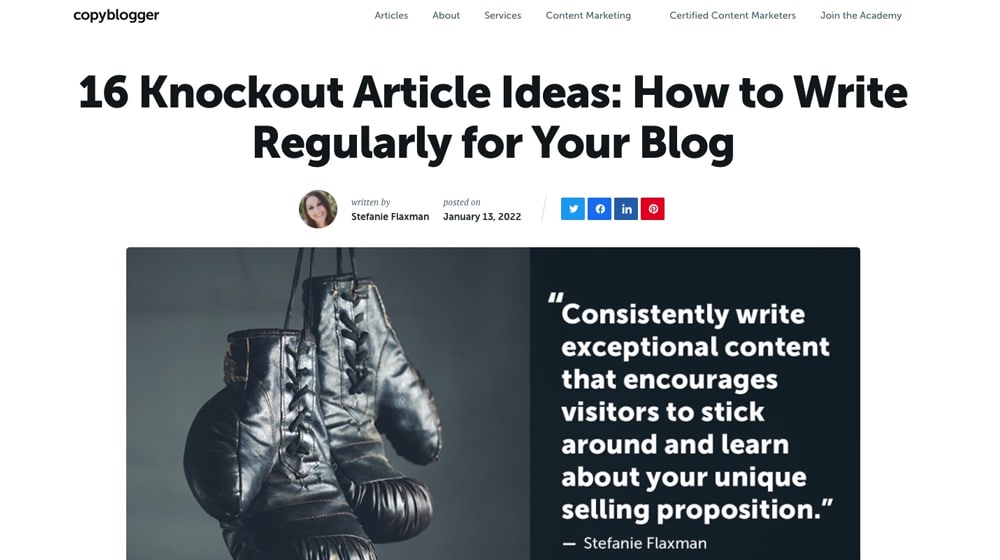
It's important to read with a critical eye, but also to read for pleasure. Read because you're interested in the topic, and read with an eye for the intricacies of writing. What perspective does the writer use? What tone have they adopted? How long are their sentences, their paragraphs, their sections, and their posts? How natural is their language? You can learn a lot just from reading.
Here are some key reasons why reading other content is essential for writing your blog posts:
- Inspiration: Reading other blog posts can inspire you by providing new ideas or perspectives on a subject; this can spark your creativity and help you think about how to approach your blog in a unique and engaging way. Inspiration doesn't have to originate from the content you read; I've thought of specific questions and topics after reading something that has nothing to do with the article I'm reading, and I wrote a blog post about it!
- Knowledge and expertise: Reading content from other sources helps you stay informed about your niche or industry. This knowledge can be invaluable in developing well-researched and credible blog posts. It also helps you better understand and address your target audience's needs and concerns. Trust me; writing confidently about a topic is challenging when you don't have much expertise. Reading content by other experts can speed up this process.
- Identify trends: By reading content from various sources, you can identify emerging trends and topics gaining traction in your niche; this enables you to write timely and relevant blog posts that cater to your audience's interests.
- Improve writing skills: Reading high-quality content exposes you to various writing styles, techniques, and structures; this can help you improve your writing by adopting effective strategies, refining your voice, and learning new ways to communicate your ideas.
- Understand audience preferences: By analyzing the types of content popular among your target audience, you can tailor your blog posts to meet their preferences; this can help increase engagement, readership, and overall satisfaction with your content.
- Learn from successful bloggers: Observing the practices of successful bloggers can help you identify what works and what doesn't; this can help you avoid common pitfalls .
Reading also gives you useful insights you can use in your own writing later. You accumulate facts, which you can pull out and use as citations later. You learn clever wordplay, new words you can use to spice up your own writing, and terminology common amongst professionals in your industry. You gain insight. So: read!
Know What You Want to Write
Depending on why you want to write, you may already have a goal in mind. I generally see people in a few categories.
- The people who want to start a blog because it's a way to make money, but have no guidance or goal in mind.
- The people who have a passion for a topic, and want to start a blog to turn that passion into something more.
- The people who have the ability or talent for writing (and have been told as much through their schooling years) and figure they might as well make a career out of it.
The first group is difficult because they have to spend time developing a niche, a topic, an interest that interests them. Choosing what to make a site about is very difficult, and it's even more difficult when you have to learn every aspect of the craft along the way.
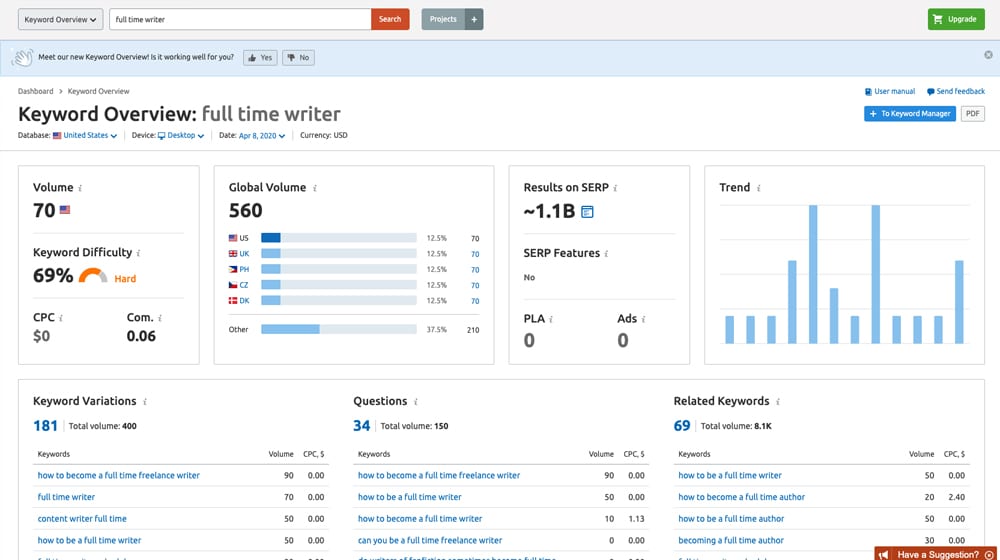
The second group is people who already know their stuff and just might need help putting their thoughts into writing. This is the kind of group most of my article here is aimed at, but everyone can get some use out of it.
The third group doesn't generally need help with the technical aspects of writing, but transitioning from the stuffy world of academic writing to the free-flowing world of content writing can be a shift that not everyone is equipped to deal with.
In any case, you need to know in a broad sense what you want to write about for your site, and in a narrow sense what you want to write about for a given article. I often start with some keyword research to develop a topic idea , write a killer title for that topic , and then create my outline for the article based on those search phrases and that topic.
It's worked well enough for me so far - writing articles that match real searches and catering to those searches is a great roadmap to getting your articles found.
Write, Write, Write
Believe it or not, I didn't start out writing great content. I spent years writing some pretty mediocre content , and I only stood out because a lot of the people also writing content in the same arena were so, so much worse. Like, you'd be surprised just how bad some of the people out there writing content are. Go to Textbroker and spend a few bucks on some 3-star articles and you'll see what I mean. Content mills are generally a wasteland.
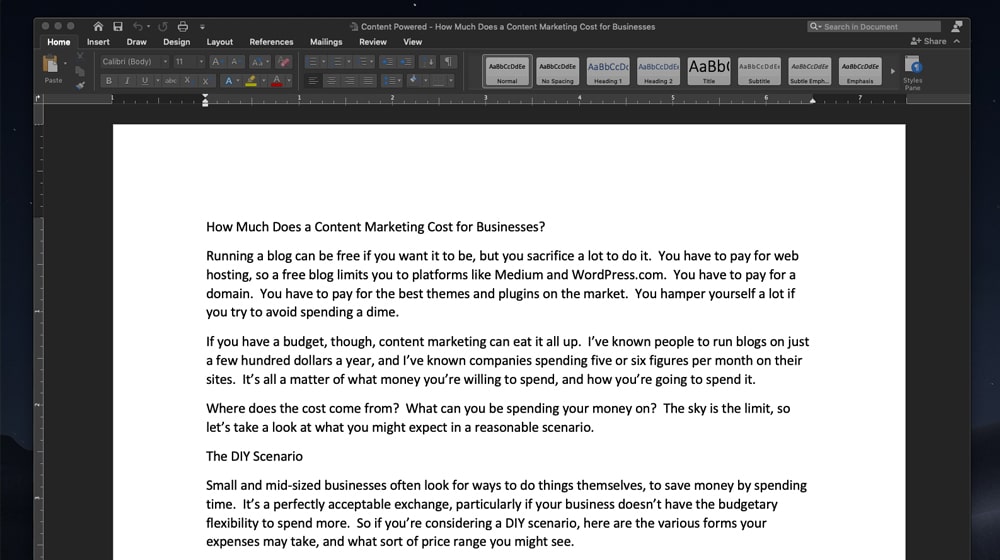
Part of successful content writing is just practice . The more time you spend writing, the more familiar you'll be with the process. The more details you'll be able to stick in your mind as you write. The better you'll be able to formulate posts as you go along. A post that might have taken me two or three hours to write a few years ago, I could write better in less time today.
Writing a lot and writing consistently is often cited as a key factor for blogging success. I'm not sure it's 100% necessary from a marketing standpoint, but I can tell you that it's extremely beneficial from a technical standpoint.
They say that practice makes perfect, and while there's no such thing as perfect, practice is always important.
Keep Tone, Voice, and Perspective Consistent
One thing I often see novice writers struggling with is perspective, tense, tone, voice , and all of those other subtle technical elements of grammar that come naturally with practice.
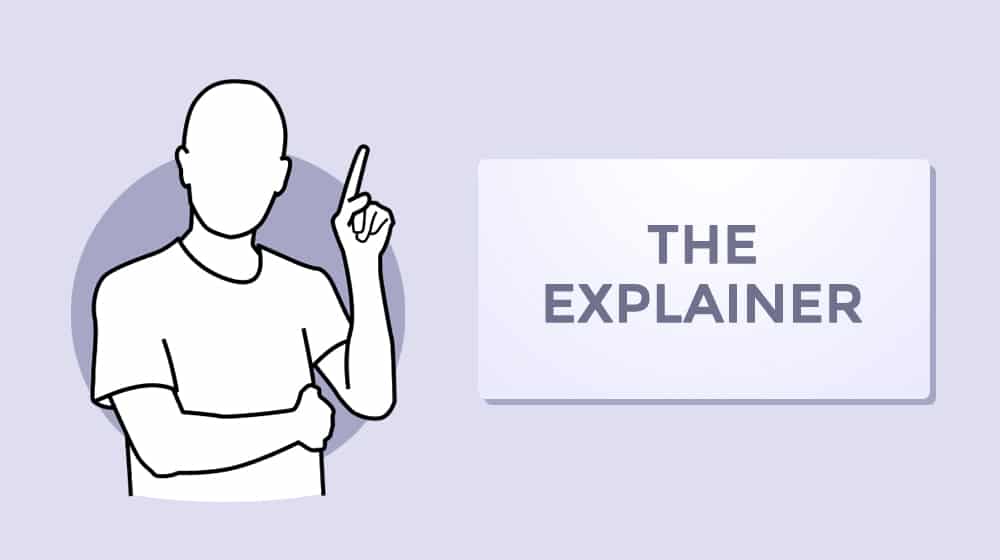
Here are some examples:
- Shifting between "I", "We", and "The Company" as self-referential signifiers. Know who you're representing when you write. If I write something for a client, I'll use a different voice than when I write something for myself.
- Shifting between the personal and the impersonal, as in going from "we recommend X" to "X is generally recommended." There's a time for different levels of formality; know which one you want to use.
- Referencing industry terms incorrectly. I see this a lot with freelancers who have to write for multiple industries; using terminology incorrectly makes people who know what they're talking about recognizing that you don't.
It doesn't really matter which perspective, which tone, which voice you use. What matters is that you keep it consistent throughout any piece you write.
Care About Keywords
A huge part of successful content writing online is caring about keywords . Keyword research is the core of every good blog post, most paid advertising, and a whole lot else besides. That's just how powerful Google is these days.
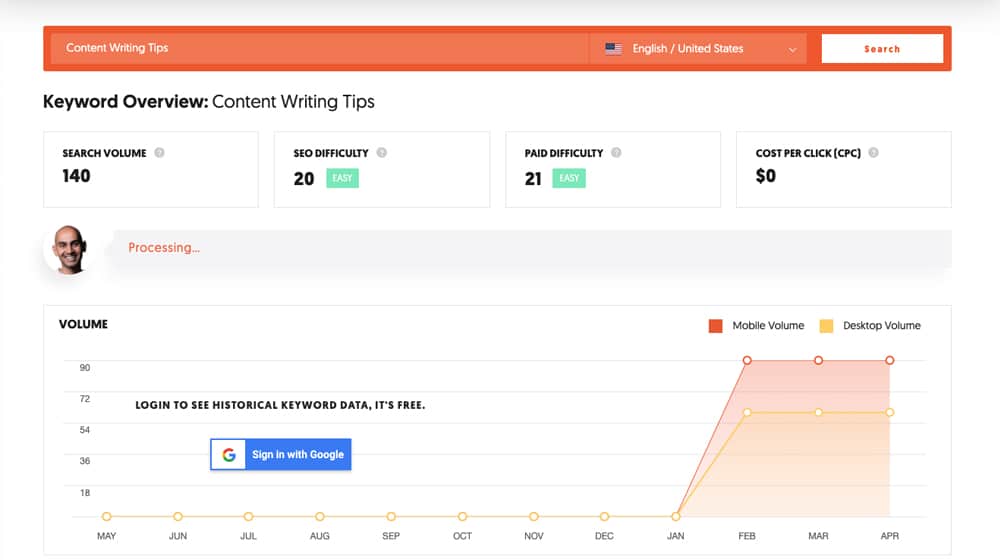
I'm not going to go extremely deep into keyword research here. It's a very detailed topic, and there are a lot of great guides out there already written to help people of all skill levels get started.
Suffice it to say that, in my mind and in my experience, keyword research is an essential part of good content writing. Knowing how Google interacts with keywords, how to use keywords appropriately, and how to write around awkward keywords is essential.
Don't Care Too Much About Keywords
Look, I know what I just said, and I know what I'm saying now.
The fact is, keywords are a lot less important than they were five or ten years ago. Back then, you needed to figure out exact, specific keywords and write posts with specific levels of keyword density to make sure your content thrived. Pick the wrong keyword and your content never shows up for high volume web searches . Use the keyword too little and Google doesn't think the post is relevant. Use it too often and you get dinged for keyword stuffing. It's a fine line to walk.
We create blog content that converts - not just for ourselves, but for our clients, too.
We pick blog topics like hedge funds pick stocks. Then, we create articles that are 10x better to earn the top spot.
Content marketing has two ingredients - content and marketing. We've earned our black belts in both.
At least, it was. Then Google introduced a bunch of machine learning and semantic indexing features to their index. These days, Google will show you search results that don't even include a phrase you used when searching but are still relevant. They understand things like synonyms, variations on keywords, and so on.
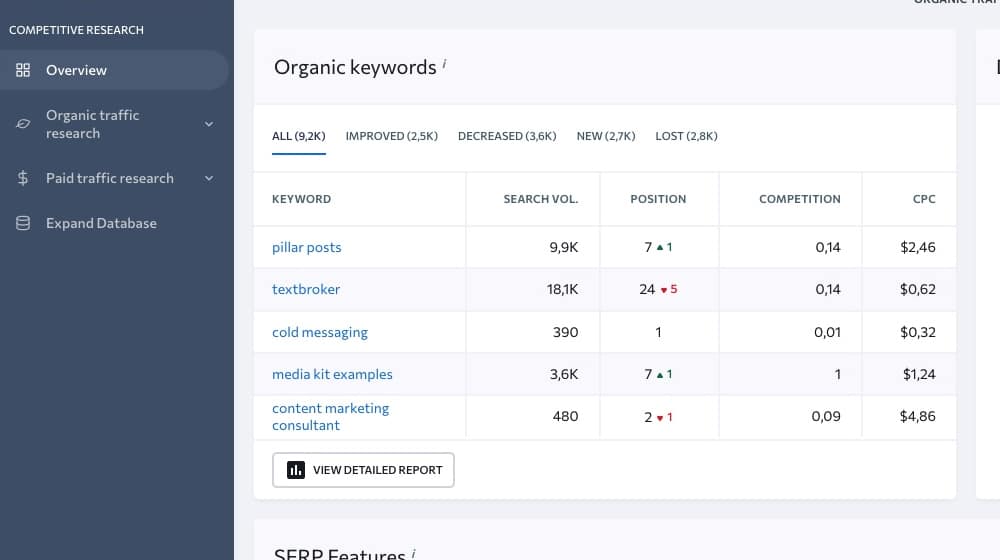
That's why these days, I don't worry too much about specific keyword usage - at least, not within the context of my articles . I use keyword research to guide the topics I choose to write about, and I might sprinkle in a specific keyword here and there when I find a way to work it in, but I'm not going to double over backward to include specific long-tail keywords in every post I write. Over-optimizing your posts like that can have the opposite effect:
"The idea is basically to try and level the playing ground a little bit. All of those people who have sort of been doing, for lack of a better word, 'over-optimization' or 'overly' doing their SEO, compared to the people who are just making great content and trying to make a fantastic site, we want to sort of make that playing field a little bit more level."
Heck, here's an example. This blog post uses "start content writing online" as its primary keyword. You can tell this because they use the phrase a couple of times throughout the piece when it's awkward to type the whole thing. You can also tell it because it's in a different font than the rest of their content, though I'm not sure that's intentional. Just… don't be that awkward and obvious about it, right?
When In Doubt, Add More Formatting
One key insight that most content writers have at some point is that web readers don't actually read the content. You might notice this behavior in yourself, or you might have it pointed out to you by a marketer, but it's pretty true. People who see posts on social media, half the time they don't even click through, they just read the title and the snippet and make assumptions based on that.
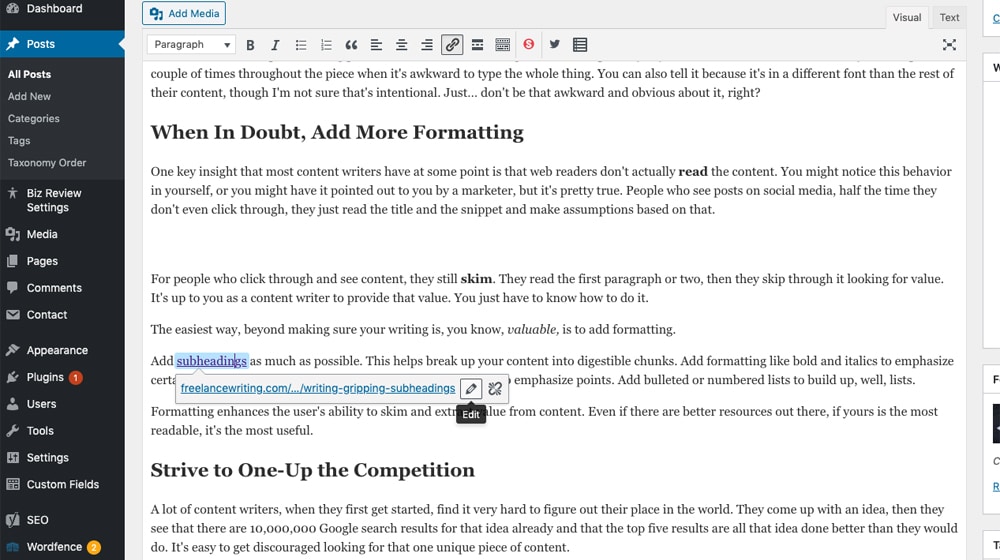
For people who click through and see content, they still skim . They read the first paragraph or two, then they skip through it looking for value. It's up to you as a content writer to provide that value. You just have to know how to do it.
The easiest way, beyond making sure your writing is, you know, valuable, is to add formatting.
Add subheadings as much as possible. This helps break up your content into digestible chunks. Add formatting like bold and italics to emphasize certain points. Add gaps in between paragraphs and sentences to emphasize points. Add bulleted or numbered lists to build up, well, lists.
Formatting enhances the user's ability to skim and extract value from content. Even if there are better resources out there, if yours is the most readable, it's the most useful.
Strive to One-Up the Competition
A lot of content writers, when they first get started, find it very hard to figure out their place in the world. They come up with an idea, then they see that there are 10,000,000 Google search results for that idea already and that the top five results are all that idea done better than they would do. It's easy to get discouraged looking for that one unique piece of content.
I'm here to tell you that you don't need to be unique to be valuable. This article you're reading right now? Dozens of other people have written other articles on the same topic, some of the same points, and some with other tips and hints as well:
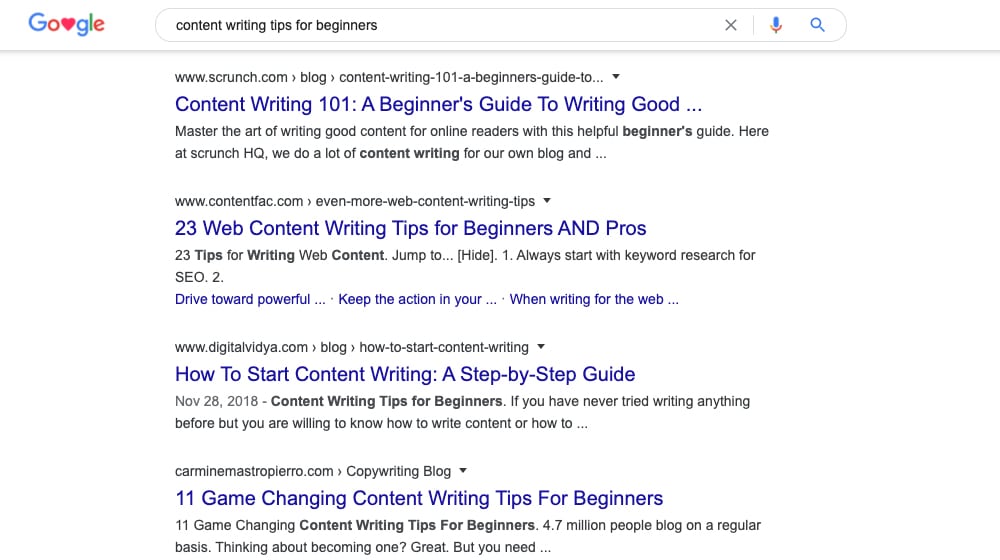
Here's what you do. You find something that already exists, and you do it better.
There are three main ways you can out-do existing content .
- Take content that is broad but shallow, and add depth to it. This involves more research, more data sources, and more critical thinking to find conclusions the data leads you to.
- Take content that is narrow but deep, and add breadth to it. A deep dive into one subject in one industry is narrow, but it's an opportunity to tie another related subject or another industry into it.
- Take content that is old and make it up to date . A lot of old content these days is kept up to date by the initial author, but if it's left abandoned, you can try to supersede it by writing the same basic content with newer information.
Keep in mind that when I say "do what they do" and "you don't have to be unique", I absolutely do NOT mean you can just copy their content. You still have to write unique and original content, but you can cover the same topics and similar points.
Don't Be Afraid of Tools
I've known a lot of writers over the years who pride themselves on their precise knowledge of technical grammar, and who end up focusing more on their grammatical accuracy than on the quality of their content.
To me, this is hilarious. You're priding yourself on a skill that is easily replaced by a free online tool.
With the rising popularity of AI tools like ChatGPT , there are tons of content and blog writers that can help generate outlines, blog topics, and provide inspiration for your own writing.
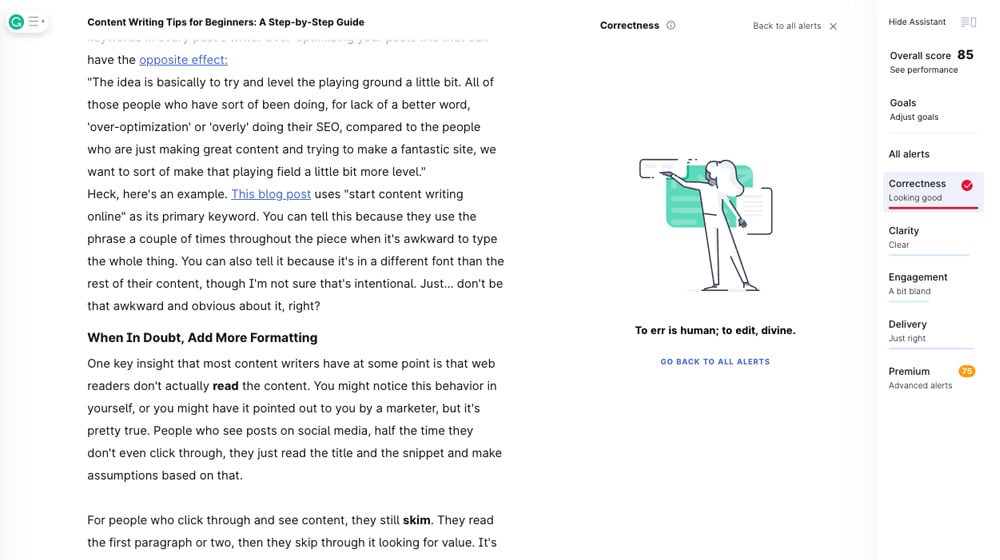
Don't be afraid to use the tools you have at your disposal. Use a spelling and grammar check. Crank up the settings in MS Word. Use keyword research and topic ideation tools.
Here are some of my favorite tools:
- Ahrefs. I wrote a good breakdown of Ahrefs and similar tools .
- Grammarly. Proofreading and grammar checking is super important. If you run a WordPress site, you can even embed Grammarly into your site automatically.
- Clearscope . Clearscope can help you find opportunities to improve your content. I use it to help me discover things that I may have missed, as well as easy opportunities to include relevant keywords. I wrote a guide comparing Clearscope and Marketmuse here .
- WordPress plugins. There are a lot out there; here are some of my favorites , as well as a seperate guide for PageSpeed plugin recommendations .
There are tons of tools out there to help you be a better content writer, and there's absolutely no shame in using them.
Finish With a Proofread
When you finish any given piece of writing, go through it with a fine-toothed comb looking for errors . I know I just told you that tools can do a lot of that for you, and that's true. I make a lot of typos and minor grammatical errors as I type, and you know what? I have a few different autocorrect rules in place to fix them for me. Until you develop your own library or process, make sure you're proofreading everything.
Now and then an error will slip through. That's fine. If you notice it, fix it. If someone else notices it, fix it. If no one notices it, it's not really going to do you any harm. Even still, it's important to get a proofread in on your content before you finalize it and publish it.
Develop a Style
Over time, as you write, you can develop a style . That style will develop naturally, as you find your voice. You find the way you like to express your ideas. The way you like to use lists and formatting. The perspective you use to cover various topics and make analogies. Your style is built up over the years and it comes about from experience.
Your style will also change over time. After you've been writing content for a year or two, if you go back and look at the early content you've written, it will read like something written by someone else entirely. Don't worry; an evolving style is perfectly fine. Developing a style that's unique to you is the important part.
Keep at it. Content writing is a long-term investment, and it's a skill that never stops improving. The more you keep going, the better you'll become.
James Parsons is the founder and CEO of Content Powered, a premier content marketing agency that leverages nearly two decades of his experience in content marketing to drive business growth. Renowned for founding and scaling multi-million dollar eCommerce businesses through strategic content marketing, James has become a trusted voice in the industry, sharing his insights in Search Engine Watch, Search Engine Journal, Forbes, Entrepreneur, Inc, and other leading publications. His background encompasses key roles across various agencies, contributing to the content strategies of major brands like eBay and Expedia. James's expertise spans SEO, conversion rate optimization, and effective content strategies, making him a pivotal figure in the industry.
Join Thousands of Marketers and Get Free Tips Weekly!

Related Posts

Content Writer vs SEO Content Writer: What's The Difference?

What Is Content Strategy? A Technical Guide with Practical Tips

A Step-by-Step Guide to Building a Blog Content Strategy
August 12, 2020 at 9:38 am
Hi James, this was super helpful! I've read a lot of guides besides yours and yours is the only one that left me with some takeaways that I can actually use. I didn't realize how important (and also un-important!) keywords were, and your Grammarly screenshot inspired me to try it out. I'll also be way more mindful of who has already written about a subject before I start writing, that's something I haven't really done before, at least, not in a detailed way. Thanks again!
August 12, 2020 at 11:20 pm
Hey Faeeza, thank you for the very kind words!
This post was aimed at beginners, if you're interested in reading more, we have a handful of other posts you might find useful/interesting in our "Blogging" category: https://www.contentpowered.com/blog/category/blogging/
Topic ideation and competition research are easily the two biggest overlooked things when it comes to beginners and blogging - master those two things and you'll be far ahead of the curve!
August 30, 2020 at 8:16 am
I have been using the inverted pyramid approach to my writing style as it’s more easier to write long form content with this tactic and I can easily formulate my subheadings.
August 30, 2020 at 5:33 pm
Hi Sonny, thanks for sharing with us! It's good to know what's working for others. I think the fundamentals of the inverted pyramid are sound, if the bulk of your content is legitimately useful and actionable information, then your content is already off to a good start.
October 05, 2020 at 8:32 am
Hi James, This helped me a great deal, just wanted to say thank you. You really know your stuff with blogging. I'll be reading your other articles too.
October 05, 2020 at 7:59 pm
Thanks for stopping by Nur and for the kind words!
January 08, 2021 at 12:04 am
Hi James Your post helped me a lot. Thank you for this amazing work. God bless you more.
January 08, 2021 at 9:08 pm
Hey Adila, you're very kind, thanks for that! Very happy it helped you.
March 07, 2021 at 9:45 pm
Hey,James. This is my first time going through an actual content writing beginner tips article, as I am thinking to start writing online. Thanks for giving me some valuable pointers which I will keep in mind when I find my interest. No, I will no be doing this,initially, for money (but money is required to sustain, right?) but to search where my interest lies. Baby steps!! Wish you good luck 🤞, from India.
March 12, 2021 at 12:44 pm
Hey Ipsa - thanks for hopping on live chat with me, and I'm very happy this helped you out!
Revenue certainly helps. Being able to hire people to help you grow your blog will amplify your results, and it's hard to do that without any cashflow.
That's what's so great about blogging - you can bootstrap it at first until you're up and running. If you can give your readers enough value, customers will usually follow. It's a great way to draw people into your orbit.
March 09, 2021 at 7:36 am
This is never an easy job! Besides putting in the actual work, you need to have passion, patience, and time otherwise you’ll give up. I remember back in the day that I was on the verge of dropping my blog completely, and I did pause for a bit. A few months later my traffic was skyrocketing, all organic traffic to my blog posts. That has made me a believer ever since. It just takes a while to start working, but once it does it goes HARD.
March 12, 2021 at 1:00 pm
Hey Matt, thanks for your comment!
This sounds similar to my story - my first blog was over 10 years ago for a free flash game site. It had ads on it and was making a few hundred bucks a week, so I started reinvesting that into the content. I probably did a dozen or so blog posts, waited a month, then gave up.
A year or so later, they were the highest traffic pages on my site and were generating the lion's share of my AdSense revenue. I sold the site shortly after, but I think that's what made me a believer in blogging as well. It does require a good deal of patience and putting love into your content, not rushing it or skimping out. Man, Google's algorithm has really changed a lot since then, as has WordPress.
What brings you here today, just brushing up on the basics? 🙂
May 19, 2021 at 3:32 am
This is a great post. I appreciate your skills. Thanks for sharing.
May 19, 2021 at 11:35 am
Thanks Frisco! I appreciate it, glad it helped you.
May 24, 2021 at 10:38 am
Hi James! Your article is superb. I love it. It helped me a lot.
May 24, 2021 at 1:28 pm
Hey Fatima, really appreciate it! I'm happy it helped you 🙂
November 28, 2021 at 2:58 am
Hi james, thank you so much. The article has really helped me alot
November 29, 2021 at 1:58 pm
Love to hear it! Thanks, Brenda!
June 04, 2021 at 9:16 am
Hi James, i just started learning how to write articles. But it is not an easy task. Your article is good and gave some nice information.
June 04, 2021 at 2:34 pm
Hey Pankaj!
I really appreciate that, thanks for taking the time to say that. It makes writing these worth it.
Keep it up, if there's anything I can do to help point you in the right direction, please let me know!
June 06, 2021 at 5:18 am
Thank you so much! You've actually encouraged me to give content writing a try. This is really helpful.
June 07, 2021 at 10:32 am
Hey Ginnie! That was my goal, so I'm very happy to hear that. Thanks for stopping by and good luck!
July 07, 2021 at 7:58 am
Hi James, Thank you so much. It very helpful. I am very interested in content writing but the area that I have passion in is what I can't figure out, I think will give a try. Thanks
July 08, 2021 at 2:12 pm
Thanks Peter! Good luck 🙂
July 12, 2021 at 8:19 am
Hey Mr James, Nice article especially for beginners like me... Hope to hear more from you.
July 12, 2021 at 4:29 pm
Hey Ezekiel, thanks for the kind words and for stopping by! I hope it convinced you to start a blog of your own 🙂
July 29, 2021 at 7:04 am
Awesome post, simple and informative. I liked this line,
“Keep Tone, Voice, and Perspective Consistent”.
Super important to succeed in this, if articles are boring to read it's hard for anyone to be fulfilled.
But it was nice to read this. Thanks for writing this useful content.
July 31, 2021 at 4:33 pm
Thanks for the comment, Mohammad!
I couldn't agree more. Thank you for your words of encouragement.
January 30, 2022 at 6:48 pm
Super effective, practical, and easy to apply / follow article.
I love your simple yet powerful writing style. It seems you are taking a live class!
I recommended your link to at least 15 people. They are all so grateful! I, too, am fascinated.
You are a trustworthy, excellent content writer and mentor. Thanks from the heart.
January 31, 2022 at 2:02 pm
Thanks Ahmed!
Wow, that means a lot. Thank you for your heartfelt comment on my post, and I'm so happy it's helping to make a positive difference.
This is why I do what I do 🙂
March 13, 2022 at 10:29 am
Thanks, James. Your post was helpful and detailed. It helped to clear a lot of concepts for me.
March 15, 2022 at 6:39 pm
You're welcome, Suhail!
March 28, 2022 at 10:15 am
I'm really impressed and happy with these tips! You are a great mentor!
March 31, 2022 at 8:23 pm
Thanks Oluwasola! That's very kind of you to say.
April 07, 2022 at 7:55 am
waoh, this is very informative, guess I've found what I've been waiting for to become a content writer. Thanks a million James Parsons.
April 07, 2022 at 3:00 pm
Thanks, Ruth! Love to hear it.
August 25, 2022 at 6:34 am
Thanks, James. I'm just about to start content writing and your article was the first I have read. It really feels like I'm in it already, and I hope the tips grabbed would do me much help in my pursuit. Please, if you have more articles for a total beginner like me, I would appreciate it. Thanks many times🙏
September 01, 2022 at 2:08 pm
Thanks Olivia, love to hear it!
Here's are a couple of articles that I recommend next:
https://www.contentpowered.com/blog/blog-optimization-tips-seo/ https://www.contentpowered.com/blog/tips-beat-competitors-seo/
This is a great one too; small changes to your user experience are reflected across all of your pages and will help your site perform better overall: https://www.contentpowered.com/blog/improve-user-experience-website/
Feel free to reach out any time if you need pointing in the right direction 🙂
March 11, 2023 at 9:18 am
Amazing blog article!
March 11, 2023 at 12:13 pm
April 26, 2023 at 10:10 pm
Hey James, I retired from my job a couple of years back. Did try my hand at a couple of things. But always wondered what do I do with some exclusive work experience I gained during my employment. Then it struck me that I should start writing a blog and discuss various aspect of the commodity I worked on during my job. I saw many YouTube videos on how to write blogs and also read many online articles available on the net, as mentioned by you. Honestly, found your article to be very crisp and clear. I will surely follow your guidelines and start reading/researching/writing earnestly.
Thank you very much James.
April 29, 2023 at 11:47 pm
Absolutely. It's incredible what reach blog articles have on the internet, even on subjects that you wouldn't think would get much traction. In some cases, ESPECIALLY on subjects you think wouldn't get much traction.
My best advice is focus on having a great website and try to create content that is 10x better than anybody else. Do that, stick with it for years, and you'll be rewarded!
The reason most people's blogs fail is because they think they are creating great quality content, but aren't. Or, they don't stick with it long enough. Knowing that will help you succeed.
It's hard work, but it's rewarding and well worth it.
April 26, 2023 at 11:54 pm
Hey James! Thanks for the Guide. Which is better for blogs in your opinion?
April 29, 2023 at 11:45 pm
I'm a sucker for WordPress.
It doesn't get much better than WordPress for internal/external link management, optimization, SEO, custom development, automation, etc.
April 27, 2023 at 10:19 pm
Nice Article
April 29, 2023 at 11:43 pm
May 16, 2024 at 6:25 am
Hi James! Your content is top notch. I have learn't a lot through this site
May 23, 2024 at 12:55 pm
Thank you Chris, I appreciate it!
Leave a Reply Cancel reply
Name (required)
Email (will not be published) (required)
Your Comment
Let's Grow Your Business
Want some free consulting? Let’s hop on a call and talk about what we can do to help.
What is Content Writing? (Beginners Guide)
Content writing is an excellent career opportunity with plenty of opportunities to be creative, work with new people, and earn a good salary.
- Academy Login
- Online Courses
- Get Free eBooks
What Is Content Writing?
What does a content writer do, how to become a content writer, content writing tips, content writing examples, how much do content writers get paid, should you become a content writer.
Content writing is the process of planning, writing, and publishing web content to satisfy the needs of a specific audience. The aim is to share valuable information to earn customer trust, improve engagement, and establish credibility in your niche.
A content writer creates written material for websites, blogs, and other digital media. They engage and inform audiences through well-researched and compelling content.
The fundamental role of a content writer starts with understanding the target audience of the company they’re writing for. The best content writers know how to adjust their tone of voice and marketing efforts to suit the expectations of their target audience.
Some of the tasks a content writer may be responsible for include:
Keyword research: While some companies have separate SEO experts responsible for keyword research, good content writers should have the skills to perform keyword research and identify terms and phrases to use in the content.
Content strategy: Content writers can work solo or with content marketing specialists and assist in developing an end-to-end content strategy. This could involve determining what kind of content to create for each channel.
Content writing: Perhaps the most important role of a content writer is actually creating content. Content writers create everything from blog posts to web pages on behalf of a client.
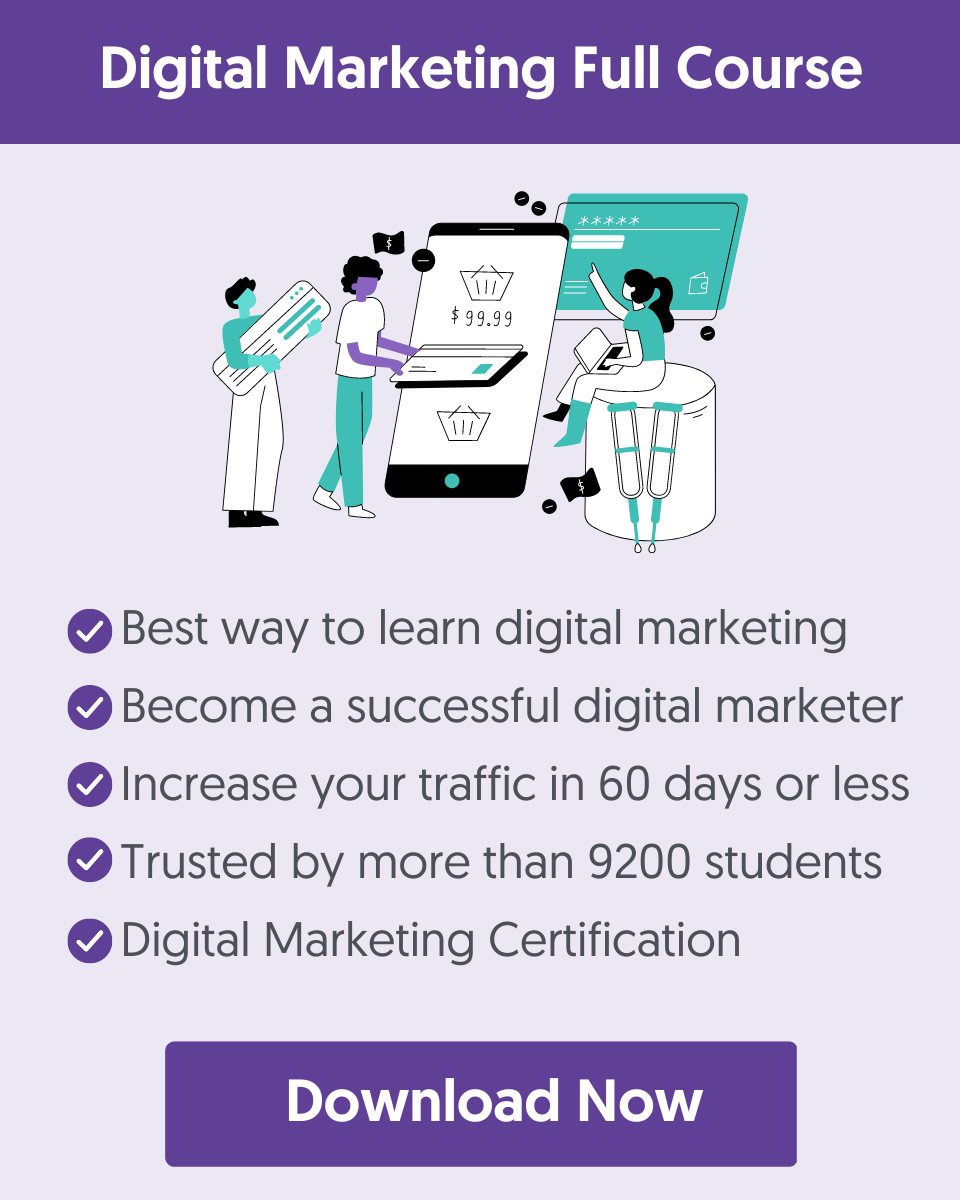
Proofreading and editing: Some content writers do all of their proofreading and editing themselves.
Publishing: Content writers will usually be able to upload their content to various platforms. This could mean adding posts to a WordPress site and scheduling them.
The key to successfully starting a job in content writing is developing your skills and gaining as much experience as possible. Here are some steps for beginners to start with content writing with no experience:
- Enroll in a course
- Practice your writing skills
- Develop complementary skills
- Find your niche
- Build your experience
1. Enroll in a course
While you don’t need a specific content writing degree to get into this industry, a content marketing certification or a digital marketing certification can be useful.
Enrolling in an online course is an excellent way to develop some of the necessary skills you’ll need to impress and attract potential clients. You can even get a copywriting certificate to add to your resume.
When looking for suitable courses, focus on the aspects of content writing you’re most interested in. For instance, if you want to get involved with content writing from an SEO perspective, look at courses covering digital marketing , SEO Courses , and writing.
You may decide to take a selection of different courses to build out the appropriate skillset.
2. Practice your writing skills
Many people aspire to be writers, particularly when they have a creative mind and a talent for language. However, only a handful of hobbyists turn their skills into a profession.
The only way to actively pursue your career in content writing is to begin practicing. It takes many hours to become the kind of writer a professional team or business would want to hire.
Begin by writing blogs for your own website, where you can advertise your skill, collect testimonials, and build a portfolio over time.
You can also get involved with online writing forums and groups to gain inspiration. You could even volunteer your writing services to publications you like. This will help to build your skills while getting your name out there.
Our Content Marketing Course will teach you everything you need to know about content writing.
Get Started
3. Develop complementary skills
Writing is the most important talent you’ll need to become a professional content writer.
However, there are other skills that can come in handy and improve your chances of getting the attention of potential clients. For instance, you’ll need fantastic communication skills to interact with clients and companies you work with.
Learning how to convey your ideas effectively to a wide audience will be essential as a content writer.
You’ll also need good research skills. Ensure you know how to track down credible sources of information when developing your career as a content writer.
Other complementary skills may include:
- SEO : Most companies want their content writers to have some basic search engine optimization .
- Problem-solving : Problem-solving skills will help you to come up with unique ways of using content to address the needs of your clients.
- Adaptability : The ability to adapt, constantly grow, and develop new skills is essential to a content writer. The tools you use to convert customers for your audience will likely change over time, so be ready to evolve frequently in your career.
4. Find your niche
While some content writers and copywriters will work on a broad range of topics across a wide variety of companies and industries, a general approach can make it difficult to stand out.
You may find you can reach a wider audience and spend more time on work you actually enjoy with a niche.
Focusing on a specific area of specialization could mean you work best for companies in the healthcare or technology industry. The more you focus on this space, the more you develop your reputation and attract potential future clients.
Alternatively, your niche could involve looking at a specific aspect of content writing. You might be particularly good at writing engaging blog posts, creating social media content, or producing whitepapers for technical companies.
5. Build your experience
Finally, the most important thing that matters to people planning on hiring a content writer is usually experience. Your future employers want to see evidence you have skills in your space.
The best way to begin building experience as a content writer is to create a portfolio of work you can share with your employers. These are basically examples of your content in the form of ad mock-ups, blog posts, and social media campaign ideas.
Once you have your portfolio and you’re posting regularly on your own website blog, look for opportunities to branch out and gain more experience.
Contributing to reputable sites, even if you don’t get paid for it, will help to demonstrate your writing skills. You can also consider offering clients a discount price in exchange for a review when you finish their project.
Follow these tips to become better a content writing.
1. Write content for all the stages of the marketing funnel
Content marketers use content to direct prospects through the different stages of the digital marketing sales funnel . Each stage of the customer journey requires a different approach to content.
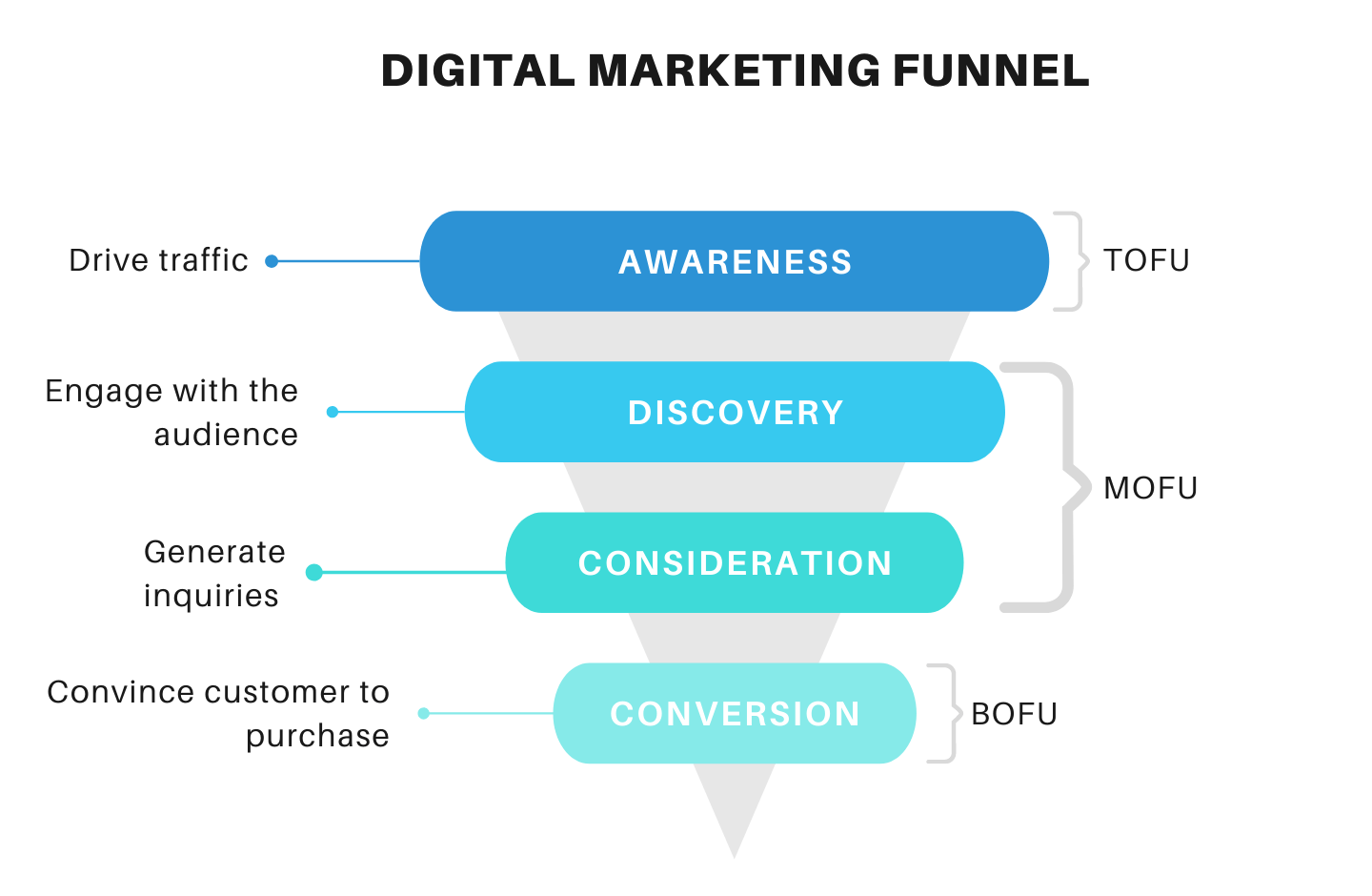
For example, during the awareness stage ( top of the funnel ), your content would aim to inform and attract customers.
During the consideration stage, you highlight the benefits of your products or services against competitors.
At the bottom of the funnel, you write content to convince customers to purchase a product or perform a desired action.
2. Always do your research
Research is vital for content for a variety of reasons. First, you need to conduct research to determine who you’re writing for.
The best content writers cultivate a specific voice to speak to a certain audience. The more you understand your customer, the more you can connect with that person on an emotional level – generating conversions.
It’s also important to research any information you will be writing about. Factual, credible information is key in content production, even if your writing is primarily for entertainment purposes.
Studies show if a brand generates fake content about products or services, around 59% of customers will stop buying from this company immediately.
To make your content as compelling as possible, research:
- Your subject matter: Learn as much as possible about the topic and use references to reputable sources to give your work credibility.
- Customers: Know your audience. Building buyer personas and understanding how customers respond to different content at various stages in the consumer journey will improve conversions on a significant scale.
- Competitors: Understanding what your competitors produce in terms of content will give you some valuable inspiration. It also helps when you’re trying to make your content unique from what’s already available on the market.
3. Master the critical components of content
Every piece of content is constructed with a series of different elements. For written content, specific components are more important to capturing and converting customers than others. For instance, you’ll need:
Head-turning headlines: Headlines determine whether your audience will bother reading the rest of the article, eBook, or any other content you produce.
If your headline isn’t engaging, readers will just hit the back button. Engaging headlines are thought-provoking and interesting.
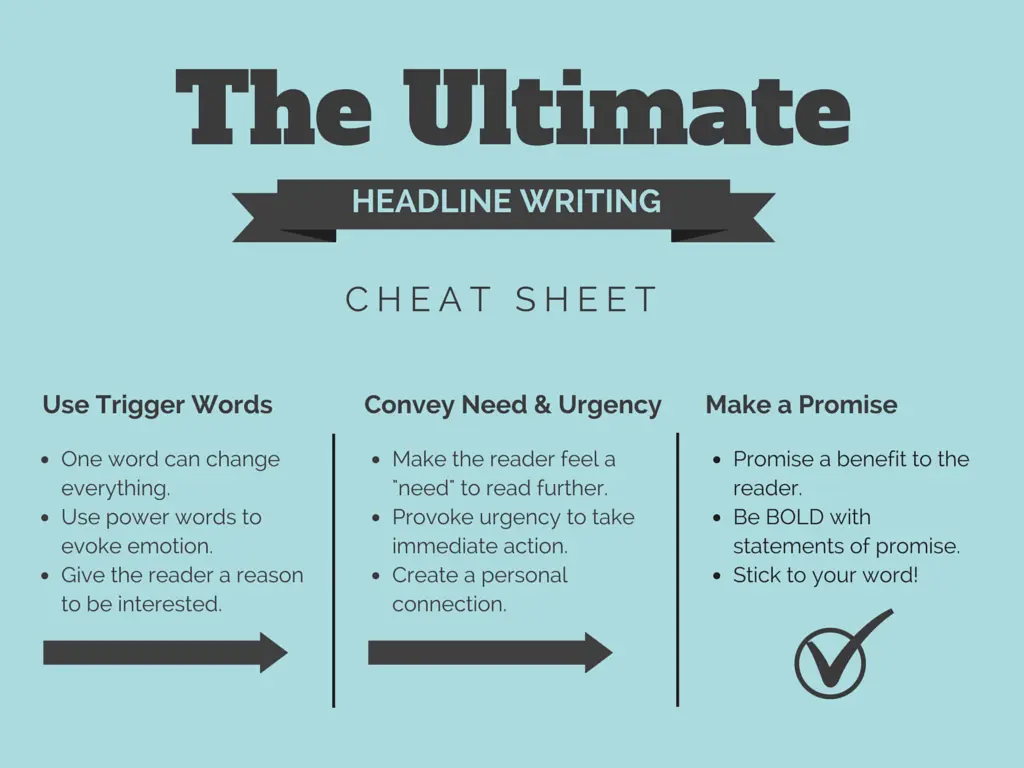
Try techniques like using numbers to demonstrate authority, such as “98% of marketers say…” or asking questions: “Do you know these email marketing tricks?”
A compelling hook: You only have a matter of seconds to keep readers engaged after they’ve read your headline. The first sentence or two is crucial in keeping your audience’s attention. Make sure you get this first section right.
Stay clear and focused: Don’t confuse your audience with a hundred different ideas in one piece of content. Focus on a specific topic and concentrate on giving your customers plenty of actionable advice to walk away with.
Remember, use a tone of voice specific to your target audience and the persona you’re writing for. This will help to make your content more compelling to the right people.
4. Edit and optimize everything you write
Finally, great content takes work. Most content writers don’t publish the first version of the piece they write. Taking the time to read through the content is crucial.
Remember, any grammatical error or unusual sentence can confuse your audience and send them running in the opposite direction.
Often, it’s helpful to have a separate proofreader on hand when creating content because they can examine your work objectively and spot things you’ve missed. Other ways to enhance your work include:
Checking for content SEO : Have you used keywords naturally and organically throughout the post? Are there internal links for page connections on your site and external links for credibility? Have you optimized your H1 tag , meta tags, headlines, and title tags?
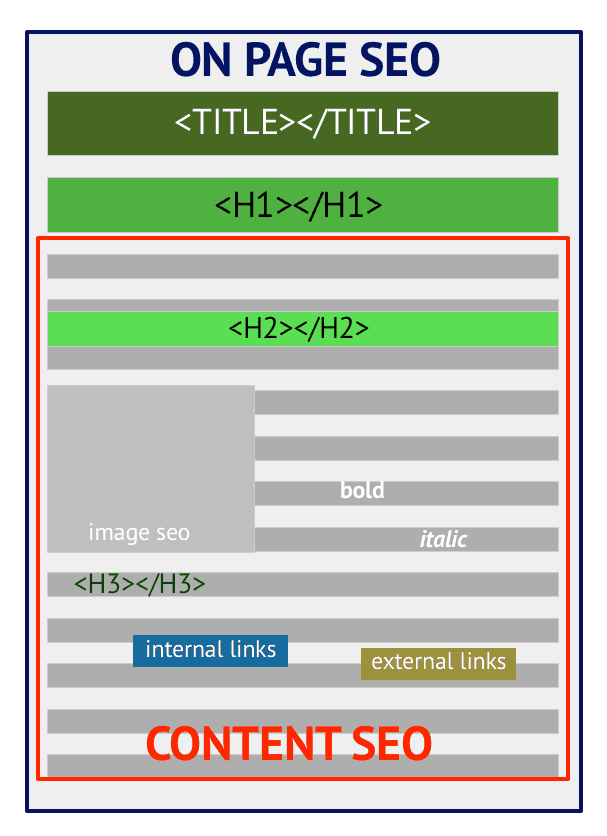
Examining readability: Is your content divided into logical segments? Have you got subheadings to guide your reader, short paragraphs, and plenty of bullet points? Keep everything as clean as possible to improve readability.
Looking at relevancy: Is every part of your content as relevant as it should be? Can you remove anything that isn’t useful to your audience?
The most common forms of content a content writer may be asked to create are:
Blogging: Blogs are a central part of building a strong content strategy . They can convey ideas about products and your brand while highlighting your thought leadership. Blogs can also be useful for SEO purposes, building organic traffic , and raising brand awareness.
Email: Writing content for emails can help to convert customers, as well as generate better engagement for your business. Email marketing also helps to build loyalty and strengthen your opportunities for repeat purchases.
Social media: Social channels require content writers to communicate various ideas and campaigns as effectively as possible.
Product content: Selling products and services requires a unique set of writing skills. You’ll have to balance sales copy with storytelling and SEO strategies.
Brand journalism: PR news releases, customer and brand stories, and internal communications can all require the support and guidance of a content writer.
Whitepapers and eBooks: Content writers can help to produce highly technical and professional content that requires a focus on a specific subject. This helps to strengthen the authority of the brand.
Video scripts: If scripts are required to create videos or even podcasts for a company’s branding purposes, a content writer can assist with this.
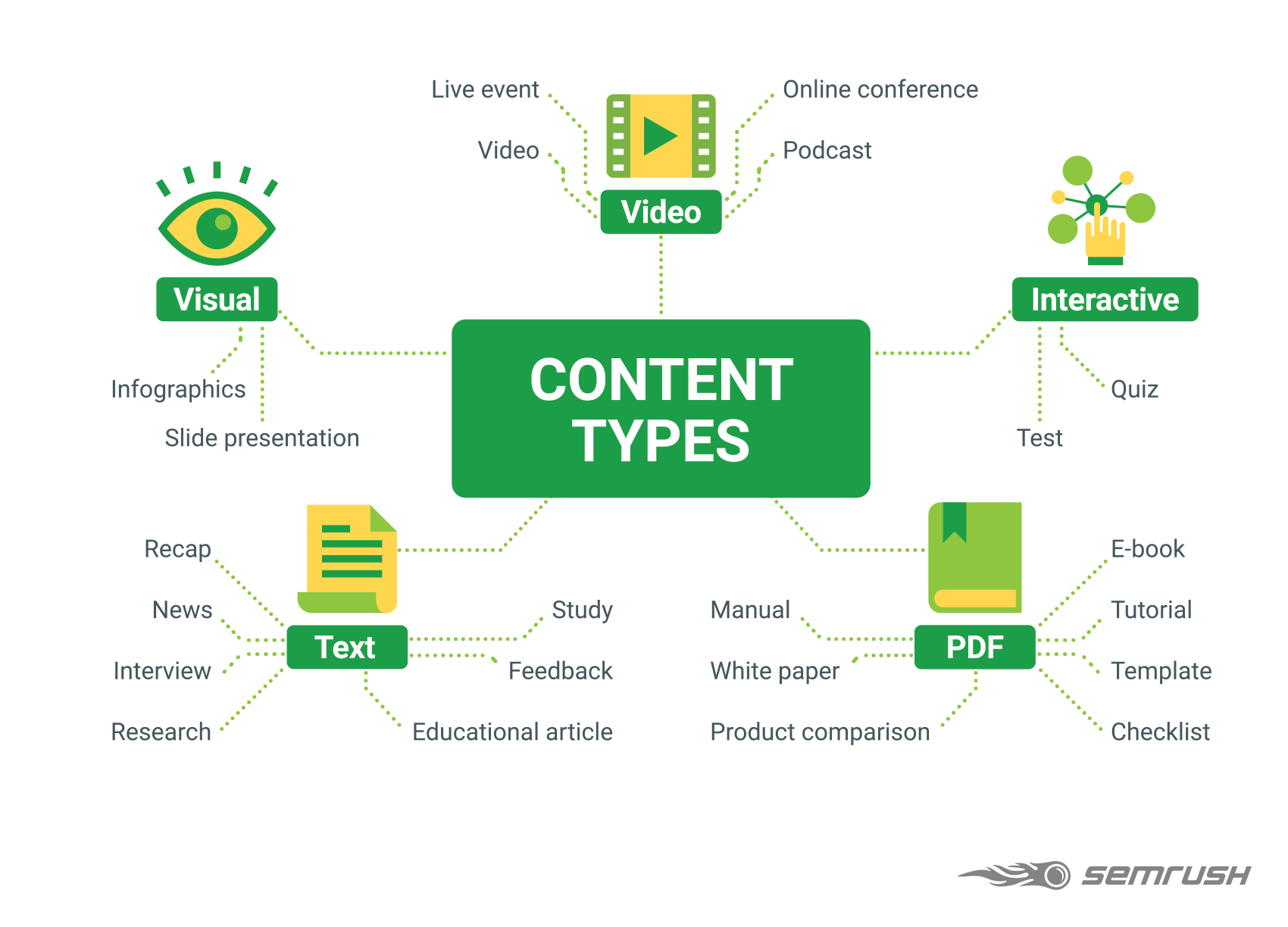
The average salary for a content writer (1-4 years of experience) is around $52,000 per year in the US. Experienced content writers (10-19 years of experience) may earn around $60,000 annually.

Indeed.com says content writers earn around $20.76 per hour. Your exact earnings will depend on your area of specialization and the kind of companies you work with regularly.
Content writing can be a highly engaging and satisfying job role for many people. It’s an exciting career with plenty of opportunities to be creative, work with new people, and develop your skills. However, it also requires significant dedication and hard work.
If you have a way with words and you know how to produce content that speaks to people, a content writing position could be ideal for you.

Alex Chris is a digital marketing consultant, author, and instructor. He has more than 18 years of practical experience with SEO and digital marketing. Alex holds an MSc Degree in eCommerce and has consulted with Fortune 500 companies in different industries. He blogs regularly about SEO and Digital marketing, and his work has been referenced by leading marketing websites. Connect with Alex on Twitter and LinkedIn .

Keep Learning
Learn how to succeed in freelance writing in a market dominated by AI writers and chatbots.
The ultimate beginner’s guide to content marketing. Learn exactly how to use content to attract and engage with an online audience.
If you’re thinking of starting a content strategy career, this is the perfect guide for you. Learn everything you need to know about content strategists, what they do, and how you can get started.
Learn how to become an SEO freelancer with this complete guide to building your skills, finding clients, and developing your new career.
November 25, 2023 at 8:21 pm
I learned a lot more about Content writing in this short article than I have learned about it in the past four years after completing my Digital Marketing Certificate course in 2019. The article is rich, lucid, and engaging to the last sentence. Wonderful work and honest help to people who need to get started on content writing as a career.

About Reliablesoft
Online training.


From Clever Girl Finance
Content Writing For Beginners : 12 Key Tips
As a beginner content writer, you don’t need to be an expert. Content writing for beginners requires being able to do research, having an understanding of basic English grammar, and being creative. Beyond that, you can easily learn the extra skills needed to succeed.

Table of contents
What is content writing, content writing for beginners: 12 tips.
- Expert tip: Keep a content writing checklist as a reference
What should every content writer know about writing?
How do i get my first content writing job, what are the basics of content writing, articles related to writing content, content writing for beginners is easy to learn.
If you’re new to the field of content writing, I’ve got 12 content writing tips for beginners that will help get you started!
But first, a refresher of what content writing is really all about!
Before you begin, it’s important you understand content writing is usually focused on writing for platforms with a marketing goal. In today’s world, this is usually digital.
For example, this blog post and other online articles are examples of content writing . Even captions on social media are a type of content writing.
Keep in mind that the internet space is large, and content writing extends to online articles, newsletters, ebooks, video scripts, white papers, and research papers.
With content writing, there is endless earning potential. Be sure you pay attention to the following tips to help you become a successful content writer.
If you’re new to this, it can be hard to know how to start content writing. Here are some key tips to help you as you begin!
1. Know what you want to write about
There are many content writing tips, and defining your interest or niche is one of the most important. Think about a topic to write about that you either know a lot about or have a strong interest in.
Being an expert in that topic isn’t necessary, you just have to know a little more than the average person. Or be willing to do some research.
Here are some popular niches that you could write about:
- Personal Finance
- SasS (software as a service)
- Health and Fitness
Once you choose a topic or niche, take a look at what information or content is already out there.
Type your topic in Google search and pay attention to what types of blog posts and articles show up in the results. It’s helpful to pay attention to related Google searches around your topic.
Understanding what people are searching for will give you ideas on what to write about and help you improve your search engine optimization (SEO) skills.
Personally, I love to write about personal finance and education and so that’s what I focus on in my content writing work.
2. Read and study online content
Once you’ve found the different types of content on your topic of interest, it’s time to read. Reading is one of the easiest content writing tips for beginners. When reading articles from different publications, make note of why that content is popular.
One thing I like to do is read the big publication websites in my writing niche to see how their writers write e.g. Forbes, CNBC and Yahoo Finance. Reading different articles also exposes you to quality writing and helps you to write for bigger audiences.
Pay attention to comments or reviews about the online content. When you identify what people enjoy most about the content, such as the tone or the anecdotes, you can apply similar characteristics to your writing.
In addition, take note of what information is missing. Perhaps you want to write educational content, and the majority of online material is about grade school and less about preschool learners.
With less content in a particular area, you can start writing content that fills the gap and attracts a new group of readers.
3. Understand voice, tone, and style
Another thing to note while reading through existing content is the publication’s voice, style, and tone. These are essential areas to be aware of when it comes to content writing for beginners.
Here are what those elements mean:
The voice of the content refers to the way the piece was written. The voice can be casual and informative, like you’re talking to a good friend. Or it can be professional and direct, as if you are talking with a coworker or a boss.
The style refers to the grammatical structure. Besides the basic rules of grammar, different publications and businesses will pick and choose which aspects of grammar they want to use.
For instance, some publications will use exclamation points and em dash to communicate their message.
The tone is how the reader interprets the written content. Similar to the tone of voice, it helps you interpret the intention of the article.
For instance, most lifestyle blogs have a cheerful and optimistic tone that encourages you to make positive changes in your life.
Understanding voice, style, and tone will help you write for any publication and help your personal blog stand out.
4. Understand your audience
Understanding the audience can be pretty tough for new writers, as it’s easy to write from your own point of view.
However, content writing is for consumers who are looking to learn something or be entertained. Thus, content writing for beginners involves understanding the readers.
Here are some questions you can keep in mind when writing.
- Which problems are my readers experiencing?
- Why are readers interested in this topic?
- What are the demographics and lifestyles of my readers?
The more you keep your audience in mind when you’re writing, the more relatable your content will be. It may be helpful to create a reader persona .
5. Do your research
As mentioned before, you should know a lot about a topic before writing about it.
In addition, it’s important to know how to do research. Quality research consists of finding information from reliable sources, fact-checking, and accurately communicating your findings without plagiarizing.
Research is essential because it helps you to provide more professional insight and value to your readers.
When researching, make sure you cross reference your information to help guarantee accuracy. Always remember to fact check your article .
6. Practice writing concisely
When it comes to content writing for beginners, an easy mistake to fall into is writing fluff content .
Fluff writing happens when writers are so worried about creating content or hitting a certain word count that they write unnecessary sentences or paragraphs that have very little value.
To avoid this type of writing, a very helpful content writing tip for beginners is to practice writing concisely.
Before you start writing, ask yourself, “What is the most important information that needs to be shared?” Then, decide how you can bring value through the content you are writing.
7. Create great headlines
As you learn how to start content writing, you’ll find that headlines are a great way to capture reader’s attention and get them to read your article. So, what makes a great headline?
According to Constant Contact, using active voice, keeping your headlines short, and creating interest to read more are some of the best bets for good headlines.
The 80 20 rule of headlines explains that 80% of people will read headlines, and only 20% will read the rest of the article. Pretty convincing evidence to spend time on this!
So, be sure to check that your headlines don’t have unnecessary information, they should be to the point and concise. In addition, write something that makes your readers want to keep reading and get more information.
For example, here’s an average headline: “Many readers enjoy reading fiction books in the summer”. But here’s a better headline: “Why summertime reading is wildly popular!”
8. Focus on your first paragraph
You need your readers to truly want to read the rest of what you wrote, so crafting those first few sentences really matters.
There are several ways to create the perfect first paragraph, including asking a question or telling a story, according to Enchanting Marketing .
In addition, don’t forget to use proper grammar to sound more professional. Above all, get readers to care about the content that you wrote and make them understand why reading this is worth their time.
9. Understand how to do keyword research
It may seem like there’s a lot to remember when it comes to content writing for beginners, but the more you know, the better. One content writing tip for beginners that will be invaluable is understanding keywords.
You can get better at simple keyword research by using free tools. This article by Zapier highlights some of the best free keyword tools, including Semrush, Ahrefs and Moz .
Semrush also offers a free course on SEO that I’ve personally enjoyed taking.
Keywords and SEO can be complicated, but the most important thing is to find out what keywords to use to get your content to the right audience, as well as how to structure your article. Doing this gets simpler the more you practice, and the more you write.
When you understand how to find keywords, you can start to incorporate them into your writing, which will help improve your SEO editing skills and bring more eyes to your content.
10. Learn from your competition
Out of all the content writing tips for beginners, studying the content of your competitors is often overlooked.
When reading their work, ask yourself what makes it stand out and how can you make your content even more valuable.
What information or insights do you have that may not be available to your competition?
When you understand how to write better content than your competitors, you have a better chance of your content performing well.
11. Review your work
Content writing for beginners isn’t all about writing, it’s also about editing and proofreading.
For best practices, it’s helpful to always have a second pair of eyes review your work for any typos or inconsistencies.
However, it’s equally important for you to catch your own mistakes.
To help you improve your self-editing skills, the best time to review your work is 24 hours after it’s written.
Let the content breathe, and give yourself time away from the piece. When you come back, it’ll be easier to spot typos and grammatical errors because the content will seem new to your brain.
Although this tip can be easy to skip, being able to edit your content that will be read by hundreds of people will help you gain credibility and make things easier for your editor.
12. Be open to feedback
Often, content writing for beginners or a first time author means being open to feedback . This could be feedback from your readers, editors, or anyone you share your work with.
Almost every writer remembers that moment in grade school when they got an essay back covered in red marks of corrections.
Getting critiques or any type of feedback on your writing can feel uncomfortable. As a beginning writer, feedback may even make you doubt yourself.
Instead of closing yourself off to the new information, try seeing it as an opportunity to grow.
An article on Betterup.com suggests being open to asking questions about your feedback to help you better understand and gain clarity.
In addition, you can try to analyze your feedback for any patterns that may have come up.
Expert tip: Keep a content writing checklist as a reference As you learn more about content writing, keep a checklist that you can use whenever you write something. You might include things like checking that the basic grammar is correct, reading through your final draft before you turn it in, and remembering to fully explain each idea that you bring up in your writing. Having my own checklist has been very useful for my writing. Your checklist will be unique to you and your writing style. But be sure to refer to it often and add to it as you learn new things. Being consistent with your work and continuing to grow is a surefire way to become a better writer and get more jobs.
When you learn how to start content writing, and you begin applying for jobs, every content writer should know that they will face some rejection. Prepare for this and know that it is part of the journey.
You can be a very talented writer and still not get the job that you want.
So, be prepared to apply for a lot of entry level writing jobs and know that it may take a while to find the right one. But once you do, it will be great to know that you kept going and didn’t give up!
There are several ways to get your first content writing job, including job boards and networking. A good job board to check out is ProBlogger , or you can try many other job boards, too. You may find the writing job you want simply by applying.
If not, another approach is to network. Do you know any writers? Editors? Bloggers? Ask for advice and for them to keep you in mind for any jobs they hear of.
The basics of content writing include doing proper research, writing well, and creating engaging content. Doing these 3 things will ensure that you write things that are factual with good grammar and that you write information that people want to read and can learn from.
Mastering these skills may not be easy, but with time and dedication, you can become an expert at all three. Using content writing tips for beginners can also help. Remember to practice writing a lot, always fact-check your work, and read through your writing to ensure that it is interesting and captivating for readers.
Did you find this article helpful? Learn more from these related articles.
- How To Start Freelance Grant Writing
- Building A Career Out Of Full-Time Blogging
- Creating Your Writers Toolkit: 14 Best Tools For Writers
Content writing for beginners can be simple if you follow these key tips. By reading and studying your competition, reviewing your work, and learning to write concisely, content writing will soon feel like second nature.
Above all, it’s important to remember that good content writing takes time to produce.
When you continuously practice, you will become better and better with each new piece of content you create. For more writing tips, also review our articles about writer’s block and how to become an author .
Kiersten Brown
Leave a comment.
Your email address will not be published. Required fields are marked *
Privacy Overview
| Cookie | Duration | Description |
|---|---|---|
| cookielawinfo-checkbox-analytics | 11 months | This cookie is set by GDPR Cookie Consent plugin. The cookie is used to store the user consent for the cookies in the category "Analytics". |
| cookielawinfo-checkbox-functional | 11 months | The cookie is set by GDPR cookie consent to record the user consent for the cookies in the category "Functional". |
| cookielawinfo-checkbox-necessary | 11 months | This cookie is set by GDPR Cookie Consent plugin. The cookies is used to store the user consent for the cookies in the category "Necessary". |
| cookielawinfo-checkbox-others | 11 months | This cookie is set by GDPR Cookie Consent plugin. The cookie is used to store the user consent for the cookies in the category "Other. |
| cookielawinfo-checkbox-performance | 11 months | This cookie is set by GDPR Cookie Consent plugin. The cookie is used to store the user consent for the cookies in the category "Performance". |
| viewed_cookie_policy | 11 months | The cookie is set by the GDPR Cookie Consent plugin and is used to store whether or not user has consented to the use of cookies. It does not store any personal data. |
How to Start Content Writing (For Beginners)
By: Author Paul Jenkins
Posted on Published: September 26, 2021 - Last updated: December 6, 2021
Categories Writing
Are you ready to make content writing your full-time job? To become a professional writer? If so, there are a few steps that will help you succeed. Whether it’s your first time writing content or you want to take your skills to the next level. This article is an insider guide on how to start content writing and become a successful content writer.
What Is Content Writing
Content writing is a profession that requires certain skills. Not just writing skill!
Content writers must be able to research various topics and perhaps even interview several people on a topic to find out the most important points.
Even before they start outlining, drafting, and writing.
If you’re running your own website, you may also need to learn SEO (search engine optimization), topic research, and on-page optimization. Plus some WordPress skills!
Content writing is a fundamental part of digital marketing, therefore acquiring the skill can help foster a career in marketing.
You don’t learn these things overnight! Becoming a web content writer is hard work, but very rewarding!
Types of Content Writing
There are many different types of content writing, such as:
- writing content for websites
- writing content for newspapers and magazines
- writing content for online marketing
- writing content for public relations (PR)
- SEO writing
There are many different subjects that a good content writer could write about.
For example, it could be recipes or travel guides. Or spirituality and philosophy.
Often, though, content writers tend to specialize in areas in which either they have prior experience or ones in which they develop expertise over time.
Writing SEO articles is a special type of content writing because SEO content writers need to know how keywords work so that the articles can be optimized for the search engines.
Examples of Good Content
It’s a good idea to look at excellent examples of website content online first.
For example, you could search Google for successful content writers and then find their work on various websites. That way, you can look at some of the different types of content writing and content marketing, as well as examples of the best content that’s been written.
The Working Time of a Content Writer
Content writers spend their time in different ways.
They may spend time researching a particular topic, interviewing different people to gather information, and then writing the content when they feel they’ve enough information.
Online research plays a huge role.
The content writer can then spend time editing and rewriting the material to make sure it’s as good as it can be.
Creativity and Content Writing
Although content writing is largely about formulating a topic, researching, and creating outlines to structure the content, there’s also a considerable creative component to this work.
While it’s possible to dig into the more technical aspects of content writing, such as research and editing, the content writer must also develop creative ideas and present them clearly and concisely.
A content writer can even be tasked with presenting a new perspective on a topic, showing how it works and how it can be better understood and used.
You also need to be able to write creatively to develop a story or something that’s compelling.
In content writing, you need to be able to look at a topic from a different perspective. The job of a content writer is to put themselves in the reader’s perspective and ask, “What if it were such and such?” This can be a difficult skill to learn, but a content writer must’ve some creative ability to be successful.
Content writing is a profession that depends on putting one’s thoughts and ideas into words in a way that the reader can understand. In this way, content writing can’t only be a lot of fun, but also a good income for those who do it well.
Content Strategy vs Content Writing
Content strategy is the art and craft of planning, organizing and publishing content. Thus, it encompasses both content creation and content marketing.
Content strategies are developed for different purposes. Some content strategies are created to help websites rank better in search engines. This is to attract more customers. Other content strategies aim to attract customers by engaging with them through content. This type of content strategy aims more to involve customers in the content creation process so that they’re engaged with the company.
It’s not limited to websites or social media marketing but is also an important part of advertising.
Content strategy is about understanding what you want your content to achieve and how you can use it to achieve it.
Content writing is part of content strategy.
Effective Content Writing
It’s important to write content in a way that’s effective.
This means that your copy needs to be written in a way that serves the purpose of the content.
For example, if you’re writing an article on your website to help readers in the kitchen, you need to make sure that you focus on teaching them how to make and use things in the kitchen!
When you’re writing about kitchens, you don’t want to write about something that the reader may not have wanted to know about. If you focus, your readers will be more likely to stay on your website to read more articles.
You need to learn to write clearly so that your readers understand what you’re writing about.
You also need to make sure that you use the right writing style for your audience so that they understand what you’re trying to say, and resonate with the content.
If you don’t make your content focused and clear, your audience won’t enjoy reading it and won’t learn anything.
Freelance Writing Niches
As a rule, it’s a good idea to specialize in niches as a freelance content writer. This means that you specialize in areas where you know your stuff or have a lot of experience to share.
By sharing this knowledge, you help others learn more about the things that interest them.
When you have clear niches, it’s usually easy to get more work. People see that you’re an expert in your field and hire you because they assume you know what you’re talking about.
They also find you more easily online, where they can consult your resume, work samples, and other information.
Having niches also makes writing articles much easier and faster!
Remember that certain niches pay more money for content writers than others. For example, writing SEO articles, medical newsletters, or articles for the legal industry, provided you have the necessary qualifications and expertise.
Writing Mindset
It’s a good idea to cultivate a consistent and helpful mindset as a writer.
This is important because it allows you to approach writing assignments with a certain amount of composure.
Writing daily is a helpful way to approach things. This allows the writer to write something every day, even if it’s just a few sentences, and then edit and rewrite it. It helps the writer develop his/her content writing skill.
A good attitude is also important.
No matter what your experience as a writer, it’s important to remember that no one is perfect and that you can always learn.
If you don’t have any experience as a writer, don’t worry. No one knows everything about writing when they start out. Most experienced writers will tell you that they’re still learning something new every day.
If you want to write for a living, you need to realize that writing is a business, and it’s important to approach the work with the right attitude. That doesn’t mean all work and no play!
If you’re working, you’ll probably be sitting at the computer for hours, but that doesn’t mean you can’t have fun.
Learning to write can be an exciting adventure. It’s fun to see your first articles published, whether it’s on a blog or in an online magazine.
Even if you’ve been writing for a while, it’s fun to see your earnings grow. It’s not easy to get money and work. So when you’re successful, you’ve to appreciate it. That’s part of the business of being a writer.
The benefits of writing every day include the following:
- You can work on a regular schedule, so you can plan your life around your writing.
- You can write a specific workload every day.
- You’ll have a regular number of articles with which to build a portfolio.
- You’ll have a regular number of articles that you can submit to online magazines and other publications. This will help you build a good reputation.
Know What to Write
When you set out to write a text, it’s important that you know what you want to write. In this respect, content writing is very different from writing fiction, for example.
When you’re writing content, you need to know what your message is and how you want to present it.
So before you start writing, you need to do some research and ask yourself some questions.
- What’s the topic?
- How will you approach the topic?
- How will you structure the article?
- Where will you publish the article?
- How exactly do you want to be in the article?
- How will you format the article?
These questions and the decisions you make will help you write high-quality content.
Stick to the Point
You may be tempted to write about something other than the subject of a particular article or content job, but you need to learn to focus on your message and stay on point.
This is a crucial part of being a content writer. You need to find a way to stay focused on the topic you’ve been assigned, and you also need to keep your audience engaged.
You need to keep your content clear and concise. Only talk about what’s relevant to the article!
The best way to do this is to figure out the main topic of the article and use it as a guide throughout the writing process.
- Focus on the main topic of the article.
- What do you want to achieve with the article?
- What’s the main argument of the article?
- What’s the main reason someone wants to read the article (the “search intent”)?
This is easier if you have a clear topic and audience.
If you know what you want to say and who you’re addressing, you can approach the topic from different angles, but you’ll still be able to get to the heart of your text.
Provide Value
Writing valuable content means that
a) the text is valuable to the audience, and b) it’s useful to the company for whom you are writing (which might be your own).
Content writing is a valuable business, and if you learn how to create valuable content, you’ll be able to make a good income from it.
When you think about what you’re sharing with your audience, make sure you’re giving them the information they can use.
For example, if you’re writing about how to bake the perfect apple pie, make sure you provide information about what ingredients are needed, how to mix them together, how to bake the pie, etc.
You need to make sure that your readers can use the information you give them. You’re not doing anyone a favor by giving them the information they can’t use!
Don’t Choose Random Topics
You might think that a website content writer will sit down and pick a topic out of a hat. Nothing could be further from the truth!
Each topic is chosen with a clear goal in mind.
Whether it’s to get more organic search traffic to a website, with SEO writing to get backlinks that improve SEO rankings, to generate leads for a company’s products or services, to promote a company’s products or services, or to drive traffic to a company’s landing page.
It can also be about increasing leads for a business, establishing a new brand name, making people aware of the brand, or selling a product.
It can also be about getting people to sign up for a mailing list or download a free eBook.
You get the point. Each topic is chosen with a specific goal in mind.
It’s important to be aware of this because it’ll help you write more effectively.
Pay Attention to Keywords
Even if as a writer you get an assignment where the keyword research is already done for you, it’s still important to think about the keywords when writing a content piece.
If you don’t include the keywords in the article, the article isn’t technically optimized for the keyword and someone searching for that keyword may not find the article even if your article is the best answer to their question.
Keywords help you structure your article and focus on the main topic.
For example, if you’re writing an article about how to make a perfect organic smoothie, you will need to know what’re the most important keywords for this article.
Don’t Keyword Stuff
You need to avoid the so-called ‘keyword stuffing’ in your work.
Keyword stuffing is when you don’t focus on the topic of the content piece, but try to pack in as many keywords as possible.
Content writing is all about creating the best content possible. If you try to cram keywords into an article without structuring it thematically, you’re doing yourself (and your client and readers) a disservice.
You should only use keywords when they naturally fit the topic. For example, if you’re writing about organic smoothies, make sure you use words like “organic” and “smoothie.”
Match Search Intent
The best way to meet search intent is to really understand what the person searching for the keyword is trying to find. Think about how and why they searched for the keyword.
In other words:
- Why are they searching for the keyword?
- What do they want to accomplish with the information?
- What’ll they do with the information after they read it?
Your goal as a content creator should be to provide the most comprehensive and helpful answer to the search query.
Get to the Point
As a rule, it’s a good idea to avoid long, wordy introductions.
Get straight to the point.
The same advice applies to paragraphs. Keep them short and to the point.
Because your main goal is to give your audience the information they’re looking for, and you don’t want to tell them over much. Whether they match a buyer persona or are simply looking for information.
Your job is to get right to the heart of the matter.
Write only the words that are necessary to get your message across!
Sometimes it can be a really good idea to tell a story in an article.
However, if you do this, you should make sure that you tell the story in a way that serves the purpose you want to achieve.
For example, if you’re writing about the organic smoothie mentioned above, you could also tell a story about how you learned about the health benefits of smoothies.
Efficient Research
Efficient research is at the heart of any good writing. You need to find a way to research in such a way that you don’t get bogged down in details.
Avoid rabbit holes!
Remember, you only have a limited amount of time to write your content, so you need to be able to research quickly and effectively.
The best way to do this is to use a combination of online and offline tools.
- Start with free sources like Wikipedia. Find the best sources of information on the topic.
- Use crowdsourcing websites like Quora to ask experts about the topic.
- Use Google to refine your search for information.
- Use tools like Answer the Public to find out what questions people are really asking.
- Tools like SEMRush can help you find out what keywords people are searching for.
Don’t ignore personal experience and experiments.
Let’s say you’re writing about boomerangs and you want to know how to throw them most effectively and efficiently.
The best way to do your research might be to start throwing boomerangs yourself!
In other words, go out and buy a boomerang and use it for several weeks.
This way you’ll get a good understanding of how the boomerang moves through the air and what’s an effective and what’s an ineffective boomerang throw.
You can develop a much better understanding of what you want to write about, and some fun stories, that will make it much easier to write a quality article.
Avoid Plagiarism
It’s critical to be clear about what plagiarism is.
Plagiarism is when you copy another person’s work and pass it off as your own.
When writing content for clients, you need to make sure that you never plagiarize someone else’s work or ideas.
Back up your work with your own research and opinion.
If you take the example above – the boomerang – you could simply copy and paste the information you find on the Internet about boomerangs into your content.
That would be plagiarism.
It’s important that you build on your research, expand it, and improve it. Never simply copy and paste information from other sources.
Cite your sources properly. Either with direct links in the body text or with a list of sources.
If you use a quote from a book or article, put it in quotation marks.
Understand Fair Use
Fair use means that you use copyrighted material without the author’s permission, but only for a limited and “reasonable” purpose, and that you use only as much of the copyrighted material as is necessary for your purpose, and that you credit the source of the material.
You use a copyrighted work for a limited and “transformative” purpose.
The copyright owner can still sue you if you use content without permission, but if you use it according to the rules of fair use, you aren’t technically in violation of copyright.
Mastering Opening Lines
Opening lines are very important when writing content. Whether it’s the beginning of a text or the beginning of a story, the opening is what draws your audience in.
It’s your way of grabbing the reader’s attention and enticing them to read the whole story.
Opening lines can pique the curiosity and interest of your readers and/or customers.
You make them wonder, “What’s going on here? I want to find out.”
That’s why you should avoid clunky, boring, and tedious opening sentences.
Remember that you want your text to grab the attention of your target audience and captivate them.
For example, if you’re writing a testimonial, you could start with a bold statement like “This product has changed my life”.
You can start with a question or a statistic or fact.
The most important thing is that you grab the reader’s attention. The first words – together with its headline – are the most important part of your article.
You can write captivating content, but if you don’t manage to grab the reader’s attention with the first line, they won’t read to the end of the first paragraph.
Imagine writing an article about how to throw a boomerang.
You could write:
“The best way to throw a boomerang isn’t to throw the boomerang.”
This is a snappy, creative, and interesting opening line. You can use it to grab the reader’s attention and get them excited about the article.
Get Great at Outlining
The more content you write, the better you’ll get at creating an outline quickly.
You’ll reach a point where you’re able to write a full article in a few minutes.
That doesn’t mean you’ll be able to write a great article in a few minutes, but you’ll be able to formulate the outline of an article in a few minutes.
It means that you’ll know all the important points of the article and you’ll be able to write those points down quickly.
The reason why you should write your outline quickly is that you want to make sure that you get to the heart of your ideas and concepts quickly.
In my opinion, there’s nothing better than mind mapping to quickly and easily outline your ideas and concepts and then flesh them out into a full text.
The advantage of a mind map is that you can easily see how all the ideas and concepts relate to each other.
This way you can make sure you cover all the areas and provide the most benefit to your readers.
You should always write the title in the middle of the mind map. Then you should write down the most important points and arrange them around the title.
Once I’ve outlined and restructured the article in the mind map, I export it as markdown and take it into my favorite text editor. With markdown, all the branches and sub-branches of the mind map appear as headings in the text.
Write…a LOT
When you start writing content, guess what? You actually have to write!
A lot of it.
I’d recommend at least a thousand words a day, but that’s only for beginners. If you’re a veteran, I’d recommend at least two thousand words a day.
Part of that’s making a schedule for yourself and committing to putting in the hours.
Personally, I write at least 4,000 words a day. It’s a discipline.
The more you write, the better you get.
It’s not always easy. It’s not always fun.
But it’s necessary.
You’ll get better.
You’ll become faster.
You’ll get better at developing ideas.
You’ll get better at organizing your ideas.
You’ll get better at writing.
You’ll get better at writing complete content.
Over time, your skills will improve.
So don’t give up after one, two, or three posts.
Keep writing.
And keep improving.
Have a Writing Den
Having your own place to write will help you get ready to write. If you get up, go to a specific area, and start writing, it’ll be much more effective than if you write in the same area where you do all your other tasks.
When you get up and go to a specific area, you can concentrate better. It makes you more productive.
It makes you a better professional content writer.
You can create your own space in different ways. You could set up a home office. You could set aside a room in your house for that purpose. You could set up a special room in one part of your house.
The most important thing is that you create a space specifically for writing.
This will help you start writing, get in the writing mood, and get the most done.
Time Management and Tracking
Since I use a Mac, the wonderful Session app is very useful for keeping track of time and remembering to take breaks.
However, there are many ways to track how much time you spend writing and how much time you spend on each article or piece of content.
If you get your time management right, you can become more efficient.
I recommend the Pomodoro Technique, where you work for 25 minutes and then take a 5-minute break.
First, try to write for 25 minutes at a time and then take a break.
Then increase the time you write.
Then extend the break time.
Remember that writing is only part of the job. You usually need to allow time for other tasks as well, such as research, editing, and formatting.
Master a Variety of Writing Styles
If you’re freelancing, it’s helpful to develop different writing styles that fit the tone and style of the publication you’re working for.
This will also help you build an impressive writing portfolio.
For example, if you’re writing a business-related blog post, you’ll need to develop a slightly different writing style than if you’re writing an article for a lifestyle magazine.
Each of these publications has a different target market.
Therefore, the tone of the article will be different, as will the way the article is structured.
Freelance writers who work with a variety of publications and learn to develop a unique writing style for each publication are more valuable to a variety of clients.
In my blog, I use a light, modern, and sometimes humorous tone.
In some of my assignments, I use a formal, academic style.
On some other assignments, I use a playful style.
You shouldn’t use the same writing style for all your projects.
You should make sure you use the style that best suits your audience.
Compelling Content Using the Right Words
As you progress with content writing, you’ll start to acquire knowledge about copywriting.
Although content writing is different than copywriting, it can be helpful to incorporate a little copywriting into your content. This way, you’ll create more compelling writing.
For example, you could use a headline that’s identical to the headline of a direct response ad. Or you could use a call to action that would appear in a direct response ad. Or you could create a list that’s in the style of a direct response ad.
You don’t have to do any of that, but you can.
Don’t try to copy a direct response copywriter. Instead, learn from the best and use some of the techniques to create better content.
Get Good at Editing
The ability to quickly hack into a first draft to see the forest for the trees is really valuable.
In most cases, content is better when it’s a little shorter.
Aim to cut 15 to 20 percent of your first draft.
Remember, you shouldn’t edit the first draft while you’re still in the writing flow.
You should set it aside and come back with fresh eyes.
If you’re looking for a really good first revision solution, I recommend taking a look at Instatext . With the ability to correct an entire text with one click and choose the tone and region, it’s a really cool tool. One of the benefits is that it helps keep tone and style consistent.
At a later stage of editing, I use Grammarly Premium to make fine corrections (although I find that it’s often too tedious to make all the suggested changes – I reserve that for particularly valuable content).
Format Like Your Life Depended on It
If you publish your articles in WordPress (and I recommend using the built-in Gutenberg for this), make sure the article is easy to read for users reading it on a mobile device.
The best way to do this is to reduce the size of the window you’re working in to mimic the proportions of the mobile device in portrait mode.
Be Easy to Read
People don’t want to read difficult content. They want to read great content that they can understand quickly.
If you’re writing for the web, you need to make sure you’re able to write quality content in a way that’s accessible, but at the same time educates, informs, and entertains.
Hemingway App is a great tool to make sure you’re writing in a way that’s easy to understand. There’s a readability score based on Flesch Reading Ease and Flesch-Kincaid Grade Level.
I like this app because it provides a clear, clean, and quick assessment of a text’s readability.
The tool tells you if you’re using the passive voice, how many words are in each sentence, and how hard the text is to read.
Quotes Away
A great way to spice up your written content is to use relevant quotes.
Make sure you attribute the quote, of course!
Best tools for Content Writing
For a whole article on content writing tools, check out this article I wrote recently.
Finding Work and Money as a Content Writer
Maybe you want to make money writing content as a freelancer.
In that case, I’d advise you to find online publications in your niche, read them, see what they write about, and then approach those publications about publishing content you want to write for them.
Regardless of your level, you can always approach companies in your niche and offer your services.
You might find employment in a content writing company (or set up a content writing business yourself!), Watch out that it is not a content mill, that might wear you down and degrade your skills.
As a freelancer, start small, take on jobs you’re confident you can do, and build a client base.
There are certain marketplaces that have a good reputation, including WriterAccess, ProBlogger, and some of the gigs on Upwork.
The problem with some of these sites is that you can get lost in the crowd, and it can be difficult to get the attention of the companies you’d like to work with.
Still, you can find a freelance writing job on these sites , and they can help you earn an income.
If you can get copywriting jobs, they generally will pay more than content writing.
Have a Portfolio
One of the best ways to build a portfolio and get freelance writing jobs is to set up a blog and write regularly.
You can use your articles as writing samples. If you have a blog, people can see how well you write.
Remember that not all jobs are right for you, and not all clients are either. You have the absolute right to turn down a job if the client is too demanding or if you suspect that payment won’t be made on time or at all.
A quick Google check on potential employers can work wonders!
For your part, act like a professional. Deliver what you promise, build a reputation for quality work, and for quick revisions (within reason). Make sure you follow content guidelines and client instructions to the letter.
Have and Keep Goals
Keep SMART goals in mind when planning which assignments to accept and which to reject. SMART goals mean that the objectives are specific, measurable, achievable, realistic, and time-bound.
When writing, it can be easy to get lost in the words and lose sight of the overall context of the business. This is another good reason to measure the time it takes you to write certain types of content.
Your goal should usually be to increase the number of words per hour.
Dictation can be a great way to achieve this, as can an AI writing assistant like Sudowrite (which I’m using to write this article!).
Keep reviewing your goals throughout your freelance writing career.
How do I get started writing content from home?
The best way to start writing content from home is to create and grow a blog and then do freelance work for online publications. You can also approach certain companies and ask if you can offer your services.
How can I start writing content with no experience?
If you don’t have experience, you can start writing content by writing for your own blog and then using that blog for assignments.
What’re the basics of content writing?
The most important thing when writing content is that the content is relevant to the target audience and that it can be found.
What’s SEO Content Writing?
SEO Content Writing is the art and craft of writing content so that it’s seen by search engines and ranks well in search engines.
What’s the format in content writing?
The format in writing content is to make it as readable, accessible, and exciting as possible. If you can do that, you’ll do well in content writing.
What are types of content writing?
Types of content writing include blog posts, web content, articles, reviews, e-books, magazines, white papers, videos, scripts, technical writing, digital content, and presentations.
What are content writing examples?
You can find good content writing examples at major publishers like Mashable, Forbes, Huffington Post, Entrepreneur, Inc, Business Insider. Pick a topic that interests you and read through some of the articles. Look at how they’re formatted, how they’re written, and what grabs your attention.
What are good Content Writing courses?
There are a number of good online courses to learn content writing. I’d be crazy not to mention my own: The Content Writing Course on Udemy.

Starting A Blog: How to Learn Content Writing for Beginners
Last Updated on Aug 1, 2023
Fact Checked
Are you wondering how to learn content writing for beginners? Maybe starting a blog? Uncertain about content writing?
You’re not alone. Many beginners struggle to engage their audience. But fear not! Follow these tips to stand out: Identify your niche and target audience. What topics interest you? Who do you want to reach?
Narrow your focus, create valuable content, and plan with an editorial calendar. Quality writing and consistency will lead to blogging success.
Key Takeaways
- Identifying the niche and target audience is crucial for creating relevant and valuable content.
- Craft quality content that is informative, engaging, and easy to read, using storytelling to make posts relatable, emotional, and memorable.
- Optimize content for SEO by conducting keyword research and using on-page optimization strategies.
- Engage with the audience to build relationships, encourage discussion, and seek feedback to improve the blog continuously.

Identify Your Niche and Target Audience
Learn content writing for beginners: New to blogging? Tailor your content to your niche and audience.
Get inspired by personal experiences and research popular topics. Know your target demographic to create relevant content that addresses their pain points.
Interest in the topic is crucial. For example: to succeed in iGaming content , it’s crucial to identify your niche and target audience from the outset.
Identify your niche and target audience upfront for long-term blogging success.
Brainstorm Ideas and Create an Editorial Calendar
When it comes to brainstorming ideas and creating an editorial calendar, you need to have a plan in place.
Start by using mind-mapping techniques to generate a list of potential topics for your blog.
Then, plan out your content in advance to ensure that you have enough material for the coming weeks and months.
Finally, set realistic goals and deadlines for yourself so that you can stay on track with your writing and publishing schedule.
With these strategies in place, you’ll be well on your way to building a successful blog that resonates with readers in your niche.
Use Mind Mapping Techniques
By utilizing mind mapping techniques, you’ll be able to brainstorm and organize your ideas more effectively for your blog.
Mind mapping benefits include a visual representation of your ideas, which allows you to identify connections and patterns easily. This can help you see the bigger picture and generate even more ideas.
To get started with mind mapping, there are many tools available online such as MindMeister or Coggle. These tools allow you to create digital maps that can be easily edited and shared with others.
Another benefit is that they often come with pre-made templates or examples to help guide your brainstorming process.
Using colors, images, and icons in your mind map can stimulate both sides of the brain and make the process more enjoyable.
You can use mind mapping techniques to organize your ideas for effective content writing for shoes .
With these resources at your fingertips, incorporating mind mapping into your content creation strategy can make a huge difference in organizing your thoughts and generating creative content for your blog.
Plan Your Content in Advance
Planning your blog content in advance can help you stay organized and consistently produce engaging posts that keep your readers coming back for more.
Plan your content in advance by researching the best courses for content writing to ensure your ideas are effectively communicated.
One of the first steps in planning your content is deciding on a few key themes that will be recurring topics throughout your blog.
These themes should be broad enough to allow for a variety of topics, but specific enough to create a cohesive brand identity.
Another important aspect of planning is seasonal content. Depending on the type of blog you have, there may be certain times of the year when certain topics are more relevant or popular.
For example, if you have a fashion blog, you may want to plan for holiday gift guides or spring trends well in advance.
By having this content planned out ahead of time, you can ensure that you’re not scrambling to come up with ideas at the last minute and that your content is timely and relevant.
Set Realistic Goals and Deadlines
It’s crucial to set achievable targets and prioritize tasks when starting a blog. This helps you stay on track with your content creation, while also giving you a clear idea of what is possible for you.
To do this effectively, start by assessing your resources and capabilities. Consider how much time and energy you can realistically devote to your blog, as well as any other commitments or responsibilities that might impact your writing schedule.
Once you have a realistic sense of what you can achieve, set specific goals and deadlines for yourself.
These should be challenging enough to keep you motivated, but not so difficult that they become overwhelming or impossible to accomplish.
Remember to break larger goals down into smaller tasks or milestones, so that you can measure progress along the way.
By setting achievable targets and prioritizing tasks in this way, you’ll be able to create high-quality content consistently over time – without sacrificing other important aspects of your life!
Write Engaging Headlines
Craft headlines that capture attention by using descriptive words and posing questions. As a beginner blogger, it’s important to understand the significance of crafting compelling headlines.
A great headline can make the difference between your post being read or ignored.
Techniques for writing irresistible headlines include keeping them short and sweet, using an active voice, and creating a sense of urgency.
When brainstorming titles for your blog posts, think about what would make you click on an article if you were scrolling through social media or browsing online.
What words would grab your attention? What questions would pique your interest?
Use those same tactics when coming up with your own headlines. Remember to stay true to the content of your post and avoid clickbait tactics that may leave readers feeling misled or disappointed.
By writing engaging headlines, you’ll increase the chances of readers clicking through to read more of what you have to say.
Craft Quality Content
Now that you’ve got your reader’s attention with captivating headlines, it’s time to work on crafting quality content. Your blog posts should not only be informative but also engaging and easy to read.
To do this, apply content creation techniques and writing style tips that will keep your audience hooked from the first paragraph to the last.
One of the most effective content-creation techniques is to use storytelling. People love stories – they’re relatable, emotional, and memorable.
Use anecdotes or personal experiences related to your topic to help your readers connect with what you’re saying.
Additionally, make sure to break up large chunks of text into smaller paragraphs and use subheadings for easier reading. Lastly, include relevant images or videos that enhance the message you’re trying to convey.
| Column 1 | Column 2 |
|---|---|
| Tip #1: Write in a conversational tone | Tip #3: Use bullet points or numbered lists |
| Tip #2: Conduct research before writing | Tip #4: Edit and proofread thoroughly |
When it comes to writing style tips, aim for a conversational tone rather than sounding too formal or technical.
This makes it easier for your readers to understand what you’re saying and relate to you as a person rather than just an expert in your field.
Make sure you conduct thorough research before starting any post so that all information is accurate and up-to-date.
And finally, don’t forget about editing and proofreading – these steps are crucial in ensuring that your final product is polished and error-free.
By applying these content creation techniques and writing style tips, you’ll be able to create high-quality blog posts that engage your audience while establishing yourself as an authority in your niche market.
Optimize Your Content for SEO
To truly captivate and reach a wider audience, it’s crucial to optimize your content for SEO.
This means conducting thorough keyword research to identify relevant and high-traffic keywords that you can strategically incorporate into your content.
However, it’s important to avoid stuffing your content with too many keywords, as this can negatively impact its readability and overall quality. Another important aspect of optimizing your content for SEO is on-page optimization.
This includes using descriptive meta titles and descriptions, incorporating header tags, including internal and external links, and ensuring that your content is mobile-friendly.
By implementing these strategies, you’ll not only improve the ranking of individual posts but also boost the overall authority of your blog site.
Ultimately, taking the time to optimize your content for SEO will help you attract more readers to your blog and establish yourself as an authoritative voice within your niche.
Promote Your Blog on Social Media
Are you ready to unleash the full potential of your blog? One way to do this is by using social media platforms to promote it, as they can be likened to powerful megaphones that amplify your message and reach a wider audience.
Here are three social media strategies you can use to build a following for your blog:
- Identify the right platforms: Not all social media platforms are created equal, so it’s important to identify which ones will work best for your brand and target audience. For example, if you’re targeting a younger demographic, then Instagram and Snapchat may be better options than Facebook or LinkedIn.
- Share valuable content: Social media users are bombarded with content every day, so it’s important that yours stands out from the crowd. Share high-quality content that provides value to your followers and encourages them to engage with your posts.
- Engage with your audience: Social media is all about building relationships, so make sure you take the time to interact with your followers. Respond to comments and messages promptly, ask questions, and encourage discussion on your posts. This will help you build a loyal following who are invested in your brand and more likely to share your content with their own followers.
Evaluate and Improve Your Content
Now that you’ve been writing for a while, it’s time to evaluate and improve your content.
Start by analyzing your website traffic and engagement levels to see what posts are resonating with your audience.
Seek feedback from readers and listen to their suggestions – they may have ideas for topics or improvements that you haven’t considered.
Continuously improving your writing skills is also key – try new styles, experiment with different formats, and read widely to learn from other successful bloggers.
Analyze Your Traffic and Engagement
By tracking your website’s traffic and engagement, you can gain valuable insights into what content resonates with your audience.
Monitor metrics such as page views, bounce rates, and time spent on site to determine which topics are popular and engaging for your readers.
Use this information to create more content that is similar in style or subject matter to what has performed well in the past.
Another way to improve engagement is by analyzing social media shares and comments. This will give you an idea of how people are reacting to your content and whether it is sparking conversations or driving engagement on other platforms.
Pay attention to the type of comments you receive – are they positive or negative? Are people asking questions or sharing personal stories?
This feedback can help you refine your writing style and tailor future posts to better meet the needs of your audience.
Seek Feedback and Listen to Your Audience
Seeking feedback and actively listening to your audience is crucial for improving the quality of your content.
After all, the purpose of writing a blog is to provide value to your readers, and you can only do that if you know what they want.
Feedback tips are essential for beginners who are just starting out in the blogging world. One way to seek feedback is by asking your audience directly through surveys or polls.
This will not only give you an idea of what topics they are interested in but also how they prefer to consume content.
Another way to get feedback is by monitoring comments on your posts or social media platforms. This will allow you to engage with your audience and respond to any questions or concerns that they may have.
Additionally, it’s important to listen carefully to their suggestions and criticisms, as these can help you improve and grow as a blogger.
Audience engagement is key when it comes to creating a successful blog, so don’t be afraid to reach out and ask for their input.
Remember, at the end of the day, it’s about providing value for your readers and building a community around them.
Continuously Improve Your Writing Skills
You can always enhance your writing skills, no matter how experienced you are in the world of blogging. The key to improving your writing is to practice regularly and seek feedback regularly.
By doing so, you’ll be able to identify areas where you need improvement and work on them.
One way to practice regularly is to set aside a specific time each day or week for writing exercises. You can also read blogs from other writers and analyze their styles and techniques.
Seeking feedback from peers, editors, or even readers can also help you identify areas for improvement and gain valuable insights into your writing style. Use the table below as a guide for ways to continuously improve your writing skills:
| Action | Description | Benefits |
|---|---|---|
| Write every day | Set aside time daily for writing exercises | Develops discipline and consistency |
| Read widely | Read blogs from other writers in your niche or outside of it | Exposes you to different styles and techniques |
| Attend workshops or conferences | Join workshops or attend conferences that focus on content creation or blogging | Learn new tools, tips, and tricks |
Remember that continuous improvement takes time, effort, and dedication. Keep practicing regularly and seeking feedback regularly until you reach a level of comfort with your own style. With persistence comes progress!
Frequently Asked Questions
How can i make money from my blog.
To make money from your blog, consider monetization strategies such as affiliate marketing opportunities.
These programs allow you to earn commissions by promoting products or services on your site. Select partnerships that align with your niche and audience for maximum success.
How often should I post new content on my blog?
To create a successful blog, it’s crucial to create consistent content that engages your audience. Choose the right topics and post regularly to keep readers coming back for more. Aim for at least one new post per week.
What are some effective ways to build a loyal readership?
Engage your readers by responding to their comments and encouraging discussion. Use social media to promote your content and connect with like-minded individuals. Develop a community through newsletters, events, and collaborations.
Should I focus more on writing long-form or short-form content?
Decide on long or short-form writing based on your niche and audience. Pros of long-form include SEO benefits and in-depth analysis, while short-form can be easier to consume and share. Explore content topics that fit your style.
How can I measure the success of my blog and track its progress over time?
To measure your blog’s success, track website analytics like page views and bounce rates. Use social media promotion to increase traffic and engagement. Monitor progress over time to see what’s working and adjust accordingly.
Congratulations on taking the first step toward starting your blog!
You’ve learned how to identify your niche and target audience, brainstorm ideas, create an editorial calendar, write engaging headlines, craft quality content, optimize for SEO, and promote on social media.
Whew! That’s a lot of work, but don’t worry – it’ll be worth it when you see your blog grow. Now that you’ve got the basics down, remember to keep evaluating and improving your content.
Don’t be afraid to take risks and try new things – after all, that’s what makes blogging fun! And if you ever feel stuck or overwhelmed, just remember: Rome wasn’t built in a day (hyperbole alert!).
With patience and perseverance, your blog will become a valuable resource for your readers and a platform for expressing yourself. So go out there and start writing – the world’s waiting to hear from you!
This content, initially generated by AI, underwent meticulous, expert human refinement. The human editor (mentioned below) ensured thorough fact-checking, upheld trustworthiness, and added an authoritative touch to enhance its credibility.
Alexander Broodryk brings a wealth of expertise to the SEO and content marketing table. Originally from South Africa and now residing amidst the awe-inspiring landscapes of Namibia, he has forged a path as a visionary strategist in the digital marketing sphere.With an unwavering dedication to driving results, Alexander’s primary focus lies in leveraging the power of search engine optimization (SEO) and strategic content marketing.
He possesses an in-depth understanding of the intricate algorithms that govern search engine rankings, allowing him to craft content that not only captivates readers but also garners high visibility in search engine results pages (SERPs). Alexander’s skills as a content writer and editor are honed to perfection, allowing him to create compelling narratives that strategically incorporate targeted keywords, meta tags, and engaging headlines.
By optimizing content for search engines, he ensures that his clients’ websites climb the search rankings, attracting a steady stream of organic traffic from their target audience. As a seasoned strategist, Alexander possesses an innate ability to develop comprehensive content marketing approaches that align with business objectives.
He combines his deep understanding of SEO principles with market research and audience analysis to craft content that resonates with readers while driving measurable business outcomes. His strategic approach ensures that his clients’ brands gain maximum exposure, fostering brand recognition, customer loyalty, and ultimately, increased revenue.
What sets Alexander apart is his proficiency in balancing the technical aspects of SEO with the art of storytelling. While his primary focus is on optimizing content for search engines, he masterfully weaves engaging narratives that evoke emotion and inspire action. This powerful combination of technical prowess and storytelling finesse enables him to create content that not only ranks highly in SERPs but also resonates with readers, driving exceptional conversion rates.
When you collaborate with Alexander, you gain access to an esteemed SEO and content marketing expert who possesses a profound understanding of how to optimize digital content for maximum impact. His strategic approach, coupled with his ability to craft compelling narratives, ensures that your brand’s online presence flourishes, surpassing competitors and capturing the attention of your target audience.
If you are seeking an authority in SEO and content marketing to propel your business forward, Alexander Broodryk is the visionary you need. With his expertise, your brand will thrive in the dynamic digital landscape, securing a prominent position in search rankings and captivating audiences with content that drives tangible results.
TransCurators, The Content Factory
How to Start Content Writing for Beginners: A Comprehensive Guide
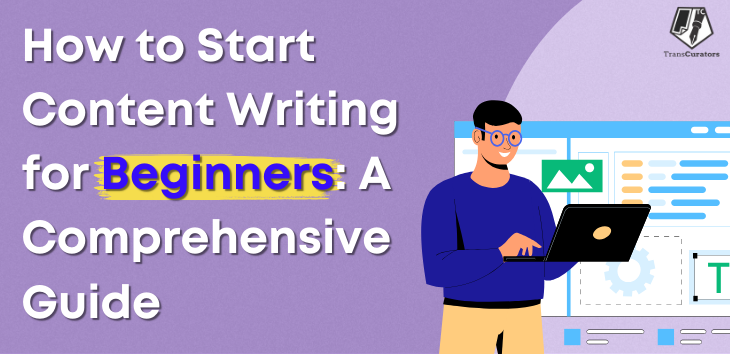
Are you someone who loves playing with words? Do you like to express ideas through writing? If so, content writing might be an excellent fit for you. Imagine using words to craft compelling narratives, provide valuable information, and connect with people worldwide through your words. Content writing offers you a world of creativity and opportunity, but starting can feel overwhelming. Where do you begin? How do you organise your writing to capture readers’ attention and keep them hooked? In this comprehensive guide, we’ll walk you through everything you need to know as a beginner in content writing and provide you with the tools and techniques you need to get started as a content writer . Are you ready to unleash your imagination and leave a mark with words? Let’s plunge in!
Understanding Content Writing
Content writing means creating helpful, entertaining, and valuable written content for specific audiences. It encompasses a variety of formats, like blog posts, articles, web content, and social media posts, which are intended to convey a message effectively. The primary objective is to attract, engage, and retain readers while fulfilling the content’s desired purpose: to inform, entertain, educate, or persuade. Content writers conduct extensive research to understand their target audience and use language that resonates with them. They prioritise clarity, consistency, and relevance while optimising material for search engines to improve visibility and reach. Ultimately, content writing aims to provide exciting narratives that engage and inspire action in the audience.
Essential Tips: How to Start Content Writing for Beginners
Content writing is a dynamic skill that blends creativity with strategic thinking. Whether you’re writing blog posts, website copy, articles, or social media content, following a structured approach can help you create compelling content consistently. Here’s a comprehensive step-by-step guide to content writing .
Step 1: Understand Your Audience
The initial step of writing is understanding your target audience. Determine who you’re writing for—their interests, preferences, and requirements. Surveys, social media analytics, and keyword research tools can all assist you in learning more about your target audience. To better understand your readers, create thorough audience personas. This understanding will guide your tone, style, and choice of topics. Understanding your audience can help you customise your content to resonate with them effectively.
Step 2: Choose a Relevant Topic
Once you’ve identified your target audience, select a topic that is both relevant and intriguing to them. Generate ideas based on current trends frequently asked for questions or gaps in existing information. Consider the purpose of your content, whether it is to educate, entertain, inspire, or convince, and make sure your topic matches that goal.
Step 3: Conduct Research
Before you begin writing, gather relevant facts and statistics to support your topic. Research from reliable sources, data, case studies, and examples to increase the credibility and depth of your work. To retain credibility, cite sources and verify the authenticity of the content.
Step 4: Create an Outline
Create an outline to organise your thoughts and information. A comprehensive outline helps structure your content logically and ensures that you cover all essential elements. Divide your information into parts or titles based on the many aspects of your topic. This strategy plan will assist you stay focused during the writing process.
Step 5: Write the Introduction
Begin your writing with an exciting introduction that piques the reader’s attention. Introduce the topic and explain what readers will learn or gain from reading further. An engaging start sets the tone for the rest of your content and persuades readers to continue.
Step 6: Develop the Body Content
Expand on the topic in the body of your content. Use the outline to provide a systematic explanation for each section or point. Deliver helpful information, ideas, or solutions to the audience’s interests or issues. Use clear, simple language and organise content into paragraphs to improve readability.
Step 7: Use Engaging Language
Engage your readers by using clear, simple, and conversational language. Avoid jargon or complex words unless necessary, and explain technical terms to ensure understanding. Use active voice to make your writing entertaining and direct, engaging the reader.
Step 8: Include Visuals and Examples
Use visuals, such as images, infographics, or videos, to illustrate your content’s key ideas or concepts. Visual content helps break up text-heavy sections, making your content more visually appealing and easier to understand. Use relevant examples or case studies to give real-world context and support your claims.
Step 9: Write a Strong Conclusion
Summarise your content’s essential points and conclude by pointing out the critical message. End with a call to action, encouraging readers to take the next step, such as subscribing to your blog, researching related content, or acting on your advice. A firm conclusion creates a lasting impression and promotes reader engagement.
Step 10: Edit and Proofread
Check the content for clarity, coherence, and uniformity. Check for grammar, punctuation, and spelling errors to ensure professionalism and readability. Analyse the flow of your content and rewrite sentences to improve clarity and impact. Consider asking for feedback from peers or utilising editing tools to enhance the quality of your work.
Step 11: Optimise for SEO (Search Engine Optimization)
If your content is intended for online platforms, optimise it to be search engine friendly by incorporating relevant keywords naturally throughout the text. Use meta descriptions, title tags, and headers to increase visibility and organic traffic: Prioritise readability and user experience over keyword density.
Step 12: Publish and Promote
Post your content on your preferred platform or website when you’re satisfied with it. Promote your content on social media, email newsletters, and other channels to reach your target audience. Use analytics tools to monitor its performance and alter your content strategy in response to feedback and data insights.
Following these steps will help you to create compelling and valuable content for your target audience. Remember, practice and constant growth are essential for mastering the art of content writing.
Tools for Content Writing
As a beginner, using the right tools can significantly enhance your content writing process:
- Grammarly : Helps you improve your writing by suggesting grammar, punctuation, and style corrections.
- Ahrefs : Assists with keyword research and SEO analysis to optimise your content for search engines.
- Canva : You can create visually appealing graphics and social media posts to complement your written content.
- Hemingway Editor : Highlights complex sentences and suggests improvements for readability.
Know more- Best AI Content Writing Tools
Starting your career in content writing can feel challenging, but with the proper steps, it becomes achievable and enjoyable. First, determine your target audience and what they want to read. To enhance your writing skills, practise writing regularly. Learn the basics of SEO to make your content stand out more. Use feedback to improve your work, and keep learning. Remember to write from the heart, stay true to your voice, and strive for clarity and engagement in your content. You can grow as a successful content writer while enjoying the process with effort and commitment. Are you ready to embark on your content writing journey? Get expert guidance, resources, and tailored opportunities for beginners at Transcurators . Start scripting your success story today!
Frequently Asked Questions
A1. Search job boards like Indeed and LinkedIn and specialised freelance platforms such as Upwork and Fiverr. Networking with professionals in the industry and joining content writing groups on social media can also help you find opportunities.
A2. Focus on creating blog posts, articles, and social media content initially, as these are commonly in demand and can help you build a diverse portfolio. Experiment with different niches to find what interests you and where your strengths lie.
A3. Useful tools include grammar checkers like Grammarly, SEO tools like Ahrefs or SEMrush, and content management systems like WordPress. Note-taking apps like Evernote and project management tools like Trello can also help organise your writing projects.
A4. To overcome writer’s block, take breaks to clear your mind, try writing exercises or prompts, and change your environment to stimulate creativity. Setting specific goals and deadlines can also provide structure and motivation.
A5. Create a blog or personal website to showcase your work. Include a variety of writing samples, such as blog posts, articles, and social media content. Volunteer to write for nonprofits or small businesses, and consider guest posting on established blogs to build your portfolio and gain exposure.
Latest Post

How to Start Your Own Content Writing Company

How to Become a Technical Writer: Step-by-Step Guide

What is the Importance of Technical Writing in 2024

What is Technical Writing: Definition, Examples, and Essential Steps

Explore the Different Types of Video Editing Techniques

Which Attributes Describe a Good Landing Page Experience

What are the Types of Content Marketing? Discover the Best Strategies

What are the Business Benefits of Content Marketing
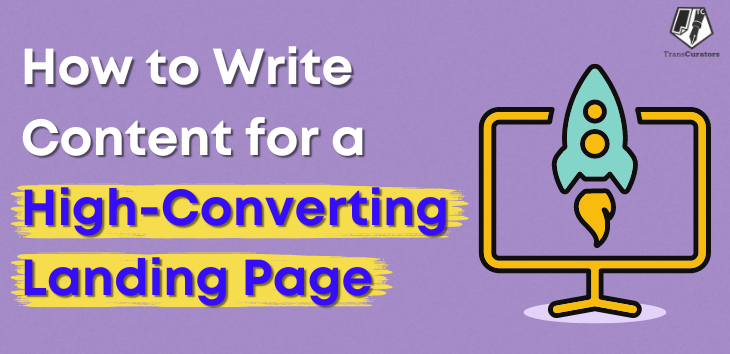
How to Write Content for a High-Converting Landing Page
- How it works

20 web content writing tips for beginners and pros

Are you a beginner looking for tips creating website content ? Or are you a pro hoping to optimize your search engine optimization writing skills? Or maybe you just want to write content faster. We’re here with some useful web content writing tips to remember when you’re trying to create engaging content, whether you’re a beginner or a pro. After all, if you’re writing content for a website, you want it to have as much of an impact as possible, leaving few corrections for those who have to go in and edit. There is certainly a learning curve to being a content writer, so don’t panic too much – we’re here to give you 20 valuable do's and don’ts for producing quality content.
1. DON’T plagiarize
This may be the most important tip we can give you so we’re putting it right at the top – do not plagiarize. There are a couple of bad scenarios here. If you’re writing for a client, the client won’t hire you again. If you’re creating a blog post for your personal website, you may not have to worry about losing your job but it will still backfire on you – your site can get penalized or even removed from search engines. So, in short, don’t do it.
2. DO break up your content.
For any content you write, use paragraphs, bullet points, headers, numbers – anything to boost your content on the readability scale. We are naturally programmed to digest smaller pieces of information and if it’s visually appealing, organized, and evenly spaced out, all the better.
3. DON’T write lengthy paragraphs.
While this goes along with our last tip, it bears repeating – don’t write lengthy paragraphs. If you have a lot of necessary information to include, break it up into paragraphs and include headers. Paragraphs generally shouldn’t be more than four to five lines long for easy readability.
4. DO know what the content’s goal is.
If you’ve been assigned an article, ask questions about the goal of the content – is it to insert as many affiliate links as possible? Promote a specific product or service? Sometimes the goal is to subtly promote an idea, product, service, or the client. You have to know the goal of the content before writing it.
5. DON’T use images you don’t have the (legal) right to use.
Unfortunately, you can’t take any pictures from the internet and use them in your article. If your article is well circulated, odds are the image’s creator is going to find out that you’re using their work. Any website using an unauthorized image can be sued. So, don’t do it.
6. DO create an outline.
It’s useful to create an outline for each piece of content you’re creating. While this isn’t absolutely necessary, it’s certainly helpful in terms of staying organized.
7. DON’T oversell a product or service.
Even if the goal of digital marketing is to promote a product or service, don’t oversell it. As a rule of thumb, the best way to go about promoting something when it comes to content writing is to be subtle. Plug it into the article on one or two occasions but don’t oversell – make it more of a helpful suggestion than a sales pitch.
8. DO use Calls-To-Action.
If the purpose of your content creation is conversion , you need to have an explicit call to action (CTA). CTAs are designed to get an immediate response from people visiting your website. For example, a pop-up asking for an email to sign up for a mailing list or advertising a special price if a customer makes a purchase within a few minutes. CTAs should be clear and obvious to the person visiting your website.
9. DON’T sound like a robot.

Insert a certain amount of personality into your content. While, yes, too much personality is off-putting and takes away from the information being presented in the article, sounding like a human being instead of a robot certainly decreases readability.
10. DO write for your target audience.
Keep your target audience in mind when creating your content. If you know that the majority of your audience is of a certain demographic, tailor your writing to them as much as you can.
11. DON’T repeat yourself.
While, yes, content can get a little repetitive, try not to repeat yourself too much throughout the article. Stick to your topic but make sure you keep it interesting without just repeating information.
12. DO answer your target audience’s questions.
Researching questions people have is helpful – there are often obvious questions associated with each topic you’re writing about that don’t always get an answer. Providing definitions and answering questions before getting too far into a topic is helpful, especially if the topic is complex.
Try selecting some of your existing audience to ask them what their most burning questions are. To save time writing those emails, try this Gmail mail merge with Google Sheets.
13. DON’T use complicated words.
We’re not talking about dumbing down your content – we know your readers are capable of understanding big words. But, for readability’s sake, keep your language relatively simple and don’t fill it with four-syllable words.
14. DO look for inspiration.
As long as you’re not plagiarizing, don’t be afraid to look for inspiration from other websites. Writer’s block is a real thing and there’s nothing wrong with admiring other people’s work to jog your creative juices.
15. DON’T forget to be creative with your anchor text.
Nobody likes a “click here” or “click me” button to link them to another page. Be creative and eliminate the need to use such bland anchor text . You’re better than that!
16. DO review your content before submitting it.
It is nearly guaranteed that there are some little mistakes in your content, no matter how much of a writing genius you are. Proofread everything you write before submitting it to a client or publishing it yourself and make sure you use a spell check. You could use an editor or english tutor to help you with this.
17. DON’T forget your keywords.
Don’t forget to include keywords and related keywords in your content as much as you can – without sounding unnatural or like a broken record, of course.
18. DO meet deadlines.
If you’re creating content for a client, do your best to meet deadlines. This is especially important if your client wishes to post on a regular schedule and if you want more work from them in the future.
19. DON’T forget to check for readability.
It’s important to make sure that your articles are easily readable and able to be scanned quickly. Keep in mind that a viewer will only scan your article for a few seconds before deciding to keep reading or moving onto something else.
20. DO your research.
Last but not least, do your research before beginning your content. You may not be entirely familiar with the topic at hand and doing some preliminary research saves you a lot of time in the writing process. We hope we have encouraged you to think differently about how you’re going to write your next epically creative, insightful, and all-around informative piece of content . If you’re a pro and already knew all our master tips, thanks for sticking around!
2 comments on “20 web content writing tips for beginners and pros”
Thanks This is so helpful.
Very helpful piece.

James is the co-founder of Content Snare - a software platform that helps professionals collect content & files from clients.
Once an automation engineer, his new priority is to help business owners regain their lives, be more productive and get more done in less time.

Content Writing for Beginners: 8 Tips to Attract and Hold Attention
Written by :
Martin Stokes
Published on :

“Content is king.”
High-quality written content helps build a company’s authority, develops its brand, and drives valuable organic traffic to its website.
Many organizations understand the power of blogging consistently , which is why content writing is still a valuable skill, even with artificial intelligence (AI) shaking things up.
As a content writer and editor with more than 10 years of experience, I’m going to share content writing tips for beginners that will help turn a rough first draft into a polished piece ready for submission.
What Is Content Writing?
Content writing is crafting purposeful, well-formulated, and persuasive texts tailored to resonate with a specific target audience .
It’s a cornerstone of SEO and content marketing that transcends words on a screen. It’s a strategic communication approach that combines creativity, psychology, and marketing insight to establish a meaningful connection with readers.
As a content writer, your goal is to strike the perfect balance between informative and entertaining. In a word, to engage.
Readers crave valuable insights, but also seek engaging content that holds their attention in a sea of distractions.
By blending wit, humor, and a sprinkle of personality into your writing, you can transform seemingly mundane topics into captivating narratives that guide, persuade, and convert readers for your client or business.
Get more leads with less effort.
If you want a steady flow of targeted leads, we’ve got a proven process for driving organic traffic and converting it into qualified leads.
Go Beyond Content Writing Basics to Stand Out
Now that you understand what content writing is, let’s look at several things you can do to improve the quality of your content.
1. Read the Type of Content You’d Like to Write.
You can’t be a chef without sampling different cuisines. Likewise, you can’t write content if you don’t consume the type of media you’d like to produce.
Every creator will tell you the same thing: YouTubers have their favorite videos, musicians listen to music all day, and illustrators take inspiration from others’ art.

By reading content you not only figure out what you’d like to write, but how you’d like to write it.
This doesn’t mean blatantly plagiarizing, of course, but rather identifying styles you like and discovering the methods successful writers use to hook, inform, entertain, and captivate readers.
Along the way, you’ll be able to spot trends, hone your writing skills, understand audience preferences, and, at the very least, become inspired.
2. Write. Then Write More.
Whether you’re writing for yourself or doing SEO copywriting for a paid client, the primary, best, and often most frustrating way to improve is by writing — a lot .
Like any skill, the difference between a mediocre practitioner and one who has mastered their craft generally comes down to one factor — how much time they’ve sunk into getting better at whatever they’re trying to do.
Content writing is no different.
Practice is the key. The longer you spend writing, the easier the process becomes. You become faster, more concise, and build confidence in your writing ability.
The goal isn’t to become Shakespeare — plenty of content writers out there can’t spell to save their lives — it’s to become technically proficient at your craft.
The better you write, the more you convert, and the higher rates you can charge prospective clients.
3. Keywords Are Your Friend. And Your Enemy.
A well-written piece of content without keywords is like a ship without a sail — sturdy and nice to look at, but it won’t take you anywhere.
Keywords are essential for every piece of content published on the internet — if the goal is to attract traffic. As a beginner content writer, learning this fact early is essential.
I’m assuming you already have a rudimentary understanding of what a keyword is and how it’s used.

But if you want to perfect content writing basics, do a deep dive into how Google interacts with keywords and how to find keywords that work for your goals .
There are a lot of guides out there. Here are a few to get you started:
- Moz’ Keyword Research Guide
- Backlinko’s Keyword Research Guide
- Semrush’s Keyword Research Guide
Although I know I just said that keywords are critical for a good piece of written content — and they are — don’t let them rule you.
Many content writers just starting out make the mistake of focusing all their attention on keywords and, in the process, stripping their writing of all voice, charm, and soul. This is a mistake.
Good content needs to consider SEO, but it also needs to be entertaining to the reader. It’s a fine line — too much focus on SEO and your work becomes a soulless flycatcher for Google that no one wants to read, but not enough means no one will find it.
4. Editing Is Where The Magic Happens.
Sitting down in front of a blank page is terrifying, and the only way to assuage that fear is by voluntarily diving headlong into it.
Likely, every word you write will be followed by some form of self-loathing or imposter syndrome.
This feeling is universal, and it doesn’t mean your work is terrible.
You see, the first draft of anything sucks.

It doesn’t matter if you’re John Steinbeck, Anne Rice, or a fledgling content writer like yourself.
The good news is that it doesn’t have to stay terrible. In fact, you can transmute that lead into gold with a solid editing process .
But don’t do this immediately after writing. The trick is forcing yourself to sit down and bang out a first draft, knowing it will be awful. Then shelve it for a day or two and revisit it with fresh eyes and a fresh mind.
This is where the magic happens. Suddenly you can see how to connect your disjointed thoughts, tighten your prose, and include links in an organic way you didn’t think possible during the initial writing process.
You’re also going to trim a lot of fat. Don’t be afraid of this. Good writing is concise. The fewer words you can use to articulate your thoughts, the better.
5. Add More Formatting.
No one likes reading a solid wall of text. It’s challenging to get through and makes it difficult to absorb complex ideas and retain information.
And let’s be honest, most people don’t actually read an entire blog post — they skim. There’s a lot of content out there, and no one has the time to read through a 2,000-word article, no matter how well it’s written.
By using clever formatting, you can guide readers to key points so they can find exactly what they’re looking for. And you’ll make your article more readable in the process.
This means using a combination of subheadings and other tricks to divide your content into more digestible sections.
For example, you can use bold and italics to emphasize certain information. Bullet points neatly list information, and short sentences and paragraphs make it easy for the eye to move down the page.
6. Leverage the Capabilities of AI.
At the start of this article, I said that content is king. But is it still king when AI can churn out 1,000 words in a few seconds?
Absolutely.
While AI is rapidly changing how content is created and consumed, the fundamental nature of content remains the same.
Remember, AI is not a content killer…

…it’s a content enhancer.
As a beginner content writer, your job isn’t to compete against AI, it’s to use it to enhance your articles, newsletters, and landing pages.
ChatGPT should be viewed as a tool rather than a competitor. Use it to help create an outline, organize your ideas, brainstorm killer headlines , or put together meta-descriptions that would otherwise have taken hours to write.
AI won’t be able to replicate your voice, personality, or branding fully — you know, the things that companies pay for — but it can drastically reduce the tedious aspects of content writing. So use it accordingly.
7. Don’t Write Alone.
Growing up, my mother was a grammar authoritarian who always corrected me when I spoke. She prides herself on knowing how to correctly use an Oxford comma, title and sentence case, and the difference between who and whom.
And while I appreciate her direction, these days, I simply use a variety of plugins, apps, and web tools to do the grammatical heavy lifting for me. After all, why should I use an abacus to split the bill when the calculator on my phone does the job infinitely better?
In addition to ChatGPT, there are many other tools that you can use to help you write the best possible content, and you should be using as many of them as possible.
Here are a few of my favorites:
- SEO Writing Assistant
- Capitalize My Title
For a comprehensive list, check out the best writing tools according to Semrush .
8. Proofread Everything Before You Hit Send.
No matter how many tools you use to tighten up your writing, mistakes will still slip through the cracks.
While the spelling and grammar check in Google Docs will find most errors, giving your work a final proofread before you send it to a client is always worthwhile.
Like editing, this means stepping back from your work, taking a breath, and returning to it with fresh eyes. I recommend scanning the article once for any glaring errors, then doing a slower, more thorough proofread.

If you have someone on hand who can proofread your work — or you happen to know my mother — so much the better. They’ll be able to spot things you missed and help get your article into the best possible shape it can be.
Writing Great Content Is Hard: Let Us Do It for You
Writing content is hard. It takes years of practice, knowledge, and expertise.
Luckily, we have all three of those in droves.
Our team is ready to help create original, engaging, and helpful content for your site. Not only do we have the best writers in the game, but we have a fantastic SEO team to handle the technical side of things.
If you want to regularly create blog content and watch your organic traffic skyrocket, get in touch with us today.
Schedule your free SEO and content marketing consultation .

A How-to blog for Writers

Content Writing for Beginners: 12+ Proven Hacks to Succeed
Want to make a career in content writing? But don’t know where to start? Read this guide on ‘ content writing for beginners’ to get started. You’ll also learn content writer resume tips , and how to find content writing jobs.
A successful content writer must have both writing aptitude and a grasp of the art. However, the extremely competitive and constantly changing trends in digital marketing call for a wider variety of abilities.
This field of writing consists of diverse options like web content writing, editorial writing, social media copywriting, podcast scripts, and much more.
Although content writing can take many forms, at its core, it produces information for digital platforms, in most cases, for marketing goals.
Through this article, I will discuss content writing for beginners, content writer resume tips, and how to find content writing jobs. But before we dive in, let’s check what’s content writing:
What is Content Writing?
The practice of organising, creating, and publishing web material is called content writing. Along with writing the information, content writers may also be expected to edit and promote it.
Inbound marketing techniques such as content writing draw customers to a certain brand, product, or website. Most businesses depend a lot more on digital marketing than on conventional marketing. Due to this, the demand for content writers has increased.
The role of a content writer depends on the industry they are working for and its requirements. For example, some businesses may want to focus on their social media strategies, while some may invest in e-books, guides, and other long-form resources. The role of a content writer is to produce high-quality material that reinforces a brand’s voice, appeals to the right audience and engages them.
Effective content can turn readers into prospects and those prospects into paying clients. Therefore, it’s undoubtedly crucial for your company’s bottom line that you can regularly provide informative, interesting content.
Content Writing for Beginners: Skills Required
Types of content writing .
While content writing can cover many other genres, you’ll mostly come across the following types of content writing:
I. Blogging:
Blogging is a key component of content writing. Since search engines favor websites that consistently release new information, blog posts help boost a website’s SEO rankings.
Use relevant keywords in your posts so that your content appears at the top of search results. Find out what phrases, words, or search terms your ideal customers are typing when browsing the web. There is some research involved here. You can use tools such as Google Keyword Planner, Ahrefs, SEMrush, and Moz.
II. Copywriting:
Copywriting is the science of strategically delivering words that get people to take action. It’s salesmanship through text. There’s more to it than that, though. Without copywriting, your informative content could be uninspired and unpersuasive. Copywriting includes e:
- Website copy
- Product descriptions
- Press releases
- Advertisements
- Sales collateral
- Infographics
All of these require copywriting skills. These messages should be carefully crafted while keeping in mind that they are the bedrock of your brand and perhaps the first thing potential buyers will read.
III. Social Media Posts
Social media is used by 59 percent of the world’s population. Businesses mark their presence on all the major social media platforms so that they reach their ideal audience. Social media writing involves developing timely, relevant, and platform-specific posts.
As a social media writer, you posts should be entertaining and interesting – it should encourage readers to click on an ad or read a blog. To write effectively for social media, you must be familiar with the peculiarities of each online platform.
For instance, a white paper about your products will probably not be well received on Facebook, but it might be a huge success on LinkedIn. Therefore, understanding the limitations of social media platforms is also crucial. Similarly, twitter only permits 280 characters per tweet.
IV. SEO Content Writing for Beginners
SEO, or search engine optimisation writing, is one of the most popular styles of content creation. SEO content writers are responsible for writing text that incorporates keywords that cause web pages to rank higher in search engine results pages, which is an essential component of many digital marketing tactics.
Informative articles with optimised headings and subheadings are frequently used in SEO content to increase reader engagement and obtain search engine rankings.
V. Technical writing
Comprehensive written descriptions and instructions on technical topics are referred to as technical writing. Content with tutorials or information on a software, technology, finance, and engineering products are a few examples of technical materials.
While some technical writers focus on writing for an expert audience, others excel at educating readers unfamiliar with the subject matter about highly complex concepts, frequently in the form of manuals, product descriptions, or FAQs.
Copywriter vs. Content Writer
Here are the key differences between copywriter and content writer:
| A content writer informs | A copywriter sells |
| Content writers drive | Copywriters turn that traffic into leads. |
| Content writing is a long-form of writing | Copywriting is generally a short writing style |
| Content writers are generally more focused on SEO | Copywriters create urgency and inspire response from readers |
| Content writers write longer-form content like: I) Blog posts II) Articles III) Newspaper pieces IV) Magazine features V) Press Releases VI) White papers VII) Magazines VIII) writing IX) | Copywriters write copy for: I) Website copy II) Product descriptions III) Press releases IV) Advertisements V) Sales collateral VI) Infographics VII) Press ads |
Content Writing for Beginners: Tips to Get Started
Content writing for beginners tips: scroll down to explore some of the most helpful content writing tips. These tips will help you understand industry trends and help you make more money as a content writer.
I. Go that Extra Mile for Research
First and foremost, read! Before writing this article, I ensured I had a fair understanding of the topic (content writing for beginners). I read with a critical eye – paid attention to how others writer conveyed information. Likewise, I kept my eye on the subject matter and writing style. This helped me gain topic-expertise.
II. Make your Content SEO-friendly
In your role as a content writer, you should learn about SEO too. Knowing how to write SEO-friendly material can help you ensure it ranks on all the platforms you use for publishing, including YouTube, Google, and social media sites like Instagram.
Even if your article is flawless but not SEO-optimised, there’s a high chance it will not come across your target audience. Additionally, you may utilise SEO to cover all relevant subtopics and write about the most asked questions associated with the topic
III. Write like a Human, not like a Robot
Put some personality into your content. While too much personality can detract readers from the main information, you cannot risk sounding like a robot. Make A Human Difference. You can do this by writing in a conversational tone.
The more you know about your audience, the better your conversation will be. Of course, you can use writing apps or editing tools to improve your content. But do not use these tools for content creation.
IV. Make Your Content Engaging
Content creation is not just about dumping information you find on the internet. There’s a lot more to it. If your article has the same content as any other article on the internet, what could cause your viewers to stay on your article? With every topic, you cover, ensure to deliver something new. Since your audience spends time on your website, make their visit worthwhile.
V. Proofread
Imagine writing “receipt” as “receipt,” publishing it, and having your audience read it. A nightmare, isn’t it?
To avoid getting trapped in such situations, proofread and edit your piece of writing as many times as possible. Furthermore, minor grammatical errors can make or break a reader’s perception of your brand. They might conclude your content isn’t as trustworthy and well-written as other articles on the web and turn to other sources for further information.
VI. Add Examples, Quotes, and References
Examples can help you put your advice into context, make a point, and show readers how to put your suggestion to use in their own lives. You must demonstrate your points to your readers with relevant examples, especially when writing about abstract subjects. Now that I’ve told you how important it is to show some examples let me do the same for this article!
1. Pepper Content’s Article on ‘ How to Blog and Make Money in 5 Ways ‘
This article by Pepper content is intriguing as it begins with “Can you make money blogging? Both experienced and amateur bloggers seek an answer to this question.”
The writer grabs the readers’ attention at the very beginning of the article. Also, the content uses keyword ‘make money blogging’ within the first sentence. This ensures optimisation for search engine as well.
2. An Instagram post by Neil Patel (carousel post)
Neil Patel, the co-founder of Crazy Egg and Hello Bar, recently shared a post on Instagram about his Search Marketing Course and attached reasons to get certified. In his carousel post, he used statistical information to convince his target audience why a certification in search marketing can bolster their career.
3. Brian Dean’s Video on How to become an SEO Expert in 2022
At the beginning of the video, Brian says, “the strategies and approaches that I’m about to share with you help me go from absolutely clueless about SEO to someone that entrepreneur recently called an SEO genius.”
That is excellent writing, and it encourages viewers to stick around. Why? Because it provides a sense of credibility and informs you that the information that follows did help someone succeed.
To create a well-rounded argument, you can also include original quotes from influential thinkers or associates. Even if you are an expert on a particular topic, consider quoting people who professionally belong to the field. It helps your audience feel more confident about the content you’ve written.
VI. Meet deadlines
In my experience as a content marketer, I got to work with a lot of content writers. They were good at writing content, but all of them struggled to meet the deadlines – despite setting the calendar on their own.
This is perhaps the most underrated content writing tips. But since this article is about ‘content writing for beginners,’ I believe the most important skills beginner content writers need is ‘time management.’ Meet deadlines if you’re creating content for a client. It’s especially significant if your client wishes to post regularly and you want them to continue working with you.
VII. Check Readability
Keep jagrons to a minimum. For readability’s sake, keep your language relatively simple and don’t fill it with complex words. Always check readability of your content. Articles should be easily readable and scannable. Readers will only skim your article for a few seconds before moving onto something else.
Make your content easier to read by using paragraphs, bullet points, headers, and numbers. The brain is naturally programmed to digest small chunks of information, especially if it is visually appealing, organized, and evenly spaced out.
VIII. Answer your Target Audience’s Questions:
When creating content, keep your target audience in mind. You should tailor your writing to your target audience if you know they belong to a specific demographic.
The best way to learn more about a topic is to do some research on what questions people have been asking about it. It is helpful to provide definitions of complex terminologies and answer basic questions before moving on to a complex sub-topic.
IX. Use CTAs
When creating content for conversion, you should include a clear call to action (CTA). A call to action is designed to get an immediate response from visitors to your website. A clear call to action entices visitors to respond. Be creative with your CTAs. Nobody likes a “click here” or “click me” text. Rather than generic anchor texts, use creative ones. Your skills are better than that!
Bonus Tips on Content Writing for Beginners:
How to get content writing jobs:.
If you want to start with content writing and develop a full-time career, make sure your writing abilities are on par. Read throughly on the topics you want to write on. Practice writing everyday and get your articles assessed by someone who has expertise in the field. Once you’ve acquired basic skill-set, send out pitches to target clients on LinkedIn, Upwork, and local businesses hiring content writers. Below are some you can use to find jobs as a content writer:
- Connect with digital marketers and content creators on Linked to find content writing job opportunities.
- Create profile on Upwork, Freelancer.com, Pepper Content, and similar websites to find content writing jobs for beginners.
- Companies that need the services of a freelancer often advertise on writer job boards. So, make sure to join these groups and forums. You can also join content writer groups on facebook.
- Contact bloggers or small business and tell them you are a freelance writer interested in helping them grow. It’s called pitching.
- Visit nearby digital marketing companies to begin networking. They will contact you when a client has contact requirement.
- Start establishing contacts as soon as you start writing online. Make a few writer friends. They might provide you with some work when they have an overflow so you can build your portfolio.
Content Writer Resume Tips
Your content writer resume should communicate different aspects of your professional experience, educational background, certifications, honours or awards, etc. You can further improvise the resume with:
- Your content writer resume should be professionally formatted
- In your resume, present your most relevant job experience
- Brag about your content writing skills, posts you’ve published, and other achievements.
- Use the reverse-chronological order for your content writer resume.
- Always limit the resume to one to two pages. Since content writing is a junior role, you don’t need to list your accomplishments on more than one page.
- Send your resume to the recruiter in PDF format to prevent possible formatting issues.
- If the recruiters wish to conduct an on-the-phone interview with you, you must include your telephone number on your professional writer’s resume.
- Keep the font size between 10 – 14 points
Content Writer Checklist:
Proofreading is an important part of writing process. After you’ve completed the article, sit with it, and check whether your content agrees on the following:
Content Writer for Beginners: FAQs
What is content writing example.
The practice of organising, creating, and publishing web material is referred to as content writing. Content writing is an umbrella term that includes many types of writing. Some examples of content writing include blogs, newsletters, social media posts, case studies, and more.

How to learn content writing for beginners?
If you are a budding writer, you can find several courses and helpful blogs on how to learn content writing for beginners. Apparently, the more you practice writing, the better you learn.
How can I start my content writing from home?
Content writing for beginners is not as complex. The best method to begin content writing from home is to start and grow a blog, following which you can start taking on freelance projects for online publications. Additionally, you can approach specific businesses and send content writing pitches.
How do I start content writing with no experience?
You can start content writing without experience. Get started with a blog, pick a niche that interest you, and publish few topics. You can use these published content pieces as samples to pitch to your target client. You can also write for family and friends to refine and polish your skills to become industry-ready.
5 thoughts on “Content Writing for Beginners: 12+ Proven Hacks to Succeed”
Indeed Good tips for newbie writer like me. I will follow your steps and see the results.
Pingback: Paraphrasing Tools: 6 Hacks to Write Unique Articles (Tools & Tips)
Pingback: 10 tips for compelling SEO content writing - BarnRaisers, LLC
Pingback: 31+ No-Fail Ways to Find Content Writer Jobs in 2023
These guides are informative. Thanks alot!
Leave a Comment Cancel Reply
Your email address will not be published. Required fields are marked *
Save my name, email, and website in this browser for the next time I comment.
- Trending Now
- Foundational Courses
- Data Science
- Practice Problem
- Machine Learning
- System Design
- DevOps Tutorial
Content Writing 101 | A Beginner’s Guide for Content Writer
Information flows very easily and the attention spans are getting really short in this revolutionary digital world which makes the ability to create content that grabs attention very valuable. But what is content writing and how can you master this skill to engage your audience and achieve the outcome that you desire? Here, we will discuss all the key aspects of content writing including types, skills required, and even career opportunities. So, let’s quickly get into the topic.
What is Content Writing and Who is a Content Writer?
Content writing is a skill that requires creating written information that is informative, interesting, and helpful to specific audiences in a clear, concise, and engaging manner. Blog posts, articles, website copy, social media posts, and email newsletters are some of its examples.
The one who possesses the above skill is known as a content writer. A content writer is a professional who creates written material for a variety of purposes online. They’re like the storytellers, educators, and brand voices of the digital world.
Not only writing but they are involved in multiple things like
- Proofreading and Editing the content piece,
- Analyzing the performance of their published content,
- Understanding the client’s requirements, managing the deadlines, and
- Taking care of SEO to rank their content.
Table of Content
Skills Required for Content Writing
Types of content.
- Types of Content Writers
- Creating Ideal Content
- How to be a Content Writer?
Final Thoughts
There are many types of content writers but all content writers need to inculcate the following basic skills to be excellent at their job.
1. Adaptability
The content writing world is constantly evolving, with new trends, platforms, and audience emerging preferences. Content writers should have the ability to adjust their style, voice, and approach to different formats, audiences, and platforms.
2. Grammar and Vocabulary
A solid grasp of grammar and vocabulary is non-negotiable because an understanding of sentence structure, tenses, punctuation, vocabulary, and other grammatical elements ensures that your writing is polished and professional.
3. Research Skills
Research is a content writer’s best friend as it enables a writer to gather information from various sources and present it in an organized and coherent manner adding depth and credibility to the writing. The writer should have an eye for credible sources while doing research. That makes their research skills stand out from the rest.
4. Creative Writing Skills
The foundation of content writing lies in the ability to express ideas clearly and engagingly. A good content writer has expertise in choosing the right words, constructing sentences, and telling stories that capture the reader’s attention.
5. Understanding of SEO (Search Engine Optimization)
In the digital age, knowing the basics of SEO is crucial for a content writer to incorporate relevant keywords, understand meta descriptions, and structure the content in a way that search engines can easily recognize and index.
Now that you have an overview of skills, it is the best time to know the types of content. Yes, there are types because what you read everywhere is not in the same tone or conveys the same message, right? So let’s read about them.
There are several pieces of content that writers have to prepare. Below we have listed some of the top types of content that you should be aware of while embarking on a journey of becoming a successful content writer.
1. Copywriting
Copywriting refers to the art of writing persuasive and compelling content to promote a product, service, or brand. To increase conversions and sales, it is necessary to create attractive headlines, appealing sales content, and effective calls to action.
2. 10x Content
10x content is a term invented by Rand Fishkin that refers to exceptionally high-quality content that provides ten times the value compared to other similar pieces. It goes beyond just providing information and aims to be comprehensive, unique, visually appealing, and highly shareable.
3. Listicles
Listicles are articles presented in a list format, typically featuring a catchy title like “Top 10 Tips” or “5 Ways to Improve.” They are popular because they concisely provide easily digestible information. Listicles often attract readers’ attention due to their organized structure and promise of quick takeaways.
4. Lead Magnets
Lead magnets as the name itself suggests, a piece of content that acts as a magnet for leads are valuable pieces of content that businesses offer to their audience in exchange for their contact information and are designed to attract potential customers and generate leads such as e-books, whitepapers, or webinars.
5. Evergreen Content
Evergreen content refers to timeless and enduring pieces of content that remain relevant and valuable over a long period and are not tied to specific trends or events, making it consistently useful for readers. Comprehensive guides, tutorials, or FAQs are good examples that continue to generate traffic.
6. Social Media
Social media content involves creating and sharing various forms of media, such as text, images, videos, or links, on social networking platforms. It aims to engage and interact with the target audience, build brand awareness, drive website traffic, and foster customer relationships.
After you have gained information on the types of content, we have prepared a list of types of content writers that top-notch companies hire today.
Types of Content Writers that Companies Hire
1. technical writer.
A writer who communicates complex technical information in a clear, concise, and user-friendly manner, often for specialized audiences is called a technical writers. They write
- User manuals
- Online help systems
- Training materials
- Technical specifications
- White papers and research reports
2. Ghostwriter
A writer who produces content for someone else who then takes credit as the author is considered a ghostwriter. Basically, you get paid for your write-ups but cannot take the credits. Ghostwriters are usually responsible for writing
- Books (fiction and nonfiction)
- Articles and blog posts
- Speeches and presentations
- Memoirs and biographies
- Social media content
3. Copywriter
A writer who creates persuasive text to promote products, services, or ideas, often to drive sales or engagement are the Copywriters. They create
- Advertisements (print, digital, social media)
- Website content
- Email marketing campaigns
- Product descriptions
- Sales letters and brochures
4. Brand Journalist
Brand journalists are those who create content that aligns with a company’s brand identity and values, often with a storytelling approach. They write:
- Brand stories and feature articles
- Case studies and customer testimonials
- Thought leadership pieces
- Blog posts and social media content
- Internal communications materials
5. Social Media Writer
These types of writers create engaging content specifically for social media platforms, tailored to each platform’s unique format and audience. They are offered to write the following content.
- Social media posts (text, images, videos)
- Engaging captions and text-based content
- Community management responses
- Social media ad copy
6. Email Writer
These writers craft effective emails that capture attention, drive action, and build relationships with subscribers. They write:
- Newsletters and email campaigns
- Welcome emails and onboarding sequences
- Promotional emails and sales offers
- Transactional emails (order confirmations, receipts)
- Customer service emails
7. Scriptwriter
A writer who creates scripts for various forms of media, including film, television, radio, podcasts, and video games. They write:
- Screenplays for movies and TV shows
- Radio and podcast scripts
- Video game narratives and dialogue
- Corporate videos and training scripts
- Commercials and advertising scripts
Best Practices for Creating Ideal Content
Now, here is your guide to writing compelling content along with the essential tools and strategies that will help you along.
1. Develop a Reader’s Persona
Imagine your ideal reader and understand their demographics, interests, needs, and challenges to understand your audience better and tailor your content to their specific preferences. This ensures that it connects with them, fostering a deeper connection.
Tools: HubSpot’s Make My Persona, Xtensio, UserForge
2. Craft an Effective Outline
A well-organized outline is like a roadmap ensuring your readers navigate smoothly through your content. That’s why, you should structure your content logically for clarity and flow and develop a strong outline that guides your writing and keeps you on track. This increases user interaction and enhances the readability of your content.
Tools: MindMeister, Coggle, Evernote
3. Include relevant Facts & Statistics
Back up your claims with accurate and reliable information from trustworthy sources to add credibility and authority to your writing. The incorporation of relevant facts and statistics strengthens your argument and builds trust with your audience.
Tools: Google Scholar, Statista, Pew Research Center
4. Let Visuals Tell Your Story
Visual elements are not just decoration but they are powerful storytellers that enrich your content. So integrate relevant and high-quality images, videos, and infographics to enhance your message, capture attention, and make your content visually impactful.
Tools: Canva, Adobe Creative Cloud, Unsplash
5. Clear Call to Action, Without Being Salesy
Guide your readers towards taking the desired action after reading your content. However, avoid sounding pushy or overly promotional. A clear call to action is like extending an invitation rather than making a sales pitch, encouraging a genuine response from your audience.
Tools: CoSchedule Headline Analyzer, Hemingway Editor, Grammarly
6. Make SEO-friendly Content
SEO refers to Search Engine Optimization, which means creating and improving content using techniques to increase its visibility on search engines. If you want to learn more about SEO, read the article: Search Engine Optimization | SEO: A Complete Tutorial . Remember, mastering SEO is like giving your content a passport to be discovered in the vast digital landscape.
Tools: Ahrefs, SEMrush, Google Search Console
7. Proofread, Edit, and Edit Again
Before publishing your content, carefully proofread and edit it to ensure clarity, conciseness, and error-free writing because the final editing stage is like adding the finishing touches to your masterpiece.
Tools: Grammarly, ProWritingAid, Hemingway Editor
What Courses or Qualifications are required to be a Content Writer?
While there’s no one-size-fits-all path to content writing. However, aspiring writers can explore options like renowned online courses on platforms like Udemy or Coursera . These online courses help you learn the basics of writing and enable you to kick-start your career.
In case, you are inclined towards taking the official degree road, bachelor programs can help you with that. You can opt for a Bachelor of Journalism and Mass Communication or B.A. honors in English/literature. These programs help you get a grasp of the language and gain insights into the plethora of writing career options available in the market.
By that time, here’s a quick guide on how you can become a demanding content writer easily.
- Identify your niche: Identify a specific industry or field where your knowledge and passion intersect. This will let you establish yourself as a valued authority.
- Read digital content: Continuously consuming high-quality online content across various platforms will give you an idea of how to write different content for different audiences.
- Build a portfolio: Actively develop a diverse portfolio showcasing your writing skillset and adaptability by creating samples for different content types and target audiences. You can use various free portfolio builder websites like WIX.
Content writing lets you to reach out to a wide range of people to spread knowledge and achieve your goals. To do all this effectively, you would require in-depth knowledge of skills and best practices, and this article contains it all. Remember that the path to content writing excellence is a never-ending cycle of learning, experimentation, and improvement but with commitment and passion, you can create meaningful content that leaves a lasting impression. So grab a pen or now a laptop as we are going digital, let your imagination run wild, and start writing! The world is ready to be enchanted by your distinct voice.
Please Login to comment...
Similar reads.
- Content Writing
Improve your Coding Skills with Practice
What kind of Experience do you want to share?
Inspire Your Success
Content Writing Tips for Beginners: Introduction to Content Writing 101
- Pinterest 406

Content Writing Tips for Beginners
1. don’t be overzealous, 2. edit, spellcheck & format properly, 3. always follow up, 4. make sure your pitch game is strong, 5. don’t get complacent once you get clients and money.

6. Create an Epic Blog or Freelance Writing Website
7. use project management system to stay organized, how to stay organized, 8. make sure your content has a good flow and structure.
- High-quality images
- Subheadings (H2, H3, and H4’s)
- Numbered lists or bullet lists
- Infographics
Have Structure
9. use links the right way, choose the right anchor text, 10. don’t be overly formal with your writing style, 11. always provide examples in your writing, 12. separate your work vs. client work, 13. always learn new skills , 14. make sure you niche down, 15. always have a plan for your writing business , 16. always end with a summary and call to action (cta) .
- Final Thoughts
- Wrapping it Up
- Next Steps
17. Engage and Grow Your Social Media
Faqs about content writing, how do i start content writing, how do you write a beginners guide, how do you write effective content.
- Have a headline that people HAVE to read.
- Create a hook in the beginning (tell a story, quote someone famous or have a compelling study).
- Do your research on the topic before you get started writing.
- Create an outline first and send to the client before writing the full article.
- Write your content in one sitting with minimal distractions. Stay focused on the goal!
- Edit, edit, edit. I can’t stress how important it is to edit your work before sending to the client.
- Proofread several times and read out loud.
- Do a final run through, use Grammarly, and read aloud to double check your content.
- Turn in early. This will make you stand out to editors and clients as a dependable writer.
- Submit to your client.
What is the salary of a content writer?
What skills should a content writer have.
- Adaptability
- Researching Capabilities
- Good understanding of SEO
- The ability to get focused
- Excellent time management
- Great editing skills
- Stay in demand

Ready to Write?
Click below to join my 100% FREE webinar: 3 Easy Ways to Land Freelance Writing Clients.
- Recent Posts
- Cold Pitching Tutorial For Freelance Writers – 5 EASY Steps to Land Clients! - March 25, 2021
- Upwork Proposal Tips For Copywriters - March 11, 2021
- Upwork Profile Tips - February 2, 2021
About Michael Leonard
My name is Michael and I'm the creator of Inspire Your Success. My goal is to give you the tools, resources, and inspiration to build an epic freelance writing business.
October 10, 2019 at 12:48 pm
Hemingway just doesn’t account for how Google interprets my content. Hemingway will help you become a more effective writer but it won’t help with SEO. I still use Hemingway every so often to make sure the mechanics of my writing are on point, but I’ve been relying on INK’s SEO functionality more lately.
October 10, 2019 at 6:03 pm
For sure — Hemingway isn’t perfect but it can definitely help. Thanks for reading!
February 28, 2020 at 5:31 am
Thank you for putting the earning so realistically. Other sites don’t mention how little you can earn in the beginning but here, you speak the truth. Thank you!
Budding Content Writer, https://randomandfine.com/
March 2, 2020 at 4:51 pm
No problem I’m happy to help!
Leave a Reply Cancel reply
Your email address will not be published. Required fields are marked *
CONTACT WORK WITH ME DISCLAIMER BLOG
Share with others.
10 Effective Content Writing Techniques for Beginners

Glenn Carstens-Peters / Unsplash.com
Main Takeaways:
- Content writing is the act of planning, writing, and editing web content for digital marketing purposes.
- Examples of content include podcasts, scripts, blog posts, email newsletters, etc.
- Good content can inspire readers’ trust, leading to more shares, backlinks, and sales.
- Specific content writing techniques can help improve your writing.
- Knowing your audience will help you create content that addresses their problems.
- Creating an outline is the first step in a content creation process.
- A strong content topic is essential for getting more clicks.
- Use accurate information to substantiate your points.
- Use images and videos to boost your content’s visual appeal.
Content writing doesn’t come easily to everyone. According to CMI , 32 percent of marketers think their content creation workflow is fair or poor. Another study suggests that 60 percent of people struggle to produce content consistently.
That’s where this post comes in. But before we discuss some effective content writing techniques to help you jumpstart your writing journey, let’s first understand what content writing is.
What is Content Writing?
Content writing involves planning, writing, and editing web content for digital marketing purposes. Such content could include blog posts, podcasts, scripts for videos, email newsletters, to name a few. Brands create content to engage, inform, or entertain their readers. But aside from bringing traffic to your site, it can also keep people on your page.
However, content writing can do much more than that. The best content usually gets your readers to trust you more.
Sixty percent of consumers feel positive about a company after reading custom content on its site. Meanwhile, 97 percent of participants said that bad content impacted their trust in a brand negatively.
Consumers’ trust leads to more shares, likes, backlinks — and, eventually, more sales. That’s one crucial reason businesses invest in content marketing .
But why should you learn it?
Why you Should Learn These Content Writing Techniques
The demand for content writers has risen steadily as more companies embrace digital marketing.
According to a 2019 SEMRush study, 40 percent of businesses outsource their content creation process. Furthermore, most of these companies (53 percent) hire others to handle their content writing , followed by graphic and video design.
That means you could have a steady source of income as a content writer. If you want to work as a freelancer, online platforms such as UpWork , Flexjobs , Fiverr contain several job listings.
However, specific content writing techniques are required to be eligible for some of these gigs.
What are the Different Content Writing Techniques?
1. know your target audience.
As straightforward the goal may sound, the same can’t be said of the process.
It starts with recognizing the things that your target audience might find appealing. For example, 80 percent of Gen Z are likely to buy products with a positive social or environmental impact.
After identifying your audience’s interest, consider the search terms they might use in a specific niche. Not only will this help you understand their question, but it’ll also provide a chance to solve their problem.
Providing value at zero cost offers a way to establish yourself as an expert in your field. This could help build trust over time.
2. Create an Outline
The first step to take in your content creation process is to create an outline. Not only does it keep your thoughts organized, but a strategy could also speed up your writing task.
Besides, an outline could give your writing a better structure. That’s because it provides a bird’s eye view of the content — something you can’t get when you’re already writing.
3. Choose a Strong Content Topic
A strong content topic sparks the readers’ interest and invites them to read the post from start to finish.
According to Copyblogger , 80 percent of people will read an article’s headline. However, only about 20 percent of those people will read the rest of the content.
That’s why choosing a strong or interesting content topic is significant.
Research and understand what your target readers are particularly interested in. You can do this by joining different online communities where your audience hangout.
You may also use tools like Google Trends or Buzzsumo to see what topics are trending online.
4. Tell a Story
Everyone loves a good story, and that’s not surprising.
It helps create content that’s so engaging that your audience hangs on to your every word. Storytelling turns an otherwise bland, forgettable, blog post into a captivating piece of writing.
A great story contains three essential elements — a character, conflict, and resolution.
Combine these three elements to create a relatable story with a little dose of entertainment factor. At the same time, your account should also be easy to read and follow.
Finally, proper research is vital. Insert facts and data into your story to make it more effective.
5. Make Your Ideas Flow Seamlessly
A good structure is an essential content writing technique . While your post may be as informative as ever, an unorganized and inefficient writing format can be challenging to read or enjoy.
Make sure that your ideas flow seamlessly within your content. Consider using transition words between sentences to improve readability.
You could also break down your content into smaller paragraphs with headlines to keep readers engaged.
Search engines such as Google reward back-end organization. It involves using the proper hierarchy when tagging headlines to maintain a well-structured article. For example, use H₁ for titles, H₂, H₃, and H₄ for subtitles.
6. Make Sure That you Understand Your Topic
Understanding the topic can be the most challenging aspect of content writing .
Along with grasping what you’re being asked to write, you must also figure out how you’re supposed to write it. You can then use the information to create content that readers will find useful.
Two questions are essential for understanding your topic. These are:
- What is the content’s purpose?
- Who is your audience?
You must determine whether your content aims to sell a product or service, inform readers, or entertain them. Also, a basic knowledge of your audience can help create more relevant content.
If you’re still unsure of how to proceed, you could seek help from others. For example, an industry expert could clarify some essential points in your writing.
7. Optimize Content for Readers and Search Engines
Content optimization begins with keyword research . Not only will it reveal how many people are using a search term, but you’ll also know your chances of ranking for the key phrase.
After that, you simply have to create your content around the key phrase and the related keywords. But that’s not enough. Whatever you write must also match Search Intent.
In other words, it must provide answers to someone searching for that specific keyword.
Luckily, several online tools can help with these processes. For example, you could use KWFinder for the keyword research aspect. Likewise, INK is a writing editor that can help you with the writing and optimizing part of the work.
8. Provide Accurate Information
One of the goals of content writing is to build trust with your audience. And that can only happen when you ensure that the information in your content is accurate.
As such, it would help if you link to other content that’ll substantiate a bold statement in your writing.
For example, you could begin a paragraph with the sentence, “ more marketers are shifting to podcast marketing .” Then, you could include a link from an authoritative source to back up that statement.
Besides, linking to other sources and content provides the search engine with more information about your content. So, it’ll know how to categorize it.
9. Use Images and Videos
Visuals can help readers retain more information.
People are likely to remember only 10 percent of content that they came across with three days ago. However, retention increases to 65 percent when you accompany the text with an image.
But it’s not just adding pictures. You could also use videos, diagrams, and infographics to illustrate your point. Besides, visual content can also help break up large chunks of text, along with subheadings and bulleted lists.
10. Be Persuasive
Persuasive writing aims to convince readers to believe an idea and perform a specific action.
While this form of writing is popular in ad campaigns, it can be useful in other content as well. These include editorials , proposals , brochures , reviews , criticisms , to name a few.
Persuasive content usually appeals to three things — credibility, emotion, and logic.
Besides citing sources, use quotes from industry experts and testimonials from clients to strengthen your argument. Also, appeal to emotion to create a sense of urgency and compel the audience to take specific actions.
Finally, use statistics and studies to build a logical argument in your writing.
Final Word: Start Applying these Content Writing Techniques
It’s no longer about churning out as many posts as possible. The quality of your content is critical. Besides driving organic traffic to a website, quality content can also convince readers of your trustworthiness.
So, start applying these techniques today.
Take time to know your audience before creating an article outline that’ll address their needs. Also, use strong headlines to draw readers in and keep them engaged.
In the end, you would successfully create content that’ll provide value to readers. And search engines will reward you for that.
Read More: 10 Content Writing Tips for Beginners and Entrepreneurs

Found this article interesting?
Let Edgy Universe know how much you appreciate this article by clicking the heart icon and by sharing this article on social media.
Edgy Universe
EDGY is an SEO incubator, forecaster, and support center for deep learning, technological advancement, and enterprise-level end-to-end search programs.

5 Reasons You and Your Business Should Snapchat

Useful Twitter Marketing Campaign Tactics for 2018

7 AI Marketing Tools to Help you get a Competitive Edge

How to Involve Fans and Customers in Your Content Creation Proces...
Here's What you can Do to Get More Social Media Shares

4 Techniques for Businesses to Beat Customer's Decision Paralysis

8 Tips for Your Content Marketing Cheat Sheet

Improving Your Brand Awareness With Impressions Marketing

5 Essential Elements of Successful Content Marketing Strategies

How to Create the Perfect Copywriting Portfolio

Upfluence: the All-in-One SaaS Tool for Influencer Marketing

Top 6 Reasons Why Most Paid Ads Launched Today Fail

A Guide to Personal Branding with Content Marketing

How to Write Headlines That Make for Viral Content

The 10 Best Digital Marketing Books for new Marketers

A Quick Guide to Land Your Dream SEO Jobs
Comments (2).

One has to be careful with the brokers on the internet now. Last year I was scammed in the binary trade option by a broker I met on Instagram. I invested $14000 which I lost, I couldn’t make a withdrawal and I slowly lost access to my trade account for 3 months I was frustrated and depressed. After a few months, I met Mrs Lisa who is A recovery expert that works in affiliation with the Federal Bureau of Investigation (FBI) and other law firm. she worked me through the process of getting my money back and all the extra bonus which I got during my trading. he can be of help to anyone who has a similar situation. You can contact him via her mail: Email Lisa.Eric @ proton.me WhatsApp +84 94 767 1524

Hello guys I wan to say this to whom it may concern. Investing in crypto was my husband ideal. I trade with sim ceypto platform not knowing they where sc!m and this made me lose almost all I had. Am only happy because I found help after reporting to Mrs Lisa Eric and she helped me recover all I lost to these fake crypto platform. My advice is that everyone need to be careful of the platform you deal with. If you have falling victim of these fake platform do not hesitate to file a complaint to Lisa via he mail ( Lisa.Eric @ proton.me ) she helped me and I believe she can help you too. Stay safe guys. You can visit WhatsApp +84 94 767 1524.
Link Copied Successfully
Sign in to access your personalized homepage, follow authors and topics you love, and clap for stories that matter to you.
By using our site you agree to our privacy policy.
- Article Writing Affordable Article Writing Services
- Blog Writing Blogs that optimise your visibility
- Product Description Website that optimise your visibility
- Website Writing Website that optimise your visibility
- Proofreading Website that optimise your visibility
- Translation Website that optimise your visibility
- Agriculture Affordable Article Writing Services
- Health & Beauty Blogs that optimise your visibility
- Automotive Website that optimise your visibility
- Sports & fitness Website that optimise your visibility
- Real Estate Website that optimise your visibility
- Entertainment Website that optimise your visibility
- Blogs Affordable Article Writing Services
- Samples Blogs that optimise your visibility
- Case Study Website that optimise your visibility
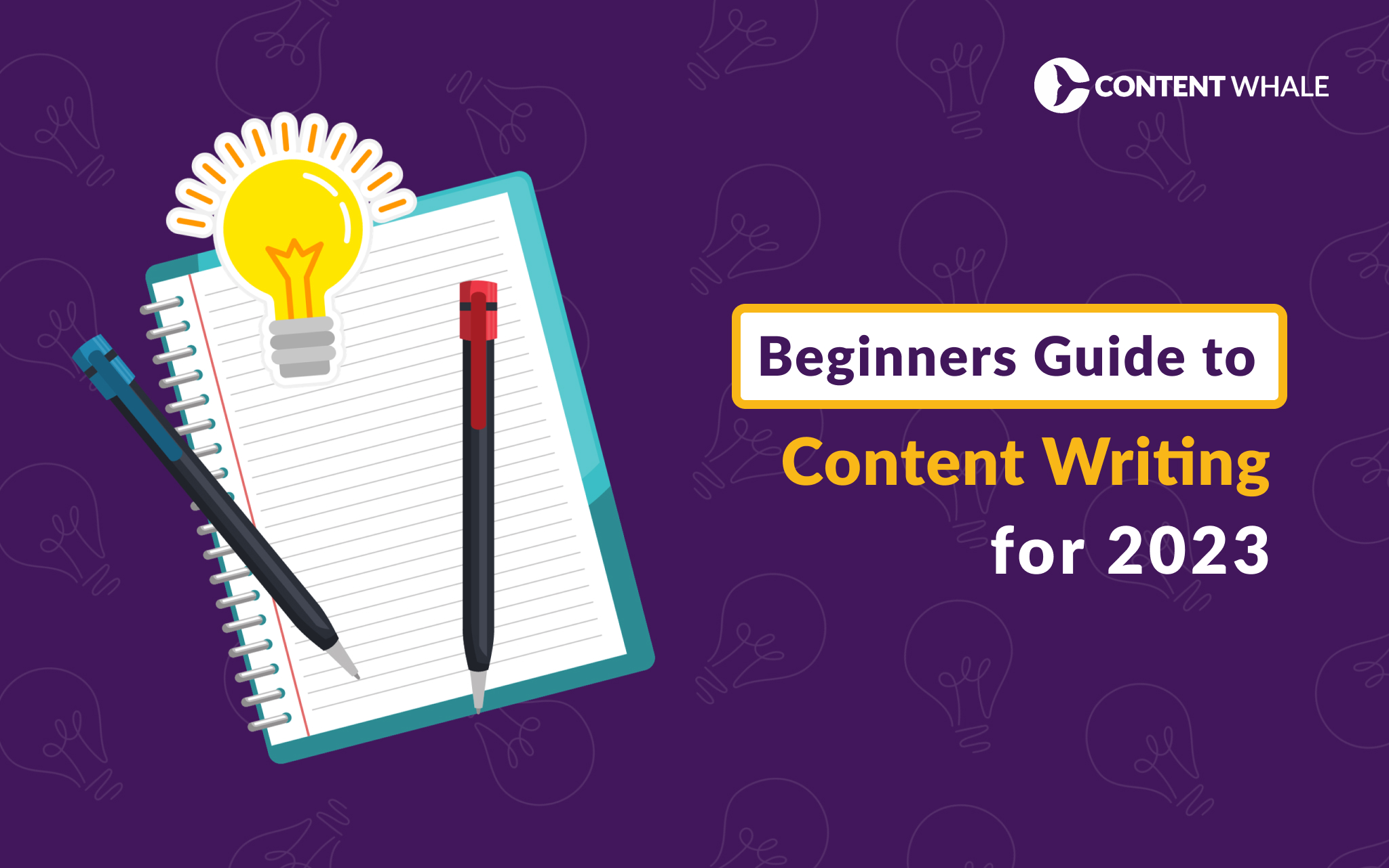
15 Content Writing Tips for Beginners in 2023
“You can’t just open a website and expect people to flood in. If you really want to succeed you have to create traffic.” – Joel Anderson, CEO, Walmart
Do you want to pursue your career as a content writer and are searching for a few amazing and important content writing tips? Well, we understand that you must be nervous about writing your content for the first time and are looking for some content writing tips to write amazing content.
We can relate to what you must be thinking.
However, as we move towards new technologies in 2023, it becomes increasingly important for beginners to stay updated with the latest techniques and trends. For example, you need to stay updated about AI tools to stay ahead of them in the content market.
So, continue with your dream to become a content writer without thinking about the results. And we are here to help you with a content writing guide to assist beginners in creating interesting and compelling content that will help them in the future.
15 Effective Content Writing Tips

Below are a few content writing tips to help you begin your career as a content writer.
1. Understanding your target audience
The first among many other content writing tips is to understand your target audience. It is the foundation of good content writing. Gaining knowledge of your target audience allows you to create content that connects with them deeper, thereby increasing traffic. Below is why understanding your target audience is important, and how you can do it:
- Statistics: Before starting to write, it is very important for you to get complete knowledge about the targeted audience’s gender, age, occupation, search intent, location, and any other important factors. Understanding these statistics lets you personalize your content to their unique traits and interests.
- Interests and preferences of the target audience: It would help to research your audience’s preferences and interests deeply. Know about their primary interests and the problems and obstacles they are facing.
You can learn a lot about your audience’s preferences by
- Conducting surveys
- Analyzing social media trends
- Engaging in conversations with them
This data will help you create content that addresses the requirements of the targeted audience and offers helpful solutions.
- Tonality and Language: People in different parts of the world understand different languages and prefer a certain tone. Before you start writing, try to understand which tone your target audience prefers. Is it formal or informal? Is it conversational or informative?
Once you understand how your target audience prefers to be addressed, you will be able to create personalized and relevant content.
- Content Consumption Patterns: Research where your target audience searches for content and which content form they search for more. Some of the content forms include the following:
- Social media updates
Knowing their preferred platforms and formats allows you to deliver content through channels where they are most likely to engage. It can also help you in deciding the word limit, layout, and visual elements you include in your content.
2. Learn how to do thorough research work.
The most important tip in the list of content writing tips is to do thorough research. Invest your time in collecting accurate data, solid evidence, and statistics to back up your claims. Use trustworthy sources and properly cite them, so that the audience starts trusting your content and visit again for future reference.
If you fail to do proper research, your content will not be informative and will not attract the audience, as you need to understand the topic before writing it yourself. Because if you do not understand the topic, how can you make your readers understand?
Adequate research ensures accuracy and allows you to add value to your readers’ lives by providing informed insights and viewpoints.
Strategize your research work according to the content requirements and demands of the clients. We present a content writing guide below, where you will learn how to research different content.
- Try to understand your audience’s demands and find answers directly from them. You can go through different social media platforms or search online to know their demands.
- Please review the content your competitors wrote and determine what is missing. After reading the content, you will understand what the audience wants from you and what is missing in your competitor’s content. Then you can add those things to your content to increase the traffic and surpass your competitors to rank higher on the search engine results page.
- You can also take the help of tools like Quora, AnswerThePublic, etc., to understand the interests and demands of your target audience.
Try using the tried and tested method of polls and surveys. This content writing guide will help you segregate the content you need to write and those you do not need to write to make your content more engaging.
3. Eye-catching headlines
First impressions are more important than ever in the online world. A compelling headline is essential for attracting the audience to your content. Create simple, catchy headlines that promise value or a solution to a problem.
When you start your career as a content writer, you usually focus on the content you must write, not the heading. It is where you commit a severe mistake. These content writing tips will save you from committing such mistakes. Your target audience will, first of all, read the heading before reading your content. And if your heading is not catchy or engaging, they will leave without reading the content.
A compelling headline is essential for attracting the audience to your content. Create simple, catchy headlines that promise value or a solution to a problem.
A few content writing tips on writing the headline are mentioned below:
- You should think and write at least 3 to 4 headlines and then choose the best one among those.
- Write a headline that is not just engaging but also catches the eye of the reader. The reader must be attracted to your content just by reading the headline, increasing traffic.
More people tend to visit your website when you follow this simple content writing guide and write eye-catching headlines.
4. Write an attractive first paragraph.
Hooking the audience with a compelling introduction after capturing their attention with your headline is important. The first paragraph should provide a concise overview of the subject matter and set the tone for the remainder of the piece.
You need to attract your audience and keep them engaged longer. No one will invest their precious time if your content is initially boring. People usually spend less than 15 seconds determining whether the content is interesting.
A few content writing guide to starting your content and increasing the traffic for a longer time is mentioned below:
- Start your content with a provoking question, as the reader might want an answer. The readers will read more if they think their doubts are being cleared. For example, Are you starting your career as a content writer?
- It isn’t easy to engage an audience for a longer time. It would help if you thought of innovative ideas and techniques to keep reading your content, like storytelling.
- Start your content with a bold statement. For example, I am working with the best content-writing company in India.
You can even choose any other technique that you could think of to attract the audience. Whatever technique you choose, the motive should be to engage the audience longer. These content writing tips will help you in the long run.

SEO optimization! You must have come across this word many times while going through the content writing tips. When you write SEO optimized content your visibility increases in the search engine results page.
It’s essential to optimize your content for search engines to make sure it reaches more people.
Use appropriate keywords throughout your writing, including the title, headings, and meta description. However, it is critical to strike a balance between SEO optimization and maintaining your writing’s organic structure and readability.
6. Determine what points to include in your content.
You must know what to write in your content to attract more audience. Therefore, this point from the list of content writing tips teaches you to create an outline before writing the content. When you neatly arrange your content in H1, H2, and H3, the audience understands your content better.
Would you like to read long paragraphs on a single topic? No, right? Content must be presented in pointers or bullet points, and headers must be arranged sequentially. It will engage the audience longer, increasing your website’s traffic.
To create an outstanding outline, you need to remember this content writing guide:
- Make sure that the outline is in sequence.
- Write it clearly and use short sentences and not longer ones.
- Keep it short and attractive. The reader must understand the content just by reading the pointers.
When you use outlines in your content, audiences tend to engage more. You just need to narrow down your content from long paragraphs into pointers with small paragraphs. If you follow these content writing tips, you will surely be successful.
7. Keep it Short and Simple
In today’s fast-paced world, readers do not have time to waste on boring and exaggerated content. Make it a point to respect your readers’ time and write valuable content that is concise and to the point. Remove unnecessary details and convey your message clearly and concisely. Try not to be repetitive, as it will make your content boring and disappoint the readers.
Keep in mind that short and to the point content does not imply that you can sacrifice content quality. It is all about reducing your content to its basic terms while still providing helpful and useful information.
8. Use words that everyone can understand.
Another point to be included in content writing tips is using simple words while writing content. You may know many complex terms which would make your sentences shorter, but the readers may not know.
This content writing guide includes a few reasons not to use complex terms in your content:
- You surely do not want to make your audience feel less intelligent by using difficult terms in your content.
- Next, what is the use of writing content if the audience needs to visit other pages to understand what you have written?
- The audience would be irritated and distracted by reading complex terms and will therefore leave your page, reducing the traffic.
You must follow this content writing guide to increase traffic and keep your audience engaged for longer.
9. Add images to your content.
You surely cannot miss this point if you seek content writing tips. In this modern era, incorporating pictures, videos, infographics, and other visual elements into your content can considerably improve its appeal. Visuals help to break up the text, simplify complex concepts, and create a visually attractive experience for the audience. Always ensure that your visual elements are relevant and of excellent quality.
You get attracted when you find an image in the content since it makes it even more interesting and engaging. Don’t you?
You must personalize the image according to the content and, if possible, try to include the sub-headings in the image. Following this content writing guide will make people stay longer on your website. And as the facts state, people remember more of what they see than the information they read.
Visuals are essential components of compelling content because they put your information into action, allowing your readers to:
- Understand the procedure easily
- Remember the sequence
- Understand new information without any hindrance.
Next, in line for a content writing guide is that you should know the benefits of using personalized images in your content.
- Concept maps help identify core concepts, organizational flow, and relationships between ideas.
- Using images such as flowcharts and infographics can assist students in understanding the logical relationships between concepts and variables.
- A picture may swiftly convey a lot of information.
Remembering these content writing tips will help you attract the target audience for a longer time.
10. Do not stuff keywords in your content.
Many writers commit the mistake of stuffing keywords in their content. Are you also one of them? If yes, then these content writing tips are for you. Surely, Keywords are an important part of writing content as it helps you in ranking higher on the search engine result page. However, it does not imply that you can stuff it anywhere in your content. Improper SEO practice (keyword stuffing) will result in less visibility of your content on the search engine results page.
When you include keywords appropriately or words similar to your keyword, then search engines like Google will help you rank higher on the search engine result page.
For example, digital, online, and web marketing are similar. When you write content for online marketing but use other similar words in your content, it will not affect your ranking on Google.
11. Use active voice and engaging words while writing content.

You must be thinking that this list of content-writing tips is never-ending. However, following all these tips while writing your content is very important. Always prefer using active voice over passive voice while writing content. When you use active voice and engaging words in your writing, it puts a positive impact on the readers.
Writing in an active voice helps you converse one-to-one with your audience. Readers who find your content conversational tend to spend more time reading it.
12. Concentrate and take deadlines seriously.
It is necessary to stay concentrated while writing well-researched content. Avoid delays by keeping your smartphone aside and avoid any other distractions. The best among all the content writing tips would be to start your writing by completing small tasks, and you’ll soon be able to complete the entire write-up on time.
Delivering the projects on time is very important to keep going in this field. When you deliver high-quality, original content within the deadline, the client’s would prefer to hire you for their future projects.
13. Give practical advice and examples.
We are sure these content writing tips will greatly help you pursue your writing career. When you provide practical examples to your readers, they connect easily and engage more with the content. You can also provide the target audience with useful tips, advice, or steps that they can imply in their life.
14. Make it a habit to proofread and edit your content.
Out of all the content writing tips, ensure that none of you misses this point. Editing and proofreading your content is very important to make your content free of errors. It is for beginners and veterans, as even they can commit mistakes.
After you complete your initial draft, make sure to follow the below-mentioned content writing guide:
- Look for any grammatical or spelling mistakes you could have made while typing
- If you have left extra spaces in between two words, correct it.
- Check if your content has any plagiarism. It is very important to write 100% plagiarism-free content.
After checking for all the above errors, read your content loudly. Doing this lets you hear what you have written, making correcting the tonality or incorrect sentence formation easier.
You can also take the help of your friend to proofread your content since another person is more likely to identify the mistakes you must not have noticed.
After you follow this content writing guide, you will surely develop high-quality, engaging, and clear content. You can use some proofreading tools like Grammarly, Slick Write, etc.
15. Include a conclusion
The last in the list of content writing tips is to write a conclusion after writing your content. In conclusion, you summarise the content you wrote in your article or blog.
It is very important to include a conclusion in your writing because the audience reads it to decide what action to take. You do not need to include statistics and facts while writing the conclusion. It is more like saying goodbye to your readers. Alternatively, you can include a call-to-action in the conclusion to promote the product or service.
You write your honest opinion and views while writing the conclusion, and the audience appreciates that originality from you.
What is the role of a content writer?

A few of the very important roles of content writers are mentioned below:
It is important for writer’s to be involved in an assignment right from the planning stage. You must understand the client’s brief, target audience, and search intent.
Writers must use simple words in their content, or the readers will not understand and leave the website. So, writers need to spend a lot of time writing engaging, original, readable, and high-quality content.
Edit and proofread
It is the most important step in writing content. When you finish writing the content, you need to edit and proofread your content as you may have made typing mistakes, grammatical errors, or used inappropriate tonality while writing the content.
While editing and proofreading, you rectify all your errors and make your content high-quality. It helps in increasing the reader’s engagement with your content.

We are sure you will be able to write quality content after reading the content writing tips. Content writing is growing very fast in this era, and if you are a digital marketer or a writer, these content writing guides will be very helpful, especially for beginners.
You should apply these content writing tips when you start writing your content. Do not forget to write high-quality, grammatically correct, 100% plagiarism-free, and engaging content to rank higher on the search engine result page. And the most important point among all the content writing tips is to edit and proofread your initial draft. At no cost should you ignore this tip. However, if you need blog writing assistance or blog writing services, please contact us here .

Hi, I talk about tips and tricks about content writing, storytelling, funneling, and more!
More details for blogs

35+ Best ChatGPT Prompts for Writing Informative Blogs in 2024
Discover the best ChatGPT prompts for writing blogs to streamline your content creation process. Learn how these blog writing prompts can enhance your productivity and spark creativity. Explore practical examples and ChatGPT writing tips to make the most out of this powerful AI writing tool. Whether you’re looking for ChatGPT blog ideas or ways to […]

5 Key Elements of a Successful Content Strategy
Discover the 5 key elements of a successful content strategy to boost your brand's visibility and engagement in 2024.

5 Advantages of Hiring a Professional Content Writer
Discover the top 5 benefits of hiring a professional content writer to enhance your content strategy and boost your business.
Need assistance with something
Speak with our expert right away to receive free service-related advice.
What Is Content Writing and Why It's Important [Beginners Guide]
Learn what content writing is and why it's important to implement it into your business to help you generate new customers at scale.
.jpg)
Srdjan Stojadinovic
Jan 20, 2023
![content writing beginners guide What Is Content Writing and Why It's Important [Beginners Guide]](https://cdn.prod.website-files.com/622611a2b23d0e6b270fba81/63cb58d04eaf4a3118d1f350_what-is-content-writing-and-why-its-important.png)
TABLE OF CONTENTS
Have you ever thought, " Why does everyone spend so much time and resources on content writing? "
Or, for that matter, " What is content writing? "
Answers to both questions relate to how people consume information nowadays.
Every day more and more communication is made over the internet.
The same goes for information in any shape of documents, articles, music, movies, social media, cover letters, etc.
Today we will discuss how content writing goes hand in hand with the information you share.
In addition, we will talk about why content writing is important and why you should consider implementing it to your business to help you generate new customers.
Let's begin.
What is Content Writing?
Content writing is the process of planning, writing, editing, and publishing digital documents.
The same definition can be used for hard copies, but in today's digital age, colloquially, it is related to online documents.
Content writing covers a wide range of end products, such as blog posts, social media posts, videos, etc.
What Are the Main Types of Content Writing?
Content writing comes in different shapes and forms. Your strategy dictates what type of content you will use and what platform is best suited for sharing.
So here are the most common types of content writing:
1. Blog Posts
Blog posts are one of the most common types of content writing.
Blogs are long written texts that help you present your idea with an in-depth explanation behind it, yet short enough for people to get the information they are looking for in a reasonable time.
2. Social Media Posts
Social media posts are a dynamic way to create content and share your ideas, knowledge, and news with your audience.
The whole point behind social media is connecting with your audience, partners, and potential customers, so they are perfect for starting discussions with.
Short and punchy posts that provide value and contain links to your main page can generate a lot of engagement.

3. Newsletters and Emails
Email lists allow content marketers to create ads with a higher level of personalization.
With emails suited to smaller groups of people or intended "just" for one person, they help you outreach your audience directly.
On the other hand, newsletters are content more focused on connecting with people familiar with your work and notifying them about it.
The main goal of newsletters and emails is to help us retain a loyal base of customers, and communicate with them “ one on one. ”
4. Video Content
At first glance, video content does not have a place in this list, but if you want to create an even midrange video, you need to write content scripts for it.
Scripts are just one part of the content needed for creating video clips or live podcasts.
In the case of infomercials or simple clips, text used by the narrator is a crucial piece.
5. White Papers & Ebooks
White papers are long-form articles focusing on deep diving into a selected subject.
Since White papers are focused more on education and problem-solving, they will include more technical details and examples for resolving described issues.
Writers need to balance the dry technical side of the subject and creative writing.
6. Brand Journalism
Brand journalism promotes brands using initiatives, plans, or policies as the center of the article.
Stories should lure in readers wanting more involvement with the company with the same goals.
Benefits of Content Writing
High-quality content can generate a large number of positive effects on the product or service you want to promote with it.
Let's visit the most important ones:
- Brand recognition - Online content helps you build and maintain brand recognition. Unlike traditional promotion strategies, online content is always available for anyone looking for your service, product, or product category.
- Generates organic traffic - Content developed within SEO guidelines can help you generate more traffic from search engines.
- Engages potential customers - High-quality content helps you build engagement with customers and peers in the same niche.
- Building credibility - People can easily judge your competence in a subject when reading your content.
Why Is Content Writing So Important?
Content writing has become one of the most important aspects of growth that can generate customers at scale nowadays.
This is because the quality of content on a website or blog can make or break its popularity. Good quality, informative, and keyword-rich content will attract more website visitors, leading to more business opportunities.
On the other hand, poor quality and uninteresting content will drive them away and never return.
Let us discuss why content writing is important for anyone engaged in online business.
1. Engage and Communicate With Your Audience
The content you create is an excellent way of starting conversations. People who find your content relevant will comment, share, and cite.
Content showing your competence can lead to people wanting to start discussions with you and meet you better, learn more, ask for advice, etc.
These conversations will help you meet your audience in an environment they feel comfortable and open to discussions.
2. Generate Leads and Sell Products or Services
Your content creates opportunities with people on opposite sides of the globe. Every connection you create is an opportunity for collaboration. You can make sales only if people know about you and your product. People usually are not fans of ads and commercials. Furthermore, some people have developed distrust towards them. So, content like blog posts is a great and non-salesy way to present your product.
3. Improve Your Organic Search Rankings
We are living in a digital era ruled by search engines.
According to PolleThePeople number 1 search result on Google takes 34% of organic traffic .

The top advice from all seasoned content writers is "Make your content Search engine optimized."
Part of your search engine ranking results is calculated from how your content is written and structured and how it serves the people’s search intent.
Another segment is how other people react to your content.
For example, a high number of visits, time spent consuming content, or a number of citations can be a significant boost to your rankings.
4. Build Brand Awareness
Building brand presence is a long process of starting conversations and placing advertisement content on different platforms.
Per Datareportal , 63% of the current population uses the internet.
Expressed in numbers, that is more than 5 Billion people with up 170 million new users monthly.

From statistics like this, you can see that there is always someone that needs to become more familiar with your brand.
Keeping your content available and up to date can go a long way in introducing products to the world.
5. Increase Your Website Traffic
Website traffic can be divided into two different groups: visitors and consumers/customers .
According to Statista.com , nearly 30% of web traffic across the globe is generated from search engines.
Still, 70% of people surf websites via recommendations on social networks or are customers loyal to the brand.
Conversions from the first to the second group are almost 100% using the high-end content you share.
What Is the Main Role of a Content Writer
The main goal of a content writer is to share knowledge, ideas, and promote a product, company, service, or web page by creating written content.
Content writer's work starts much earlier than the first word is written.
Content planning, audience, keyword, and topic research are crucial steps before any writing starts.
Well-written content is often a product of a large team of writers collaborating due to the amount of work needed to create a single piece of high-quality content.
How To Become a Content Writer
To get into content writing and start creating an excellent end product as a writer, first, you need to develop some skills and learn the process of it.
So here are the most important steps toward becoming a solid content writer:
- Research the topic you are writing about. This includes researching keywords you seek to target within the search results.
- Learn how to structure your writing and create a blog post outline that is easy to consume.
- Create a content plan , both micro on the level of one document and macro for the whole campaign.
- Learn the best SEO content optimization practices to help your content generate organic traffic.
- Ensure to structure your sentences properly , make them easy to read , and error-free.
Boost Your Content Writing Skills Using the Textcortex Add-on
We hope this article helped you better understand what content writing is and why it can be important for businesses that want to adapt it into their marketing strategy.
Even if you're not a natural writer, you can create excellent content with the help of AI writing software in no time.
One such useful tool is the TextCortex Chrome extension .
What is TextCortex?
TextCortex is a use-case module-based AI-powered writing tool that can help you generate almost any type of content you need.
TextCortex offers a wide range of features that can help you kick off your writing skills very quickly, by allowing you to:
🎯 Rewrite the original text for better clarity and readability
🎯Provide a concise overview of the original piece
🎯 Increase the length of your sentences to provide more detail
🎯Turn random ideas into complete sentences automatically.
🎯 Alter the narrative voice to suit a variety of purposes.
🎯 Write in a different language to reach more readers.
🎯 Produce blog posts based on a five-word prompt.
🎯Produce a variety of content types (60+ and counting)
To use the TextCortex add-on, you need to highlight the text you entered .
Once the rewriting menu shows up, you can either choose one of the available rewriting options or click the purple bubble to access AI templates .
TextCortex can take on a large portion of your writing process when you are on a tight schedule or want to spend more time improving other parts of your content.
Even when you are an experienced writer, you can run into writer’s block situations.
In these situations, TextCortex helps you get started and create content at scale.
If you want to polish it, you can use the rewriting feature to have a new take on the subject without losing the original idea.
Go ahead and test TextCortex's abilities with 10 free daily creations, and see how TextCortex simplifies all your content writing tasks.
Keep Learning
How To Learn Content Writing in 2023 - A Beginner's Guide
SEO Content Writing Checklist - 6 Points To Keep In Focus
5 Best Content Writing Apps Every Writer Should Try
One AI copilot that truly gets you.
Connect multiple data sources, define the voice for your AI and taste what it feels like to have a fully-personalized AI copilot on 50,000+ platforms.
Did you like this article? Explore a few more related posts.
.jpg)
46 Email Marketing Quotes To Inspire You in 2024

How Can Content Writing Tools Change the Way We Write Content

6 Best AI Tools for Blogging To Try in 2024
Questions answers..
TextCortex is a powerful AI-powered writing tool that can help you reduce your writing time, handle big tasks, and create high-quality content without errors. With its customizable platform, personalized intelligence experience, advanced writing and research capabilities, and error-free content, TextCortex is the perfect tool for creative professionals who want to be a creative force in their industry.
Our AI copilot learned how to write from more than 3 billion sentences and has the ability to create unique content. However, fact-checking is something which still requires a human approval.
TextCortex supports more than 25 languages including English, Dutch, German, Ukranian, Romanian, Spanish, Portuguese, French, Italian.
Yes, TextCortex is completely free to use with all of its features. When you sign up, you receive 100 free creations. Then you will receive 20 recurring creations every day on the free plan.
Yes, we have a Text Generation API, please talk to us directly to implement it. You can reach out to us at [email protected]
Account sharing is not allowed. If you have a need for more than 5 seats for an account, you can directly contact us at [email protected]
Yes, TextCortex offers 14-day free trial for users to try out all features extensively with higher number of generations. But keep in mind that you can already try everything with the free plan. There is no feature that is locked behind a premium plan.
Overall, TextCortex AI has over 1000 five-star reviews on reputable review sites such as G2, Trustpilot and Capterra.
TextCortex learns and adapts to your unique writing style and knowledge, making it easier for you to write high-quality & personalized content.
Your premium features will be available until the end of your subscription date, then your account plan will be set to Free plan.
General Questions
Your ai copilot is ready to collaborate with you..
Connect your knowledge, customize the style and start collaborating with your AI copilot.

How to become an awesome content writer (beginner’s guide)
Discover key insights on content writing in the digital age, balancing AI innovation and human touch. Essential guide for those aspiring to professional writing.

Stella Estee Samantha
In 2023, content writers remain crucial in creating engaging content that builds audience relationships and drives revenue, standing out even amidst AI's content creation capabilities. Their unique human touch adds value that AI alone cannot replicate.
This role is especially important considering reading trends. A survey indicates that while the average person reads for only about 20 minutes daily, top articles are often lengthy, exceeding 5,700 words. This highlights the need for engaging, well-crafted content. In the digital age, where publications are key to attracting traffic and establishing business credibility, the skill of a content writer becomes indispensable in improving a brand’s image and standing out in the competitive digital marketplace.
How to become a content writer?
What is a content writer, what does a content writer do, what skills does a content writer need, how much money do content writers make, how to become a content writer with no experien, dive in learning, identify your niche, maximize online presence, build a portfolio, start pitching.
Being a content writer involves more than just decent writing skills. Content writers must have the ability to turn any piece of information into something digestible and engaging for audiences.
With AI tools, writers can enhance their efficiency in research, generate ideas, and even refine grammar and style. AI assists in creating drafts faster, allowing writers to focus more on adding unique insights and creativity.
Furthermore, a content writer is accountable for creating well-written copy for your blog, social media account, newsletter, whitepaper, e-book, or even brochure. Anything that involves the written word for marketing purposes is likely to fall into the realm of content writing. The role is a part of a marketing team, but is specifically in charge of coming up with creative and compelling stories for the audience.

A content writer’s goal is to get audiences to take a chance on a specific product by creating purpose and value around the product or brand. They are crucial in turning curious visitors into loyal customers by pushing out first-rate content. Oftentimes, the best outcome is to have search engines rank your content as among the top results when an internet user searches for a keyword.
In essence, content writers create, manage, and distribute content and ensure that this content is optimized for search engines in order to drive traffic to the site. Most importantly, a content writer must identify a customer's problem and resolve it with a solution.
Many say that there is no secret formula to be a great content writer. However, there are certain skill sets that will no doubt make you a valuable asset to any marketing team. If you can master these skills and apply them to your work, you will be ready to kick off your career as a content writer.
1. Hook readers from the very first sentence
The average person’s attention span is only eight seconds . If your potential audience sees something that doesn’t grab their immediate attention, your content will be pointless. That’s why it’s essential to create an eye-catching headline and a strong hook at the start of any content.
2. Apply guided brand tone and voice
Every brand has its own way of conveying a message to its audience. Some skew more casual and personal, whereas others have a house style that demands technicality and objectivity. A good content writer has to be able to adapt to any writing style. Furthermore, they must be able to transform data into different formats, while still matching the brand’s voice.
3. Pay attention to details
What if you read an article and found a typo? Right off the bat, you would feel that the credibility of the content has dipped at least slightly. Trust us, you do not want your audience to feel that way. Therefore, it’s crucial to proofread and polish any words or sentences that might sound vague or questionable, so as to present your company as a credible, legitimate one.
4. Understand search engine optimization (SEO)
In this internet era, much of how well your content performs is reliant on how well it performs in search engines. To get people to read your article, one of the best ways is to have it rank highly on the search engine. A basic understanding of SEO, WordPress, and coding languages will also help you to gain plus points from any recruiter.
5. Understanding AI in Writing
Content writers can also use free AI tools like ChatGPT. These tools assist in research, proofreading for tone, style, and grammar, and suggesting creative ideas. Using AI like ChatGPT is not only cost-effective but also enhances the quality of writing.
Mastering AI tools in writing can make a content writer's work stand out. It speeds up the writing process, ensuring quick delivery of high-quality content. This skill can differentiate a writer from others, making them more attractive to employers and clients.
6. Be creative
There are billions of articles on the internet, and many of them are just reproductions of other articles. Hence, a content writer must possess the skill to turn ordinary information into brand new interpretations that capture a reader’s attention and keep them engaged and interested. It takes a lot of creativity to create valuable content that stands out.
How to become a content writer with no experience?

For someone who has no experience, it is common to wonder, where to start. Luckily, nowadays, there are accessible resources to learn how to write professionally and earn a living.
Start with writing daily for at least one hour to build a habit. Take time to do research, craft a story, and proofread it. The more you practice, the more you learn, and your chances to get a paid assignment grow.
To get your foot in the door, you may enroll in one of the free courses and tutorials in Hubspot Academy , LinkedIn Learning , or Skillshare . They will make you familiar with content writing basics, and you will receive a certificate at the end.
Do you struggle with finding the right words? The good news is there are plenty of free writing tools that can help you create great copy, avoid errors, and work more productively. For instance, if you're looking for an alternative word or phrase, Thesaurus.com will offer you synonyms to choose from.
Checking grammar is crucial and tools like Grammarly and ChatGPT are great for this. Grammarly, available as a free browser extension or online editor, offers basic corrections. Its premium version gives advanced suggestions and checks for plagiarism.
ChatGPT can help with grammar and also refine style and tone. You can use prompts like 'Can you check this text for grammar errors?' or 'Please make this text sound more professional.' These tools ensure your writing is error-free and cater to a wide range of needs, suitable for writers of all levels.

Do you want to stand out from other writers? To do so, choose a niche and focus on it. For example, if your main topic is marketing, you should write about it as soon as possible. It will help you to stay up-to-date with trends and become an expert in your field.
You can start with any topic you are passionate about. But if you are in doubt, here is our overview of the best-paying freelance writing niches. You can also focus on specific content types, such as writing case studies, blog posts, or whitepapers.
Joining writer communities is another great way to dive into the writer's market and make connections. It can help you explore job opportunities, meet like-minded people to exchange experience, and grow as a professional. Keep your eyes open for opportunities that match your interests. It will make content writing truly exciting!

Once you have your area of expertise, it’s time to publish your work. It is easier than may seem at first glance. Platforms like Medium or LinkedIn are great starting points. They simplify the process by taking care of technical aspects, allowing you to focus solely on writing. Medium is an open platform for sharing on any topic, while LinkedIn lets you build an audience and connect with industry experts.
For those seeking more control, starting a self-hosted blog is a good strategy. It showcases your work and demonstrates your SEO skills by managing your site's visibility in search engines. However, this comes with the responsibility of handling technical issues.
Remember, whether on a self-hosted blog or platforms like Medium and LinkedIn, it's crucial to actively share your work. Write at least one article per week to maintain engagement with your audience. Your blog or online presence is not just a portfolio; it's a tool to market yourself as a writer and improve your visibility in Google searches for related keywords.
A strong portfolio is another ticket to getting paid gigs.
This portfolio may include articles, social media captions, and so on — anything that demonstrates how well you can create copy and content. An additional tip: most employers seek content writers who don’t just write well, but can also create compelling stories, so that their business is seen as a solution provider and not just a business.
Starting a career as a content writer creates many further opportunities. Within this career progression, you could become an editor, or work in a more specific field such as user experience (UX) as a UX writer, SEO content writer, or even a copywriter.

Once you are done with the training and building a portfolio, it’s time to look for assignments. Start with making a list of websites that may be potentially interested in a topic you cover. Contact the editor and pitch your idea, explaining why the audience would be interested.
Don’t worry if you don’t earn a fortune straight away. Focus on building connections and receiving positive reviews. If clients are happy with your work, they are likely to come back and recommend you to others. With time, you will decide on what rates are reasonable.
Guest posting on blogs and websites with an established audience is another way to get exposure and build trust with potential clients. Popular bloggers often do not have enough time to write posts regularly or look for fresh ideas. For a beginner, this is a chance to show your skills and learn from someone more experienced.

Content writers can earn enough income to make this profession their full-time work. According to Indeed , the average content writer in the US earns US$3,719.
There are largely four factors that influence a content writer’s earning: years of experience, industry expertise, language, and content output. Naturally, writers with extensive knowledge about a particular industry will be able to produce more insightful stories, and they’ll be able to command a higher price tag.
Producing content in English language to cater to the international audience would more likely fetch you better rates as well, as compared to serving the local audience with native language. When it comes to content output, you can check some of the high-paying rates here .
As this guide reveals, while pursuing content goals, it's crucial to focus on producing human-centric content. This approach not only fulfills objectives but also creates meaningful connections with the audience.
Remember, the essence of content writing lies in its ability to touch lives and engage readers on a personal level. Balancing strategic goals with the human element ensures your content remains relevant, impactful, and genuinely resonant.
ContentGrow is a freelance writer's secret weapon for landing vetted inbound clients. The platform matches each client with niche-appropriate writers at preferred rates. Sign up to get your invite and free portfolio here .

Sign up for more like this.
Content Writing For Beginners: 6 Tips to Take Note

Content writing includes all processes related to the writing and editing of any written material that is later used for marketing purposes.
People who deal with content writing, and especially those who are just starting out, often look for the easiest but also the most effective ways to become even better in their work.
In addition to being organized and well-planned, well-created content must interest your readers, be relevant, and above all, be clear.
There are certain tips useful for beginners as they are like sponges that absorb information and learn constantly.
Check these 6 noteworthy tips when it comes to content writing for beginners. Use them to become the content writer you always knew you could be.
1. Use pop ups to highlight offers and be more engaging to your readers
Pop ups are intended for anyone who deals with online marketing. Or anyone who wants to add a certain flavor to their content presentation.
These windows will appear to your visitors at a certain moment. Plus, some amazing offers and encourage them to take action.
As one of the ways to make your content more relevant, these windows fit perfectly into every concept that is based on attracting the attention of readers.
In order to create amazing pop ups for your website, for example, you can use various tools.
Poptin is one of these tools .
Poptin allows you to make incredible pop ups . The purpose is to engage your visitors and to do it all very easily using its highly customizable drag and drop editor.
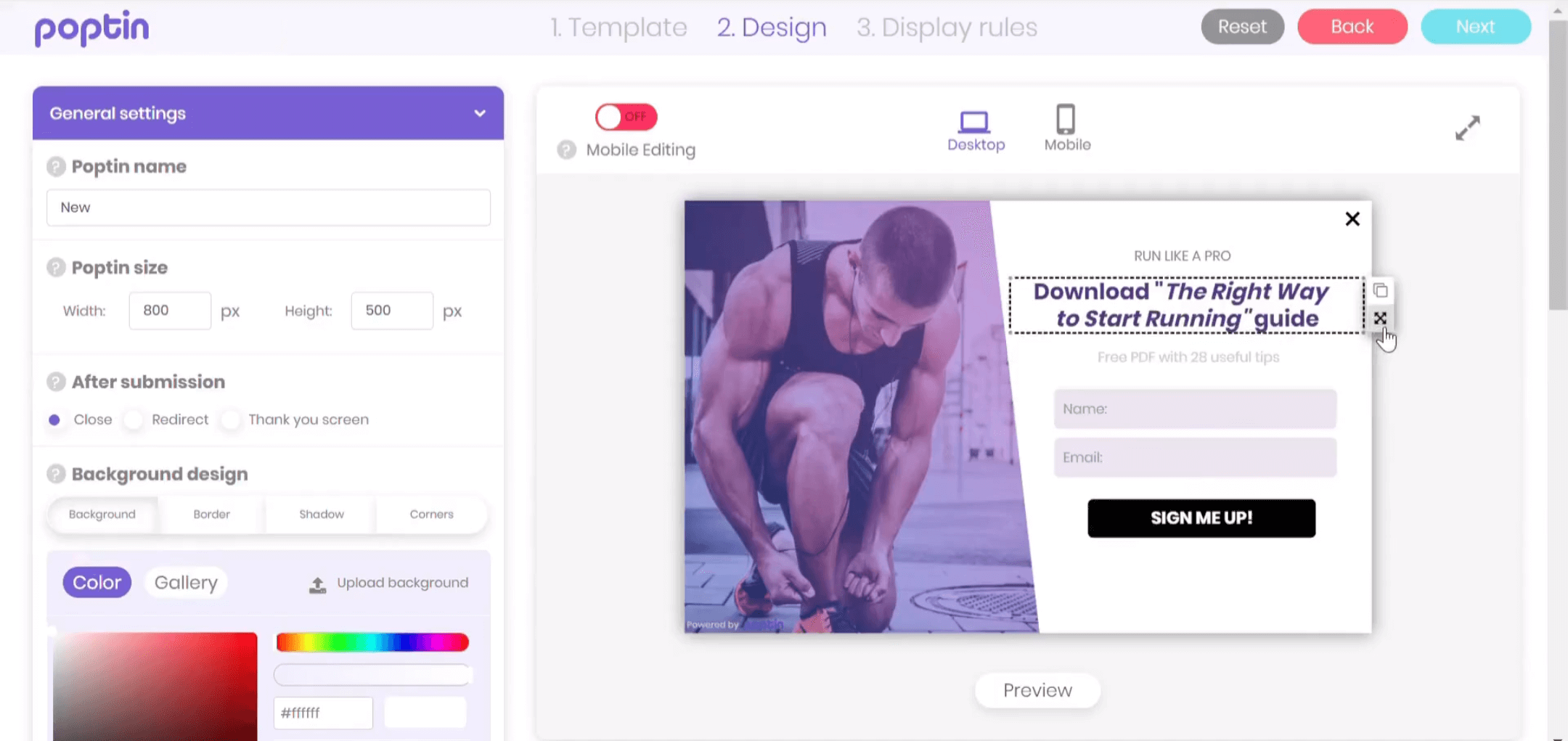
It offers you the possibility to edit your window by changing its colors, font sizes, removing fields, adding images, and similar or you can use their ready-to-use templates to speed up the process.
Contrary to some people’s beliefs, popups can be interesting and very useful.
With the help of certain triggers like exit-intent , after a certain percentage scrolled, after visiting a certain number of pages, on-click, and more, activate your pop ups and your visitors will be instantly engaged with the right offers.
This can be a useful tip for someone who wants to attract attention and to try a high-quality tool for this purpose and learn something new.
2. Do your keyword research but be wary of keyword stuffing
Keywords are basically the main topics, words, and phrases, that you plan to cover in your piece of writing and that people type in their search engines when they want to find something in particular.
It is of high importance to include important, appropriate keywords to make your content more valuable and searchable. But it is also important not to overdo it and make your piece of writing look suspicious.
If you don’t want to leave this balance to chance, use some of the keyword research software that can help you find adequate keywords such as the marketing toolkit called SEMrush that provides traffic-driven keywords.
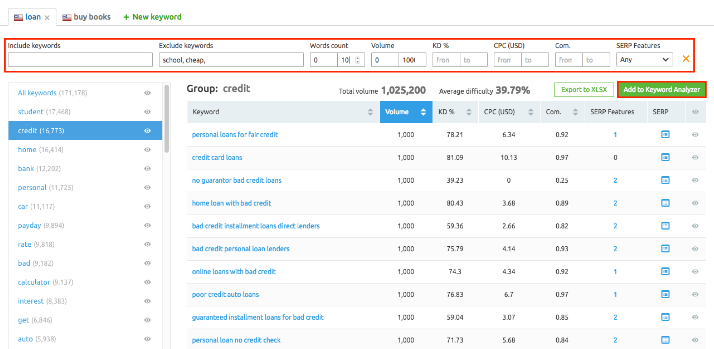
By using its keyword analyzer, you will always be updated and able to find proper keywords for your website from its extended database to improve your SEO.
Include keywords in the following segments of your content:
- The page title – the main subject of your page and it actually explains what your content is about
- Subheadings – these are the main parts of your content that make it easier for your readers to go through all the content by pausing and absorbing piece by piece of what they read, they allow them to scan your content
- Meta descriptions – or in other words tags, they give a brief summary of your content that encourages people to visit your website
- The content itself – as we already mentioned, it is important to pay attention to keyword stuffing so do not use keywords in every other sentence but use the main keyword at the beginning or use variations of that keyword throughout the content.
Besides these, you can use keywords in image titles, links, and similar.
Depending on what people need, how relevant your content is, and how easy it is to get to it, keywords are the primary thing to explore so that you can learn to use them in the right way.
3. Organize your content and don’t neglect to format
First and foremost, your content must be easy to read, non-confusing, and well-distributed within the entire structure.
Most visitors first read the title, perhaps the opening paragraph, and then continue to scan the entire text looking for a certain value, so it is important to format it and make it easier to skim.
In terms of formatting, add the following:
- Bold and italics to emphasize certain parts
- Bulleted and numbered lists if you want to list certain items
- Gaps in between paragraphs and in between sentences for clarity
These are all important for your visitors because they do not want to waste time and want to quickly look at everything that interests them and what is of value to them, so be careful.
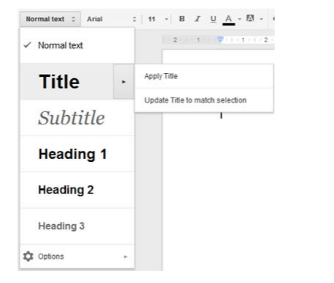
Source: GSuiteTips
People also do not like to read long texts but they prefer short paragraphs, clear sentences, and above all, it is important that the content is relatable, interesting, and informative.
As a beginner, you should also pay attention to word count.
They say that on average the best text length is between 1500 and 2500 words.
It is only important that the minimum is somewhere between 500 and 1000 in order for the text to be positively ranked.
Of course, it depends on the topic and the audience you are addressing, but you will already see it for yourself when you start writing.
4. Create an interesting headline and entice your readers
The headline is especially important because it is the first thing your visitors will see and pay attention to, so you need to make it as compelling as possible.
It needs to be eye-catching, to sound believable, to not be misleading and too long.
Use your main keyword in it to help Google rank it higher in search engines, active verbs to sound more powerful, and if you’re still not sure what is required of you, visit some of the tools like HeadlineAnalyzer :

Creating a strong headline should always be your first concern. The first paragraph is also critical. It decides whether the reader will continue to read the whole text or not.
Be creative, and write thoughtfully from the start.
5. Proofread your content and be maximally professional
Grammar and spelling mistakes are actually not that uncommon. Especially when it comes to various kinds of writing material that are on the Internet nowadays.
So, prove that you are a professional and proofread your texts before you post them.
Pay attention to typos. Read your content a couple of times until you are sure that everything seems correct and logical.
Of course, sometimes a small mistake will slip away, but you can spot most of them right away . You can find various tools o n the Internet . O ne of them is an app called Hemingway Editor :
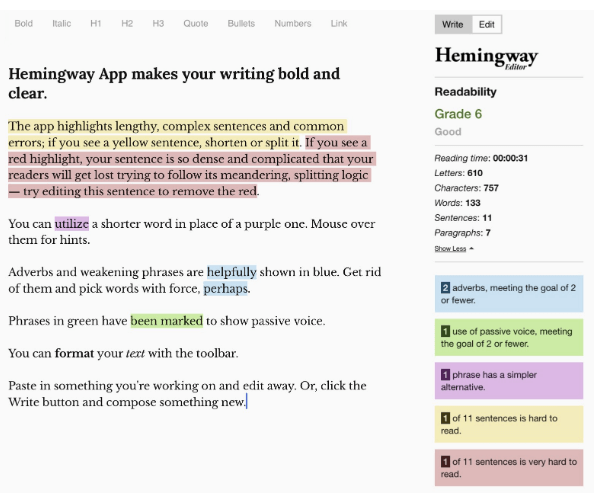
Besides correcting common errors like grammar or spelling errors, it will enhance your writing and your style . You can also identify any type of problem by using different colors to highlight them.
A double-checked text is a reflection of your professionalism. People will gain confidence in the validity of your content after you do everything to earn it.
Also, an additional plus is if you let a third party read your text. And, if you check its quality from someone else’s perspective before you put it online.
That way, you will cover this no less important segment of content writing, too.
6. Practice writing as much as possible until you reach perfection
Practice makes perfect, and it’s completely true.
The more time you spend researching and writing, the better you will become at it. More than half of the processes will become familiar and like a routine to you.
Also, content writing is a job where you can always learn something new. So there is no shame in asking someone for advice or looking for tools that can make writing-part less complicated.
Be consistent with your writing. It will provide you with the necessary exercise and habit that you can only gain through experience.
Although we are not sure whether “perfect” writing actually exists, you can get close to it. You just need to believe in yourself and work on it.
The Bottom Line
When it comes to content writing for beginners, there are several segments that every writer must cover. That is if he wants to progress and get as many jobs as possible.
Doing keyword research , search engine optimization, organizing your content, and creating an interesting headline to grab your visitors’ attention are just some of the practical ideas you should adopt before starting a piece of writing.
When talking about attracting the attention of visitors, we must mention the tools that deal with the creation of pop-ups such as Poptin pop ups . These engaging, high-converting windows are a perfect choice for anyone who wants to develop an effective digital marketing strategy.
Follow these 6 tips on content writing for beginners and begin your journey fully geared!
Aazar Ali Shad
Related posts.

Exit Intent Popups: Capturing Last-Minute Sales with Offers This 4th of July

7 BDOW Alternatives to Increase Website Conversions in 2024

Boost Your Holiday Sales with Eid Al-Adha Popup Campaigns

- Privacy Overview
- Strictly Necessary Cookies
This website uses cookies so that we can provide you with the best user experience possible. Cookie information is stored in your browser and performs functions such as recognising you when you return to our website and helping our team to understand which sections of the website you find most interesting and useful.
Strictly Necessary Cookie should be enabled at all times so that we can save your preferences for cookie settings.
If you disable this cookie, we will not be able to save your preferences. This means that every time you visit this website you will need to enable or disable cookies again.
revvgrowth.com
Content Marketing / Web content writing
Mastering Web Content Writing: A Comprehensive Guide For Beginners In 2024
- Mohammed Tahir
- December 18, 2023
- 6 mins Read
Table of Contents
Introduction.
Welcome to “Mastering Web Content Writing: A Comprehensive Guide for Beginners in 2024.” In today’s digital landscape, the art of crafting compelling online content is paramount.
This guide serves as your compass into the dynamic world of web writing, designed specifically for beginners aiming to hone their skills and make a mark in the digital sphere.
Within these pages, you’ll discover the fundamental principles of effective web content creation. From understanding your audience and defining your brand’s voice to mastering SEO strategies and optimizing for different platforms, this guide offers a roadmap to create content that captivates and engages.
Explore the nuances of various content formats , from blog posts and social media content to web copy and email newsletters. Uncover the secrets of crafting attention-grabbing headlines, structuring content for readability, and incorporating visuals for maximum impact.
Moreover, this guide is more than a set of instructions—it’s an invitation to unleash your creativity and find your unique voice in the digital realm. With practical tips, real-world examples, and actionable insights, embark on this journey to become a proficient web content creator, equipped to thrive in the ever-evolving landscape of online communication.
Web Content Writing: Meaning
Web content writing encapsulates the art of crafting textual material specifically tailored for online consumption. It transcends mere information delivery by weaving together engaging narratives, data, and insights strategically structured for digital platforms. This form of writing is dynamic, adaptable, and focused on captivating diverse audiences while aligning with the objectives of a brand or a website.
It encompasses a broad spectrum of formats, from blog posts and articles to social media updates, product descriptions, email newsletters, and website copy. Each format demands a nuanced approach, considering factors like tone, style, and optimization techniques for search engines and user experience.
Effective web content writing necessitates a deep understanding of the target audience, their preferences, and the platform’s dynamics. It involves the seamless integration of keywords for search engine visibility without compromising the quality and relevance of the content.
Furthermore, in an era where digital presence reigns supreme, web content writing acts as a gateway to connect, inform, entertain, and persuade online audiences. Its significance lies not only in conveying information but also in fostering connections and driving desired actions, making it an indispensable tool for businesses and individuals navigating the digital landscape.
What Skills Are Required For A Website Content Writer?
Becoming a proficient website content writer demands a versatile skill set tailored for the digital realm. Beyond linguistic prowess, a content writer must possess a keen understanding of SEO principles, enabling them to integrate keywords seamlessly while maintaining readability and relevance.
Mastery of these principles ensures content resonates with both audiences and search engines, maximizing visibility and engagement.
Moreover, an adept content writer should possess adaptability and the ability to tailor their style and tone to suit diverse platforms and target demographics . Crafting compelling narratives for blog posts, social media content, or website copy requires versatility in storytelling and an innate grasp of the platform’s nuances.
Exceptional research skills are indispensable. Content writers often delve into varied topics, necessitating the ability to gather, synthesize, and present information cohesively and accurately.
Coupled with a knack for understanding audience behavior, these skills empower writers to create content that informs, entertains, and persuades effectively.
Additionally, a keen eye for detail and proficiency in grammar and style conventions are crucial for maintaining professionalism and credibility in digital spaces.
Lastly, embracing continuous learning to stay abreast of evolving trends and technologies is fundamental for a website content writer aiming for sustained success in this ever-evolving landscape.
Checkout These 3 Free Web Content Writing Courses For Beginners
For beginners venturing into web content writing, several free courses offer valuable insights and foundational knowledge. “Content Strategy for Professionals” on Coursera, created by Northwestern University, immerses learners in content strategy essentials, emphasizing audience analysis, content creation, and distribution strategies.
Another standout course is “Writing for the Web” by Open2Study, focusing on web-specific writing techniques, including structuring content for online readership and optimizing for search engines. This course equips beginners with practical skills crucial for effective online communication.
Additionally, “SEO Training Course” on Moz Academy provides a comprehensive understanding of SEO fundamentals, vital for any aspiring web content writer. It covers keyword research, on-page optimization , and link building strategies, empowering beginners to create content that ranks well and resonates with target audiences.
These courses offer diverse perspectives, from content creation to optimization, ensuring a holistic understanding of web content writing essentials. Through interactive modules, expert-led sessions, and practical assignments, beginners can grasp the nuances of crafting compelling online content while honing their skills in a guided, accessible manner.
Embracing these courses paves the way for a solid foundation and a confident leap into the dynamic realm of web content writing.
5 Website Content Writing Formats That Work In 2024
In 2024, the digital landscape continues to evolve, and content formats that resonate and engage audiences are pivotal for online success. “Interactive Content” emerges as a frontrunner , incorporating quizzes, polls, and interactive visuals to enhance user engagement and encourage participation, fostering a two-way conversation between brands and audiences.
Moreover, “Long-Form Evergreen Content” remains a stalwart format , offering in-depth, timeless information that addresses complex topics comprehensively. These pieces establish authority, boost SEO, and continue to attract organic traffic over time.
“Visual Storytelling” takes center stage, leveraging the power of videos, infographics , and dynamic visuals to convey narratives effectively. With attention spans dwindling, visual content captivates and communicates efficiently, making it a must-have format for engaging modern audiences.
Additionally, “User-Generated Content (UGC)” gains prominence, harnessing the voice of the community to create authentic, relatable content. Testimonials , reviews, and social media contributions serve as powerful tools, fostering trust and connection with audiences.
Lastly, “Adaptive Content” emerges as a trend, tailoring content dynamically based on user behavior, preferences, and device. Personalization and customization are key, ensuring a seamless and tailored experience across various platforms and devices, optimizing engagement and conversions in the dynamic digital landscape of 2024.
How To Approach The Web Content Writing Process
Approaching web content writing demands a strategic and systematic process. Begin by understanding the audience—their needs, preferences, and pain points. Conduct thorough research to grasp their language, interests, and the platforms they frequent. This knowledge forms the backbone of content creation, ensuring relevance and resonance.
Next, define clear objectives and a content strategy aligned with your brand’s voice and goals. Establish a content calendar outlining topics, formats, and publication timelines . This roadmap streamlines the writing process and maintains consistency.
Drafting begins with compelling headlines and a captivating introduction. Structure content logically, employing headers, bullet points, and visuals to enhance readability. Embrace SEO techniques judiciously, integrating relevant keywords naturally to optimize visibility without compromising quality.
Revision holds immense significance. Review content for coherence, accuracy, and tone consistency. Polish language, ensuring clarity and conciseness. Solicit feedback, embracing constructive criticism to refine and enhance the content.
Lastly, post-production involves formatting, incorporating visuals, and ensuring technical optimization. Prioritize mobile responsiveness and fast loading speeds for a seamless user experience.
Approaching web content writing as a cyclical process, from research and planning to creation, refinement, and publication, ensures the delivery of impactful, relevant, and engaging content tailored for digital audiences.
7 Web Content Writing Strategies To Try In 2024
In the ever-evolving landscape of web content writing, several innovative strategies emerge as game-changers in 2024. “Voice Search Optimization” takes precedence, requiring content to be crafted in a conversational tone to align with how users interact with voice-enabled devices, optimizing for long-tail, natural language queries.
“AI-Generated Content” integration marks a significant shift, leveraging AI tools to assist in content ideation, data analysis, and even generating initial drafts. This collaboration between human creativity and AI efficiency enhances productivity and creativity. Try using this tool to humanize AI text
Furthermore, “Accessible Content” gains prominence, emphasizing inclusivity by ensuring content is easily accessible to all users, including those with disabilities. Prioritizing features like alt text, transcripts, and screen-reader compatibility becomes integral for a wider reach.
“Immersive Experiences” utilizing technologies like augmented reality (AR ) or virtual reality (VR ) create engaging, interactive content. Brands employ these immersive formats for storytelling, product demonstrations, or virtual tours, providing users with memorable experiences.
“Personalization at Scale” emerges, leveraging data-driven insights to customize content for individual users. Dynamic content tailored to user behavior and preferences enhances engagement and fosters stronger connections.
Additionally, “Sustainability-Centric Content” gains traction, reflecting growing societal concerns. Content promoting eco-friendly practices or highlighting a brand’s sustainability efforts resonates strongly with environmentally conscious audiences.
Lastly, “Community-Centric Content” focuses on fostering communities through user-generated content, forums, or social media engagement, creating spaces for meaningful interactions and brand advocacy. Embracing these innovative strategies in 2024 elevates web content, enabling brands to captivate audiences in new and impactful ways.
How To Create A Website Content Writing Template?
Crafting a website content writing template streamlines the creation process, ensuring consistency and efficiency. Begin by outlining the template structure, including sections like headline, introduction, main content, conclusion, and call-to-action . Define the tone, style, and formatting guidelines to maintain uniformity across all content.
Integrate SEO elements within the template, specifying keyword placement and density guidelines to optimize content for search engines while preserving readability and relevance. Incorporate space for meta descriptions, title tags, and other SEO essentials.
Include placeholders or prompts for visuals, such as images, videos, or infographics , to complement the text and enhance engagement. Ensure these placeholders align with the content flow and support the narrative.
Moreover, consider user experience elements within the template. Design sections for headers, subheadings, bullet points, and short paragraphs to improve readability and scannability. Prioritize mobile responsiveness, embedding responsive design elements into the template structure.
Encourage adaptability by leaving room for customization. Provide flexibility to accommodate various content formats or specific brand requirements while maintaining the core structure and guidelines.
Lastly, test and refine the template iteratively . Gather feedback from content creators and stakeholders, tweaking the template based on their insights to create a versatile, user-friendly, and effective framework for consistent website content creation.
Exploring Website Content Writing Topics
Delving into website content writing topics requires a strategic approach to engage audiences effectively. Start by identifying trending industry subjects, leveraging tools like Google Trends , industry reports, and social media insights. This exploration provides a pulse on what resonates with the target audience.
Consider addressing FAQs and addressing common pain points within the niche. Crafting content that solves problems or offers valuable insights positions the website as a go-to resource, fostering trust and credibility.
Furthermore, embrace evergreen topics—timeless subjects that remain relevant over extended periods. These encompass foundational information, industry best practices, or comprehensive guides that continue to attract readers and maintain relevance.
Stay abreast of emerging technologies, trends, and cultural shifts, as they often spark engaging and shareable content ideas. Exploring diverse perspectives, niche-specific news, or thought-provoking opinion pieces adds depth and variety to the content repertoire.
Additionally, audience engagement, feedback, and data analytics serve as compasses for topic exploration. Analyze metrics to understand what resonates with the audience, and actively engage with comments, inquiries, and discussions to identify potential content gaps or new topics.
Ultimately, effective exploration of website content topics involves a blend of research, creativity, responsiveness to audience needs, and a keen eye on industry evolution, ensuring a steady stream of captivating and relevant content.
10 Web Content Writing Examples To Get Inspiration From
Drawing inspiration from diverse web content writing examples showcases the versatility and creativity prevalent in digital communication.
- “The Skimm ,” a daily newsletter, excels in conversational tone, delivering news with a witty and relatable voice, engaging a wide audience.
- “ Airbnb’s Neighborhood Guides” presents immersive content, combining storytelling and visuals to provide insights into travel destinations, inspiring and informing potential travelers.
- “ HubSpot’s Blog” stands out for its comprehensive and actionable marketing content, offering in-depth guides, trends, and practical advice, catering to marketers and businesses.
- “ TED Talks ” website masters impactful storytelling through video content, encapsulating diverse topics and captivating audiences worldwide.
- “Grammarly’s Tone Detector” showcases innovative content by offering a tool that analyzes writing tones, educating users and demonstrating the brand’s expertise in language nuances.
- “ Neil Patel’s Blog ” excels in SEO-driven content, providing detailed, data-driven insights that appeal to marketers and entrepreneurs seeking digital marketing strategies.
- “ BuzzFeed’s Listicles ” demonstrate the power of concise, visually appealing content, leveraging engaging headlines and multimedia elements for entertainment and information.
- “ Red Bull’s Content Hub ” exemplifies brand storytelling, creating adrenaline-pumping content around extreme sports and adventure, resonating with its target audience.
- “ The Atlantic’s Long-Form Journalism ” sets a benchmark for in-depth storytelling, weaving narratives that delve deep into various subjects, engaging readers with comprehensive exploration.
- “ National Geographic’s Photography Stories ” leverage stunning visuals and compelling narratives, offering immersive experiences that transport audiences worldwide, showcasing the power of visual storytelling.
Exploring these diverse web content writing examples illuminates the multifaceted nature of digital communication. From conversational newsletters like “The Skimm” to immersive travel guides by Airbnb, each example reflects the potency of tailored storytelling in engaging audiences.
Notably, the dynamic approaches seen in TED Talks’ impactful video narratives and Grammarly’s innovative tone detection tool underscore the evolution of content mediums, emphasizing user engagement and interactivity. Furthermore, the depth and data-driven insights found in Neil Patel’s blog exemplify the fusion of expertise and SEO strategies, showcasing content as a tool for education and market relevance.
BuzzFeed’s listicles, Red Bull’s adrenaline-filled adventures, and National Geographic’s visual narratives highlight the varied styles and content formats that resonate with diverse audiences. These examples underscore that successful web content isn’t bound by a singular formula but thrives through adaptation, creativity, and audience connection.
Ultimately, these examples serve as guiding beacons, demonstrating that impactful content isn’t confined to a specific genre or style. Instead, it’s an amalgamation of storytelling, relevance, innovation, and engagement, embodying the essence of effective web content writing in captivating, informing, and inspiring audiences across the digital landscape.
Ready to Spark Your Marketing Genius?
Related blogs, top revenue optimization strategies for b2b saas success.

How to Generate B2B Leads on LinkedIn in 2024?
The best conversion rate optimization tools for your business.

Step-by-Step Guide on How to Increase Conversion Rate

An Inside Look into The Best SaaS Marketing Campaigns
Product-led growth vs sales-led growth: finding the right fit for your saas business.

- Order Content
- Write Content
Find out the latest developments here on our blog.
- How to Come Up With Content Ideas
posted by iWriter user iWriter Team
July 10, 2024

Are you feeling stuck in a content creation rut? Are you struggling to brainstorm fresh and engaging ideas for your blog, social media, or website?
Look no further! In this blog post, we will explore some creative strategies and tips on how to come up with content ideas that will captivate your audience and keep them coming back for more.
Get ready to ignite your creativity and take your content game to the next level!
Conduct Audience Research
Understanding your audience is crucial for any content writer aiming to produce relevant and compelling content. Start by researching your audience’s demographics, interests, and pain points.
Use tools like surveys, social media polls, and website analytics to gather this information. This data will help you create content that speaks directly to their needs and preferences.
Knowing what your audience cares about allows you to tailor your topics and writing style to better engage them. Additionally, pay attention to the comments and feedback on your existing content. These insights can offer valuable clues about what your audience wants to read.
Analyze Competitor Content
Analyzing competitor content is a smart way to generate fresh business content ideas . Start by identifying your main competitors in the industry.
Look at their blogs, social media posts, and website content to see what topics resonate with their audience. Note the type of content that gets the most engagement, such as shares, comments, and likes.
Pay close attention to their most popular posts and the keywords they use. This will give you valuable insights and inspiration for your own content. Don’t just copy what they are doing; think about how you can improve or add a unique twist.
Repurpose Existing Content
Repurposing existing content is a great way to maximize your efforts and reach a wider audience. It allows you to take and present what you already have in new and exciting ways. For example, you can turn a popular blog post into a video or slideshow. This way, you can engage with people who prefer different media types.
Another idea is to update old content with new information or a fresh perspective. This keeps your content current and relevant. You can also compile several related posts into an eBook. This adds value to your readers and can serve as an excellent lead magnet.
Stay Updated with Industry Trends
Staying updated with industry trends is vital for creating relevant and timely content. Begin by following key influencers and experts in your field.
Read industry blogs and subscribe to newsletters to get the latest updates. Social media platforms are also excellent for real-time news and trends. Attend webinars, conferences, and workshops to gain insights from thought leaders.
Use tools like Google Trends and BuzzSumo to see current popular topics. Industry reports and whitepapers can provide in-depth analysis and projections.
Joining professional associations can offer networking opportunities and exclusive information. Keeping up with trends helps you stay ahead of the curve and ensures your content remains fresh and engaging.
Utilize Content Idea Generators
Tapping into content idea generators can be a game-changer for content creators. These tools help you quickly come up with fresh ideas with little effort.
Simply input a few keywords related to your industry, and the generator will list potential topics. This saves time and helps overcome writer’s block.
Many content idea generators are free and easy to use. They produce relevant and trending topics based on current data. You can customize the suggestions to fit your brand’s voice and style.
Use these tools to keep your content pipeline full. This technique ensures you always have interesting topics to write about.
Create a Content Calendar
Creating a content calendar helps organize your content creation process. It allows you to plan and schedule your posts in advance. This ensures a consistent flow of content, which keeps your audience engaged.
A content calendar can help you avoid last-minute rushes and stress. You can easily see what topics you have covered and what needs to be done next.
It also helps you balance different types of content. You can plan themes, seasons, or special events ahead of time. This makes your content more relevant and timely. A well-planned calendar can boost your productivity and improve your content strategy.
Engage with Your Audience
Engaging with your audience is key to building strong relationships. Start by responding to comments on your blog and social media posts.
Show appreciation for their feedback and questions. This makes your audience feel valued and heard. Ask for their opinions on your content topics. You can run polls or surveys to gather their input.
Hosting live sessions or Q&A events can also help in connecting with them. Sharing user-generated content is another way to involve your audience. Encourage them to share their stories or experiences related to your brand. This interaction builds a sense of community and loyalty.
Collaborate with Influencers and Experts
Collaborating with influencers and experts can greatly enhance your content strategy. These individuals have a significant following and can help extend your reach.
Working with influencers can introduce your brand to a wider audience. It also adds credibility to your content.
Experts can provide valuable insights and unique perspectives, making your content more informative and engaging. Start by identifying influencers and experts relevant to your industry.
Reach out to them with a clear proposal for collaboration. Make sure to offer value in return for their participation.
Explore User-Generated Content
User-generated content (UGC) is content created by your audience and fans. This can include reviews, testimonials, photos, videos, and social media posts.
UGC is powerful because it is authentic and trustworthy. People tend to trust content from fellow consumers more than from brands. Encouraging your audience to create content about your brand can boost engagement.
Ask them to share their stories, experiences, or creative takes on your products. Feature their content on your website and social media channels.
This provides you with fresh content and makes your audience feel valued. UGC can help build a strong community around your brand.
Know How to Come Up With Content Ideas for Your Brand
Knowing how to come up with content ideas for your brand is a journey that involves understanding your audience, staying informed, and being open to new ideas. Using the right strategies and tools lets you keep your content fresh and exciting.
Remember, consistent effort and a passion for continuous improvement are the keys to success. Keep experimenting and evolving, and your audience will stay engaged.
Schedule a call with us today to hire a content writer for your business needs.
Comments are closed.
Free Lessons
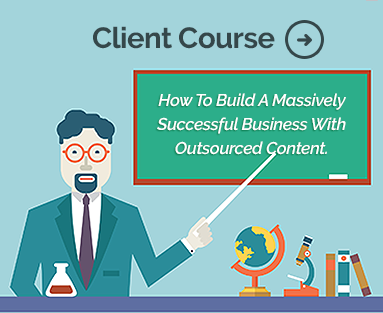
Popular Post
- Content Already Created? Hire a Virtual Assistant to Unlock Its Full Power
- Engaging Ideas for Content Creation: Your Next Video Project
- 5 Content Marketing Ideas for Your Business

- July 10, 2024
How to Start Writing a Story: A Beginner’s Guide

Julia McCoy
Creator and Co-founder

Learning how to start writing a story, whether you dream of being a novelist or simply want to entertain friends with anecdotes, can feel daunting.
One crucial thing to remember is you don’t have to start at the beginning. You can begin writing at any point that compels you. Some writers prefer to let the story unfold organically, writing whatever scene pops into their mind. Others prefer to outline plot points first.
There’s no “right” way to start writing a story.
This guide will discuss how to begin in a way that hooks your reader from the first sentence and leaves them wanting more.
We’ll cover techniques for developing your ideas, crafting an engaging opening, and building a world that captivates your readers.

Table Of Contents:
Seeking inspiration, hook the reader, spark curiosity, the element of surprise, the power of imagery, plotting your story, don’t aim for perfection, aim for intrigue, starting in medias res, character development, putting it all together: final tips, finding your story idea.
Before you even think about writing the first line, you need a story idea.
Finding inspiration is easier than you think. It can be found anywhere – from personal experiences and observations to news stories, historical events, or even writing prompts.
Actively seeking inspiration can unlock creative writing ideas.
Thinkwritten, for example, offers 365 creative prompts . Work your way through them and see what sparks your imagination.
Pick up a newspaper or magazine and see if any interesting reports grab your attention. Maybe an intriguing crime sparks an idea for a mystery, or a human-interest piece inspires a heart-warming drama.
Browse visually-driven platforms like Pinterest and Instagram for striking photographs that could become the catalyst for your next masterpiece.
Consider joining a writing group for feedback and to workshop your story ideas.

Essential Components of a Story
The real trick to writing a good story is knowing which ingredients to include. While a simple recipe for success doesn’t exist, you can employ a few helpful strategies to write a captivating opening.
In an age of short attention spans, it’s more important than ever to hook the reader from the first line.
Make them laugh, make them gasp, make them wonder — just make sure you make them want to continue reading.
Your opening sentence sets the stage. Don’t be afraid to surprise your reader by starting with the unexpected.
For example, take a look at how these authors hooked their readers:
| Author/Title | Opening Sentence/Excerpt | Why it Works |
|---|---|---|
| Mostly Monsterly by Tammi Sauer | Bernadette was a good monster. | The use of a name immediately introduces us to a character (in this case, Bernadette). The fact that Bernadette is a monster piques our interest – what kind of monster is Bernadette, and in what ways is she “good?” |
| Bubble Troubleby Margaret Mahy | It was one of those days. | While this sentence initially seems quite simple, it implies that the reader understands exactly what kind of day the narrator is having. This shared understanding draws the reader in, instantly creating a feeling of camaraderie and familiarity. |
| Magic Box by Katie Cleminson | I found a magic box. | Instantly, the reader wonders, “What’s in the box?” It’s a classic storytelling technique that piques curiosity from the very start. |
Many editors recommend sparking curiosity in the reader. This can be done by asking (or subtly implying) questions that keep them hooked.
Try prompting your readers to ask questions like:
- Where are we?
- Why are these characters here?
- What is going to happen next?
- Who is involved?
Sometimes starting a story in an unpredictable way can captivate readers. If the reader expects you to zig but you zag, you’ve grabbed their attention.
Literary editor Gareth Watkins often encourages writers to embrace the unusual.
Think of the opening to ‘Nineteen Eighty-Four’ , or Iain Banks’s ‘The Crow Road’ .
Of course, your opening doesn’t have to be as outrageous as these but always aim for the unusual.
Think about what readers might anticipate at the beginning of your book – then defy those expectations.
Harrison Demchick , an editor with Reedsy, believes strongly in starting with evocative imagery rather than an info dump. By using sensory details that paint a picture for the reader, you instantly draw them into the scene.
Smell, touch, taste, sound, and sight can be implemented effectively to write short stories or long ones.
Every writer approaches story ideas differently. Some writers meticulously plot every scene, crafting a detailed outline before they begin. Others are discovery writers, letting the story unfold organically as they write.
There is no right or wrong way, only what works best for you.
If you’re new to writing stories, consider starting with a loose plot outline. This doesn’t need to be overly complex. A simple framework can provide direction and help you stay on track.
Think of it as a roadmap with key milestones that move your story forward. As you become more comfortable with the process, you can experiment with different outlining techniques or embrace the freedom of discovery writing.
Whether you meticulously plot or let your creativity guide you, a compelling plot hinges on progress and fulfilling reader expectations. Early in your story, you make subtle promises to your reader, hinting at what’s to come. The events that unfold should build upon these promises, leading to a satisfying conclusion that delivers on the expectations you’ve set.
Consider these key elements as you plot your story:
- Premise: What is the central idea or conflict driving your story?
- Character Arc: How will your main character change or evolve throughout the story?
- Obstacles: What challenges will your characters face, both internal and external?
- Stakes: What is at risk for your characters? What motivates them to overcome these obstacles?
- Resolution: How will the central conflict be resolved? Will your characters achieve their goals, or will they face unforeseen consequences?
Plotting your story effectively ensures your narrative has a clear direction, engaging conflict, and ultimately, a satisfying resolution for the reader.
Writing Your Opening Line
Entrepreneurs, founders, business owners, marketers – you know the power of a good story. Your audience is savvy, your time is precious, and that opening line needs to hook them from the get-go.
The pressure of a perfect opening line can be paralyzing. Think of it as a doorway into your story’s world – it doesn’t need to reveal everything, it just needs to entice them to step inside.
Consider these approaches:
- Start with action: Plunge your reader directly into the heart of the story. Think “The rain hammered down” or “She sprinted through the market square.”
- Introduce a compelling character: “The old woman with emerald eyes always knew when a storm was coming.” Instantly, we want to know more about this woman and her gift.
- Pose a question: “Have you ever wondered what lies at the bottom of the whispering well?” Questions invite engagement and encourage the reader to embark on a journey for answers.
Remember, the power of your opening line lies in its ability to create intrigue and compel your audience to keep reading. Experiment, trust your voice, and most importantly, have fun with it!
The Latin term in medias res means “in the midst of things,” and it’s often used to describe stories that begin right in the middle of the action.
Starting a story in media res is an effective way to establish tension and stakes in the first page.
But remember, you still have to introduce your readers to the main characters and setting. Editor Jeanette Shaw cautions writers that “If you go this route, you must be sure your opening action is compelling enough that the reader is prepared to wait for character setup later.”
Take a look at this excellent example from “Lord of the Flies” , a classic example of how to start writing a story in medias res :
“The boy with fair hair lowered himself down the last few feet of rock and began to pick his way toward the lagoon. Though he had taken off his school sweater and trailed it now from one hand, his grey shirt stuck to him, and his hair was plastered to his forehead.”
Readers get an immediate feel for the setting – a lagoon on what we assume is a very hot day – and the physical description helps establish the boy as someone we can picture.
Still, we want to know more about this boy, and why he’s trailing his sweater.
Honing Your Craft
Once you’ve gotten into the habit of writing stories, it’s a good idea to learn a thing or two from others.
Evening classes and workshops offer a fantastic way to learn, socialize with other writers, and get feedback.
The Open University offers a great deal of flexibility for people seeking more structured learning. This is a great way to practice writing dialogue and other important elements of storytelling.
Think back on the last time you got invested in a great story. Chances are, you felt connected to the main characters. The good news is that there are a plethora of techniques writers use to craft three-dimensional characters.
You’re probably already familiar with the classic character dossier. A character dossier is a collection of details and insights that help flesh out your characters.
Some elements commonly found in a character dossier are physical attributes, backstories, wants and needs, fears and flaws, and relationships.
This kind of deep character work is what separates caricature from true character development.
Author Libbie Hawker wrote an insightful book about using characters to create compelling plots. Knowing how to create an interesting character is just as important as knowing how to start writing a story.
Starting a story is just the beginning of what’s sure to be an amazing journey.
Although figuring out how to start writing a story can sometimes feel more intimidating than putting pen to paper, remember these key things:
- Use trigger phrases and vivid language that resonates with readers. By making your story relatable, you create an instant connection.
- Include lots of visual elements. Readers want to feel like they’re stepping inside the story.
- Think carefully about introducing characters. Avoid crowding the reader with too many characters from the outset; stick with a select few whose presence will move the plot forward.
- Don’t be afraid to deviate from the norm. Rather than sticking to mundane activities in your first sentence, try something a little more unexpected.
- Most importantly: Don’t be afraid to experiment, play with different styles, and ultimately, find the approach that best serves your story.
Figuring out how to start writing a story might feel difficult, but always keep this in mind – it’s much easier to start writing when you remember to have fun with the process.
Try not to get bogged down by self-doubt or pressure, and always remember that writing should be enjoyable.
Write because you love to write – the rest will follow.

Become a Content Hacker
Collaborate with other growth-minded, savvy Content Hackers – plus a host of experts. The price of two coffees/month gets you in.
- Cancel Anytime
- For the Price of 2 Coffees a Month
- 100% Risk Free
Where marketers and founders get the content strategy, skills, and systems to grow exponentially online.
Join thousands of Content Hackers learning smarter content and business strategies.
© 2024 Contenthacker.com
- A Quick Beginner’s Guide to FAQ Schema for Government or Health Sites
When people search for information, they want quick access to answers — whether on your website or in the search results.
In fact, 59% of people prefer self-service tools (like FAQs for simple questions/issues), and 31% say that not being able to get answers to simple questions from a website is frustrating.
Google knows people want fast answers to their queries, too. Enter FAQ schema.
If you have a well-known, authoritative government or health website:
- Having FAQs on your website/web pages is a great self-serve customer tool that people want.
- Marking up the FAQs on the page with schema is an excellent way to enhance your search listing to offer quick answers in a way that people want, and potentially get more clicks to your site (more on how later).
In this article, I’ll go into more detail on FAQ schema and how to implement it, including:
- FAQ schema: A quick primer
- Writing helpful FAQ content
FAQ: How can I use FAQ schema to improve search result listings for my government or health website?
(If you’re new to structured data, you may first want to check out What Is Structured Data and Why Is It Important for SEO? )
FAQ Schema: Quick Primer
Here are some fast facts about FAQ schema to get you up to speed …
What: You can use FAQ schema on virtually any webpage that has FAQs on it.
For a webpage to be eligible for FAQ-rich results, Google’s guidelines are as follows:
- Only use FAQPage schema if the webpage has FAQs where there’s a single answer to each question. (For example, if the page has a single question and users can submit answers, use QAPage instead).
- Don’t use FAQPage schema for advertising purposes. For example, refrain from inserting promotional content, sales pitches or non-informational content into what should be straightforward answers within an FAQ section.
- Make sure each question for the page includes the entire text of the question, and each answer includes the entire text of the answer. The entire question text and answer text may be displayed.
- Question and answer content may not be displayed if it’s obscene, profane, sexually explicit, graphically violent, or promotes dangerous or illegal activities or hateful or harassing language.
- All FAQ content must be visible to the user on the source page as well.
- To be eligible, you must also follow Google’s general structured data guidelines and its documentation on search essentials .
Why : FAQ schema markup can potentially enhance your listing the search results, for example with a featured snippet.
This increases the amount of real estate any given webpage can take up on the search results, so this is usually a win.
With “zero-click” being a thing, though, using FAQ schema can go one of two ways:
- Increase the likelihood that people will get their answer from the results and not click through. Some data suggests that nearly 65% of Google searches end without a click to a website (these are known as “zero-click” searches).
- Increase the likelihood that people will click on your site by providing more information on the topic.
Also, properly marked-up pages can be eligible for an Action on the Google Assistant (for more on why this is beneficial, see our primer on voice search ).
How: You can mark up the webpage using the structured data found at Schema.org on FAQPage .
Some tools can help you do this easier, such as:
- This FAQPage JSON-LD schema generator or this schema markup generator.
- Built-in functionality from SEO tool providers like this one .
- WordPress plugins for FAQ schema (please note that this is just a list and we do not recommend any specific one).
- ChatGPT : Sign into the AI tool (ChatGPT4), paste the FAQs in and ask the tool to “generate FAQ schema for the above frequently asked questions.”
Please note that some plugins may slow down a webpage’s performance, so keep that in mind as you weigh your options.
Bonus: You can implement URLs within the answers on your FAQs that drive people to additional helpful content on your website.
These links can show up in the search results within the FAQ-rich result.
That way, even if a person gets the answer to their original query from the FAQ rich result you enabled, they may want to click through to another helpful page provided as a link within the rich result.
Add the UTM tracking code to the JSON-LD markup only for the links in the FAQs (but not to the internal HTML text on the webpage itself).
Validate your markup using Google’s tools for structured data. Also, check Google’s troubleshooting tips .
Then monitor performance.
Use Search Console to check the rich results report. Don’t forget to check Google Analytics to track organic traffic coming to those FAQ-rich results if you implemented UTM tracking on any links within the answers.
For more, check out our article on six structured data tools to try.
Writing Helpful FAQ Content
Let’s take a step back: Creating helpful FAQ content on your site is one of the first steps in a good FAQ process.
Here are five tips:
- Identify all relevant questions. Map out people’s most common questions about your product, service or industry. These questions should reflect real queries and the answers should address pain points effectively. Get in touch with other customer-facing teams at the company to get more ideas.
- Take cues from the search results. See the “people also ask” and “related questions” sections of Google’s search results for target keywords. You can also use a handy tool like Answer the Public . Include those questions and answers in the FAQ section of the webpage.
- Provide clear and concise answers. Provide concise answers to each question, using clear and straightforward language. Avoid excessive technical jargon or complex explanations that may confuse users.
- Structured FAQs well. Logically structure the FAQ content, using headings tags (like H2s) to organize the questions. This enhances readability and makes it easier for search engines to parse your content.
- Ensure information is up to date. Make sure FAQs are accurate and up to date. Regularly review and update your FAQ content to reflect any changes in your offerings or industry.
Now you are done. Utilize these tips to successfully use FAQ schema and provide users with what they seek in search results.
Want hands-on assistance with FAQ schema implementation for your government or health website? Our experts are standing by!
Schedule a free SEO consultation
If you want to strengthen your search result listings for your government or health website, the first step is to get a handle on FAQ schema implementation. In short, FAQ schema is a structured data type that helps search engines better understand the content of your page.
You can use FAQ (Frequently Asked Questions) schema to give short, direct answers to routine questions. It’s a visibility-boosting tactic that can greatly amplify traffic from organic sources.
After adding FAQ schema to pertinent website pages, the big search engines like Google and Bing may show your questions and answers on their search result pages. Your schema accomplishes the search engines’ goal of delivering fast answers to searchers’ queries, enriching the user experience.
And that’s not all – this search engine exposure helps to cement your brand as a trusted, reputable resource. Plus, since users will be able to find the information they need quickly, they are much more likely to engage with your content and ultimately convert.
Not just any FAQ schema will get you the results you’re looking for. You need FAQ schema specifically targeted to your government or health website. First, find some questions that your audience regularly asks. Then, deliver targeted, helpful answers to those queries.
Make sure that the questions fulfill these two requirements: (1) targeted enough to quell users’ curiosity, and (2) general enough to address several topics. Doing so will ensure that your content is beneficial and relevant to your users.
Click-through-rate (CTR) improvements are a monumental advantage of using FAQ schema. After proving to users that your website is a go-to resource for direct information, they are less likely to go to other websites. They’ll visit yours.
In addition to that, rich results distinguish your site from others, and that means more clicks and attention. This is critical for companies operating in the government or healthcare field, where credibility and accuracy are key.
FAQ schema can also result in a lower bounce rate. When you provide answers to routine questions right in the SERPs, you inadvertently pre-qualify interested users and screen out others. So, users that click on your site URL in the search results are likely interested in the in-depth insights from your site. As a result, they’re less likely to click off of your site (bounce) right away. This means more engagement and better website performance.
Like SEO in general, FAQ schema isn’t a set-it-and-forget-it type of thing. Over time, you should be updating your FAQ content to mirror the latest topic-specific information and industry developments. Freshening it up here and there helps your site retain its trustworthiness and ensures that internet searchers and website visitors are getting top-quality, accurate information.
When it comes to FAQ schema implementation, you need to be strategic. To find the best possible questions to address, you’ll need to evaluate your visitors’ and searchers’ behavior. Your website’s performance metrics can also be helpful in this regard. Data gleaned from your site metrics can be used to optimize your FAQ.
Don’t make the mistake of neglecting user experience. Take the time to ensure that your FAQs are easy to comprehend and skim. They should use descriptive headings and provide succinct answers without rambling. That way, your readers won’t struggle to find the info they’re looking for.
Step-by-Step Procedure
- Do some research into common questions. You’re looking for the most frequently asked questions specific to your niche, whether it be government or health.
- Write up your answers. To be well-received, these answers should be digestible, factual and concise.
- Generate your schema markup. For the best results, use JSON-LD format for your markup code.
- Validate your markup for good measure. The next step is to validate with Google’s Structured Data Testing Tool.
- Add your schema to pertinent pages. Insert your schema markup into your FAQ pages’ HTML code.
- Find out how your pages are performing. Gauge how your pages are going with Google Search Console or similar tools.
- Keep your content updated. To reap all the benefits of FAQ schema, go back and update your content for relevance.
- Note how your users are behaving. Monitor metrics related to user engagement and behavior. Use any insights to rework your FAQ content here and there.
- Review your search engine rankings. Your ranking in search engines is a direct indicator of the impact of your FAQ schema.
- Solicit feedback from your readers. Your goal is to deliver helpful, useful content. Solicit your readers’ feedback and use it to make your FAQs even more beneficial for them.
- Get up to date on SEO trends. Read up on SEO best practices and inject them into your FAQs to increase effectiveness.
- Optimize your FAQ for mobile. All of your FAQ content should be mobile-friendly, enabling people to have a good user experience on all devices.
- Use FAQ Structured Data Testing Tools. Test your FAQ schema on a consistent basis with structured data testing tools.
- Do some rich results testing. To get a preview of what your FAQs will look like on search engine websites, use the Rich Results Test on Google Search Console.
- Check your bounce rate. A high bounce rate is a sign that you may need to consider improvements to your FAQ schema.
- Be ready to adjust. Look at your website data and adjust your FAQs as needed.
- Take a proactive approach to compliance. As a health or government business, compliance is so important. Make sure your content conforms to legal regulations.
- Incorporate FAQ Schema into your CMS platform (optional). If you have a CMS as part of your workflow, integrate your FAQ schema into it for ease of management.
- Ensure accessibility. Broaden your reach and foster inclusion by making your FAQs accessible to everyone – people with disabilities included.
- Audit regularly. Draft and stick to an FAQ auditing and testing schedule to catch issues that could hinder success.
- Boost your loading speed. Slow loading FAQ pages can hurt your pages’ overall appeal, reducing user experience and negatively affecting your rankings. Seek out ways to increase your pages’ loading speed to avoid these issues.
Taking a calculated approach to FAQ schema can dramatically boost your search engine result listings, increasing traffic and engagement for your government and health website. By sticking to the roadmap outlined above and continually evaluating, tweaking and optimizing based on available data and feedback, you can achieve considerable success.
Bruce Clay is founder and president of Bruce Clay Inc., a global digital marketing firm providing search engine optimization, pay-per-click, social media marketing, SEO-friendly web architecture, and SEO tools and education. Connect with him on LinkedIn or through the BruceClay.com website.
See Bruce's author page for links to connect on social media.
LEAVE A REPLY Cancel reply
Your email address will not be published. Required fields are marked *
Contact Us Now.
Bruce Clay needs the contact information you provide to us to contact you about our products and services. You may unsubscribe from these communications at any time. For information on how to unsubscribe, as well as our privacy practices and commitment to protecting your privacy, please review our Privacy Policy.
RECENT SEO ARTICLES
- How SEOs Use AI: Boosting Efficiency and Productivity in 2024
- DIY SEO: 9 Doable Steps for Beginners
- 3 Ways To Use SEO for Brand Awareness
- 10 Game-Changing Benefits of Working With an SEO Agency
Serving North America based in the Los Angeles Metropolitan Area Bruce Clay, Inc. | PO Box 1338 | Moorpark CA, 93020 Voice: 1-805-517-1900 | Toll Free: 1-866-517-1900 | Fax: 1-805-517-1919
Request a Quote!

IMAGES
VIDEO
COMMENTS
Writing blog content for the first time can be intimidating, especially since it's available worldwide. That's why we put together this beginner's guide.
Content writing is an excellent career opportunity with plenty of opportunities to be creative, work with new people, and earn a good salary.
Content writing is a great skill and side hustle! Learn all about content writing for beginners and how to get started today!
Are you ready to make content writing your full-time job? To become a professional writer? If so, there are a few steps that will help you succeed. Whether it's your first time writing content or you want to take your skills to the next level. This article is an insider guide on how to start content writing and become a successful content writer. Contents show
Discover 10 essential content writing tips for beginners to enhance your writing skills and create compelling content.
Unlock the secrets of how to learn content writing for beginners with our comprehensive guide. Learn essential techniques to craft compelling written material.
Read on for a brief introduction and 20 tips to help you master the art of effective content writing. You'll learn how to create high-quality content consistently for your content marketing strategy.
Learn the best tips and tricks for content writing in our ultimate guide for beginners! Start crafting engaging content today. Click to read now.
These content writing tips for beginners will help you start producing better content faster! It's all about researching, planning, scheduling, and publishing different forms of content online.
Discover essential tips for beginners to start content writing. Learn content writing meaning, strategies, tools, and techniques. Start your writing journey today—click to begin!
No matter if you're a beginner or pro, these web content writing tips will help you improve your skills for creating engaging web content.
Content writing for beginners to enhance your marketing. Eight tips to build a company's authority, develop its brand, and drive organic traffic to its website.
Learn to create engaging content, find your niche, and boost website traffic. Step-by-step tips are included!
Read this guide on 'content writing for beginners'. You'll also learn content writer resume tips, and how to find content writing jobs near you.
Elevate your content writing abilities and engage online readers with this helpful beginner's guide to crafting quality content.
Looking for some content writing tips for beginners? If you use these tips, I promise you'll never worry about clients or money again.
Creating content that converts can be a challenge. However, the ten content writing techniques outlined in this post will help you improve your process.
Here are the best 15 content writing tips for beginners. Check out these suggestions to curate excellent blogs on your own.
Learn what content writing is and why it's important to implement it into your business to help you generate new customers at scale.
How to become an awesome content writer (beginner's guide) Discover key insights on content writing in the digital age, balancing AI innovation and human touch. Essential guide for those aspiring to professional writing.
Check these 6 tips about content writing for beginners. Use them to become the content writer you always knew you could be.
Welcome to "Mastering Web Content Writing: A Comprehensive Guide for Beginners in 2024.". In today's digital landscape, the art of crafting compelling online content is paramount. This guide serves as your compass into the dynamic world of web writing, designed specifically for beginners aiming to hone their skills and make a mark in the ...
Are you feeling stuck coming up with ideas for your blog? Learn how to come up with content ideas that actually engage your audience by clicking here.
Want to know how to start writing a story? Get helpful tips on storytelling, from finding inspiration to writing a captivating hook.
Learn Prompting is the largest and most comprehensive course in prompt engineering available on the internet, with over 60 content modules, translated into 9 languages, and a thriving community.
Writing Helpful FAQ Content. Let's take a step back: Creating helpful FAQ content on your site is one of the first steps in a good FAQ process. ... A Quick Beginner's Guide to FAQ Schema for Government or Health Sites; How SEOs Use AI: Boosting Efficiency and Productivity in 2024; DIY SEO: 9 Doable Steps for Beginners ...